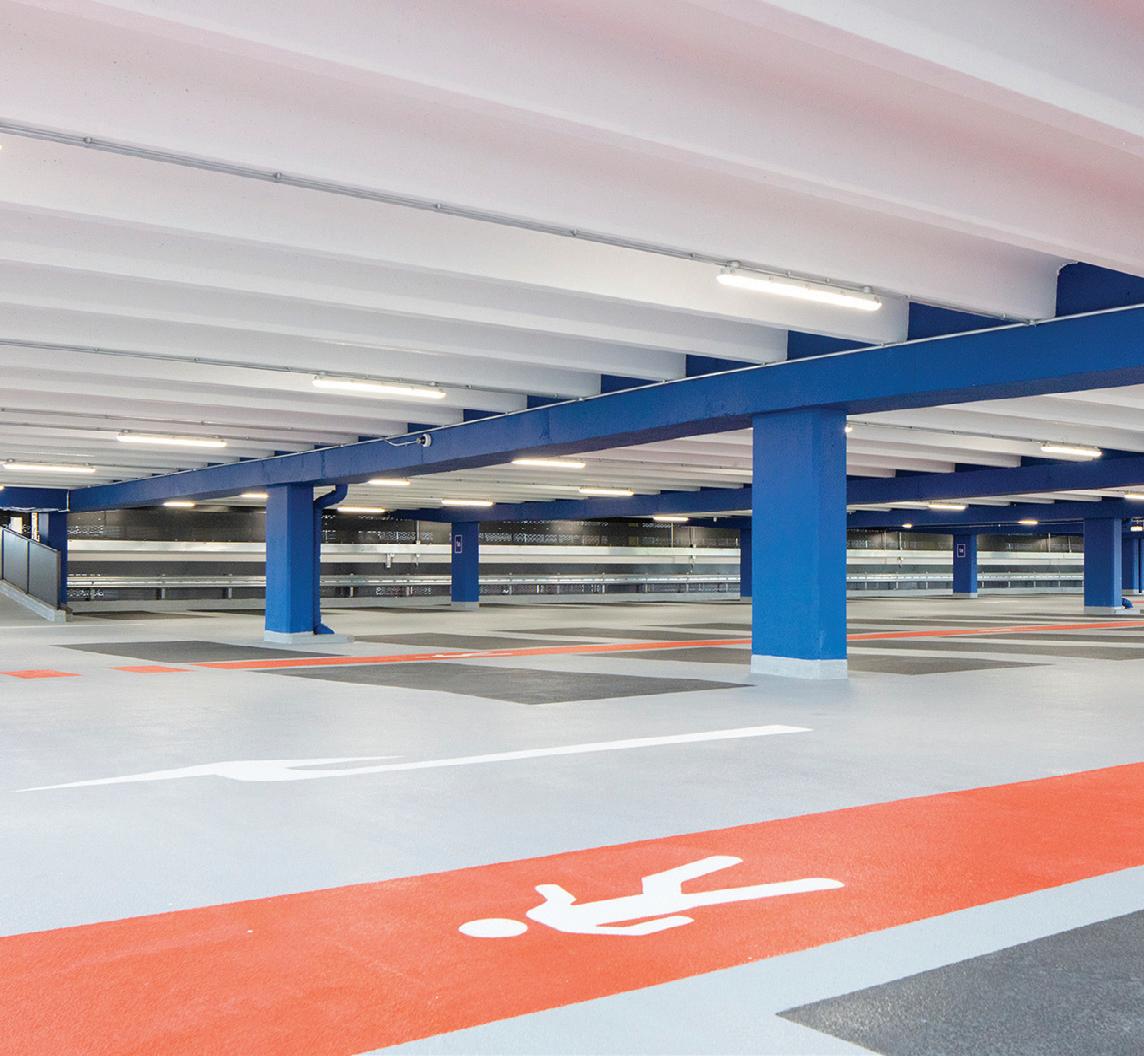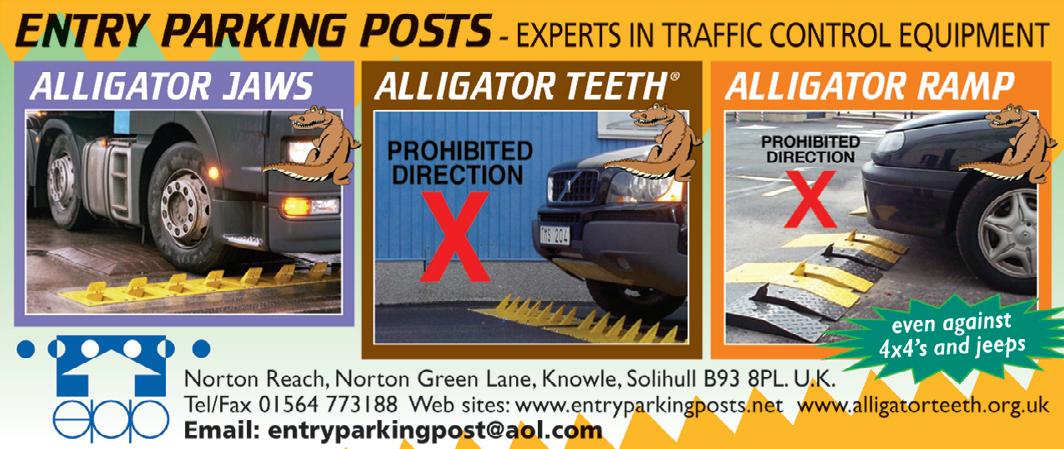




Demographics mean today’s tech-savvy youth will one day become tomorrow’s seniors






Demographics mean today’s tech-savvy youth will one day become tomorrow’s seniors


The smartphone is much more than a communications device. It is a connected device that we increasingly use to organise our lives. There are concerns that while the smartphone connects, it can also exclude those who do not have these devices from accessing mobile banking, shopping and socialising. The Digital Poverty Alliance, a group of charities formed to tackle this issue, estimates there are as many as 11 million people in the UK being disenfranchised in our increasingly smartphone dominated world. There is particular concern around how older people are affected, with Age UK estimating around 40% of the over-75s do not use the internet at all and are thus struggling to access services.
A recent article in The Guardian suggested that the digital divide is being felt most keenly in car parks. “As more and more car park owners – many at vital sites including hospitals – have replaced cash machines with signs demanding customers pay via their app, non-smartphone-using older people have seen their worlds shrink.”
The newspaper conceded that apps were convenient for many, but suggested they are a “nightmare” for people who just want pay by cash. The Guardian’s consumer correspondent Miles Brignall wrote: “On a practical level there is little drivers can do other than find cash-taking alternatives, or planning ahead and asking a friend or relative to pay the charge on their behalf. Or, if you can, use a car park with a number plate recognition system, which can be easier. Private parking sites may have the right to app-only charging in their terms and conditions but would this stand up to an Equality Act challenge from someone who is physically unable to use a smartphone? Probably not.”
However, maybe the critics of cashless overstate the problem. Research commissioned by payment provider RingGo suggests that senior citizens value technology such as smartphones – 86% of respondents believed smartphones make their lives significantly better.
So, what should parking operators do? Many will continue to provide coinaccepting terminals in car parks or offer cash payment routes via local retailers as a means maintaining access for people currently without digital devices. But time and demographics mean that today’s tech-savvy youth (or young at heart) will become tomorrow’s seniors. For this digital generation it is the act of paying for things with coins and cash that will feel unusual.
Mark Moran Editor

Cost of living crisis sinks Leicester City Council’s plans for workplace parking levy, reports Deniz Huseyin
Flowbird appoints a new chief executive, fresh faces at Unity5 and the BPA launches the Veterans In Parking network

Future-proofing is key to the Institution of Structural Engineers’ new look car park design guidance
Hospitals in Dorchester and Southampton have built car parks that seek to improve the local environment
Disabled Motoring UK’s Heidi Turner shares the results of the Baywatch survey and looks back a century of campaigning 31
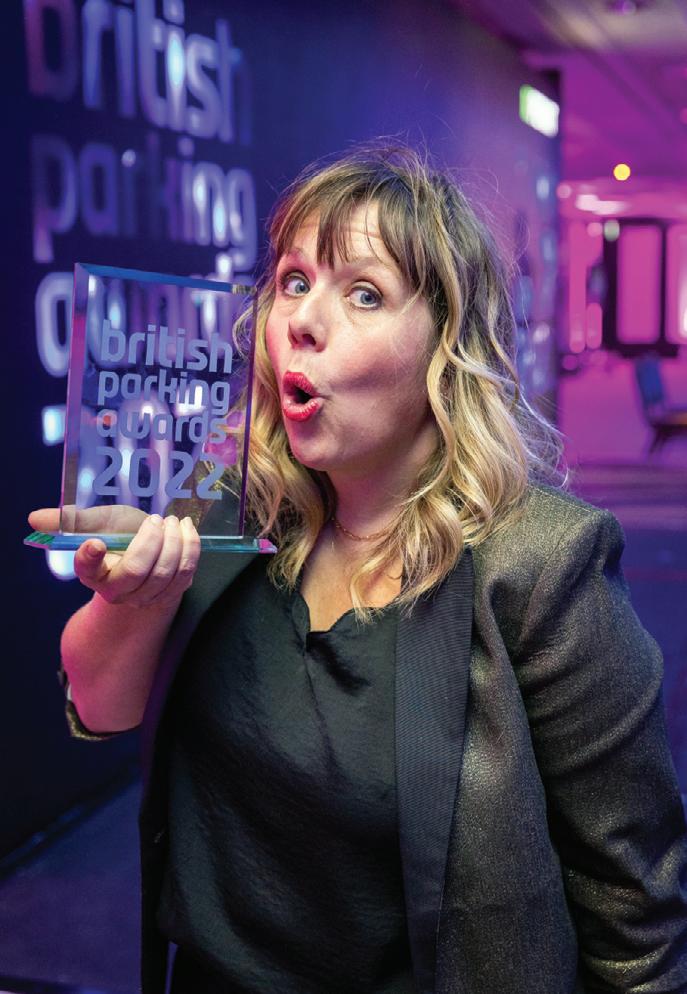
New design standards aim to make EV chargepoints accessible while commercial automated parking is now a reality 34

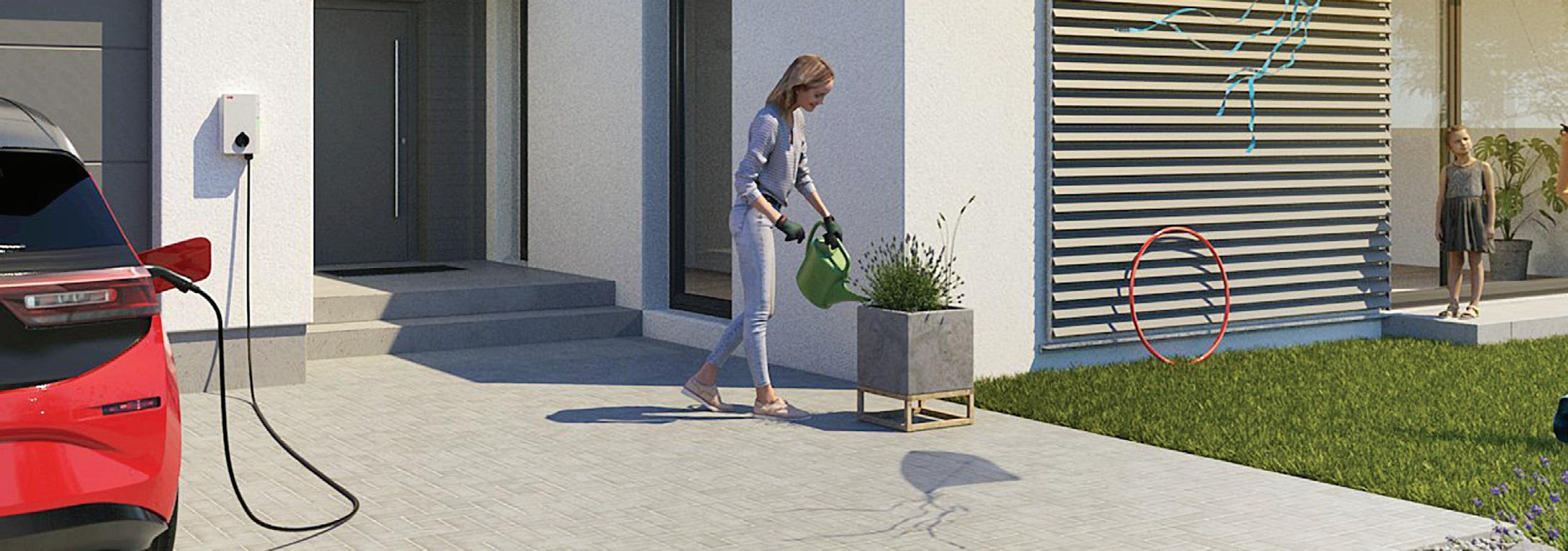
Environmentally aware kids are encouraging their parents to make the switch to greener electric vehicles 37
Editorial Managing editor: Mark Moran Tel: 020 7091 7871




UK pensioners say they are feeling more comfortable using smartphone apps to pay for services such as parking
Production and design production@landor.co.uk
mark.moran@landor.co.uk
Deputy editor: Deniz Huseyin Tel: 020 7091 7872
deniz.huseyin@landor.co.uk
Editorial director: Peter Stonham
Advertising, sponsorship, marketing and exhibition packages Jason Conboy Tel: 020 7091 7895 jason@landor.co.uk
Subscriptions Christina Pierre Tel: 020 7091 7959 subs@landor.co.uk Accounts Irina Cocks Tel: 020 7091 7854 irina.cocks@landor.co.uk Managing Director Rod Fletcher Tel: 0191 280 1410
ISSN:
Cost of living crisis sinks plans for workplace parking levy, reports Deniz Huseyin
Leicester City Council has scrapped plans to introduce a workplace parking levy (WPL) next year, citing the current political and economic situation. It appears that a council consultation, carried out in the spring, prompted a wave of opposition to the proposed scheme. The council wanted to emulate Nottingham’s WPL, which, since its launch 10 years ago, has paid for the extension of the city’s tram network, improvements to the bus network and a transformed rail station. Nottingham City Council states that the levy has also reduced congestion growth by 47%.
Deputy city mayor Cllr Adam Clarke said: “We made a commitment in 2019 to consult on a levy in Leicester, and at that time we could not foresee the political uncertainty and dire economic situation the country is facing today.
“We have concluded that we cannot implement a WPL during this ongoing national cost of living crisis, which is causing such uncertainty and concern for so many people and businesses in our city. The consequence of this of course is that we won’t have the funding needed to radically improve public transport for so many of our residents, which would in turn help to tackle the climate emergency. In truth, simply maintaining the current levels of service will be a huge challenge.”
Following his re-election in September 2019, Leicester’s mayor Sir Peter Soulsby spoke of his determination to introduce a WPL. The levy would pay for a “quality bus service”, in the city, he said. The council estimated that the WPL would have generated £450m over 10 years.
A 12-week consultation, carried out by the council at the start of this year, generated more than 4,000 responses.
Many respondents cited the ‘unfairness’ of the WPL and

described it as a stealth tax. Others questioned why the levy should be paid on top of Business Rates or general vehicle taxes.
Some respondents questioned why they had to pay the WPL when they would derive no benefit from the investment, because in their cases public transport was not suitable. Some of those that live outside of the city boundary argued they would not see a direct benefit and would still have to use their cars. Another concern raised was that the levy would displace commuter parking into residential areas, resulting in a need for more residential parking permits
Leicester city centre will become a ‘ghost town’, with businesses relocating outside the WPL charge area along with a reduction in footfall, respondents said. There would be recruitment and staff retention implications and impact on local employer competitiveness.
It was argued that cycling is not always a practical mode of travel for employment, safety issues deter people from cycling, and the distances to travel to work by cycle are too far.

The after-effects of the pandemic and current cost of living crisis are also adversely affecting business, and small businesses would be unduly affected by WPL, some respondents said.
Cllr Clarke said: “We would like to thank everyone who took part in the consultation. We also met with many local business, schools, NHS and trades union leaders, to listen to the views of those they employ or represent, and we are grateful for their input. I am particularly grateful for the input from transport and environmental campaigners and want to reassure them that we will continue to focus on cleaning the air and reducing Leicester’s carbon footprint.”
He pointed to the formation of the Leicester Buses Partnership
expansion of the city’s fleet of all-electric buses, with more than 100 new vehicles set to be on the roads in the next two years.
Leicester also boasts the UK’s first net zero carbon bus station at St Margaret’s; new bus priority corridors linking the city centre to local neighbourhoods; and the expansion of the city’s network of safe and attractive routes for pedestrians and people on bikes, he said.


Sir Peter Soulsby said: “We have made enormous improvements in Leicester in recent years thanks to successful bids for funding that we have had to compete for against other local authorities. However, our long-term aims require significant and reliable ongoing funding that is not currently available. We can only hope that before too long there will be a government in place that will have the vision to transform public transport in this country, and will provide the funds to do it.
“As it stands, severe government spending restrictions already in place mean we have a shortfall in our budget of many tens of millions, and it’s likely the chancellor will announce further cuts to public services in November. This means we will be taking difficult decisions on all council services including transport over the next few months.”
Soulsby had pinned his hopes on generating investment for transport through the WPL.
The draft Leicester Transport Plan (LTP), published in 2021, saw the levy as paying for more than 400 “high quality electric tram-like buses” by 2030, operating on 25 ‘Mainlines’ services across city neighbourhoods and five express ‘Greenlines’ commuter services. Revenue from the levy would enable new bus priority routes “delivering reliable services at a good frequency, integrated timetables and multi-operator digital ticketing across services and quality waiting facilities with real-time displays”.
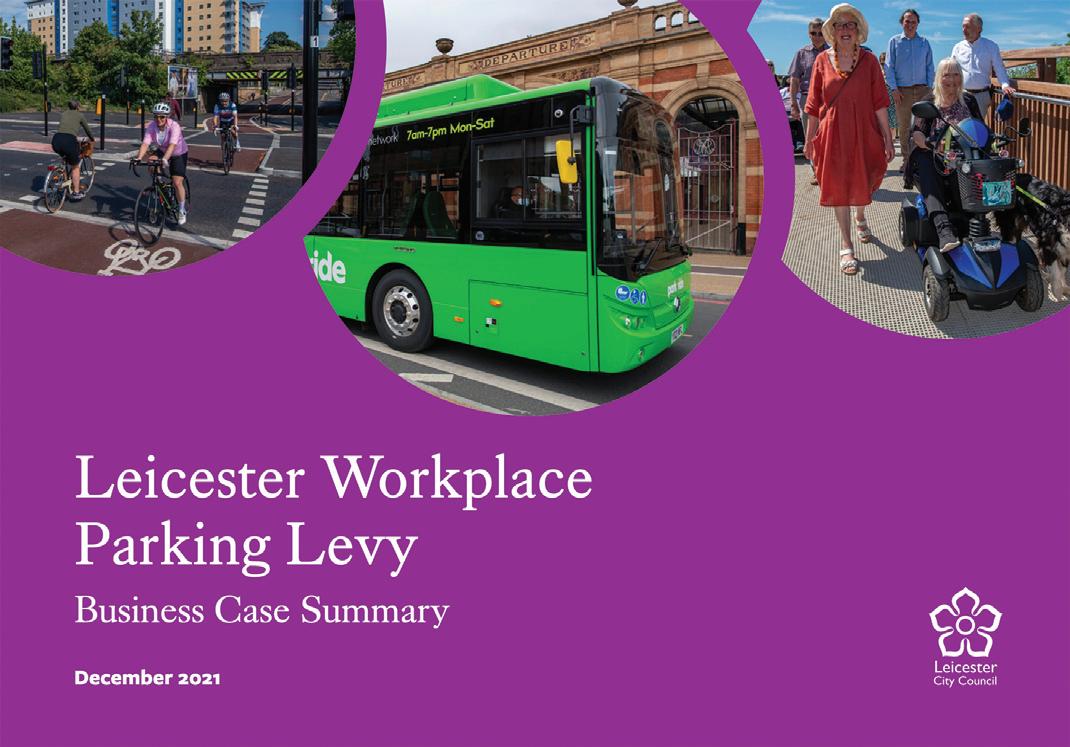
An LTP would have paid for “affordable bus fares with discounts for elderly, disabled, young and unemployed people and the ability for all travellers to get the ‘best fare’ on any journeys across the city”, stated the LTP.
The levy would also have funded a city-wide network of cycleways, connected healthy neighbourhoods, support for electric vehicles, better local buses with flexible on-demand services and ‘15 min neighbourhoods’ with quick and easy access to local facilities.
https://consultations.leicester.gov.uk/sec/wpl/results/wplreportfinal.pdf
Since its launch 10 years ago, Nottingham’s workplace parking levy (WPL) has raised almost £90m for sustainable transport, a new report reveals. Nottingham City Council said the levy also enabled it to secure “inward investment” of over £1bn in transport, including £570m for the tram network, £200m for electric buses and £60m to transform Nottingham Station into a 21st century multi-modal interchange.
“The WPL has inspired a step-change in action on climate change. It has motivated us all to be more environmentally conscious by looking at our travel needs and their impact on our fellow citizens,” states Cllr Audra Wynter in the report’s foreword.

“It’s exciting to see how our partners, businesses and citizens have adopted greener transport. The WPL tackles transport emissions head-on and will contribute to Nottingham achieving carbon neutrality by 2028.”
The report highlights the range of schemes that have been made possible by the levy.
Money raised from the WPL helped to fund the extension of the city’s tram network, which now carries more than 17 million passengers a year.
Thanks to the levy, Nottingham has the world’s largest fleet of biogas buses, with 120 double-decker buses, the council points out. The levy also enabled 18km of bus lanes which “make taking the bus a green and efficient travel option for both commuting and leisure”.
The city now has one of the largest fleets of electric buses in Europe with 38 electric buses, “saving real-time 1,050 tonnes of CO2”, the council said.
The levy has also paved the way for 300 miles of new or upgraded cycle paths along major roads and the tram network, said the council.
Nottingham Station has undergone a transformation, with the building of a new south concourse building, including lifts and escalators, and an intermodal transport link with the tram network. Alongside the levy, the council set up the Workplace Travel Service, which provides a free service to businesses in Nottingham. “Our expert team offer advice, support and grants to employers who need assistance with travel planning, car park management, sustainable transport options and improvements to encourage their employees to use public transport”, the council states in the report. Successful workshops, on-site events and partnerships have enabled 450 companies to benefit from the scheme, with grants of up to £25,000 available to expand facilities.
In ten years, £1m has been given out in grants, with businesses investing £209,000 of their own money. The funding has secured facilities such as cycle shelters, showers and drying facilities, electric vehicle charge points and improvements to security.”
A decade of inspiring growth in our city: Nottingham’s Workplace Parking Levy
10 Year Impact Report
We have concluded that we cannot implement a WPL during this ongoing national cost of living crisis
Cllr Adam Clarke
A trial is underway of road camera technology that identifies and tracks down drivers who break the law by revving engines and using modified exhausts.
The system will be tested in Bradford, South Gloucestershire, Great Yarmouth and Birmingham over a two months period.
The new ‘noise camera’ –which uses a video camera in conjunction with microphones to accurately pinpoint excessively noisy vehicles as they pass by –has received £300,000 funding from government.
The Department for Transport (DfT) launched a competition to identify areas to host the cameras in April and extensive testing at a private test track facility took place to refine the technology. If successful, the cameras could be rolled out nationwide, said the DfT.
Atkins-Jacobs Joint Venture (JV) is the technical consultant

for the trials, providing support on acoustics, design, modelling and asset management. The noise camera is designed and developed by MicrodB.
If drivers break the law by revving their engines unnecessarily or using illegal exhausts, they will be automatically detected, said the DfT. The camera takes a picture of the vehicle and records the noise level to create a digital package of evidence which can be used by local police to fine drivers.
The trials start with the camera in Keighley, Bradford and then move to the other three locations.
Atkins-Jacobs JV practice director Andrew Pearce said: “The real-world trials of the technology solution the Atkins-Jacobs JV has developed and tested on the track is an important step for the scheme towards solving a problem that affects many communities across the UK. We are fully expecting the trial in these four chosen locations to
New prime minister Rishi Sunak has appointed Mark Harper as transport secretary, replacing Anne-Marie Trevelyan who was in the post for just seven weeks.
On Twitter, Harper wrote: “Transport affects us all, and I can’t wait to tackle the challenges we face so we can deliver for communities across our United Kingdom.”
Harper, MP for the Forest of Dean since May 2005, has previously held the positions of chief whip from May 2015 until 14 July 2016, minister for disabled people from July 2014 until May 2015, minister for immigration from September 2012 until February 2014, and minister for political and constitutional reform from May 2010 until September 2012.
Trevelyan had taken over as new transport secretary in September, after the sacking of Grant Shapps by the then newly appointed prime minister Liz Truss. Following Liz Truss’s resignation, Trevelyan voiced her support for Boris Johnson to return to Number 10. Trevelyan has accepted a junior minister’s role at the Foreign and Commonwealth
Development Office. She said on Twitter she was “excited to have the opportunity to continue to champion our UK values and partnerships with friends and allies across the globe”. Shapps, meanwhile, returns to the cabinet as business secretary.
In the cabinet reshuffle, Sunak has also removed Kevin Foster as transport minister, who will continue as a backbencher and MP for Torbay.
Foster has been replaced by Jesse Norman, who was previously minister of state at the Foreign, Commonwealth & Development.
Norman, who has been the MP for Hereford and South Herefordshire since 2010, has previously held
transport posts. He became parliamentary under secretary of state for the DfT in June 2017, and was a transport minister between November 2018 and May 2019.

MP for Bexhill and Battle Huw Merriman has also been made a transport minister, which means he will have to relinquish his role as chair of the Transport Select Committee.
The appointment of new transport secretary Mark Harper has been followed by further changes in ministerial positions at the Department for Transport (DfT).
Another member of the new team is MP for North West Durham Richard Holden, who becomes parliamentary under secretary of state at the DfT.
Baroness Vere once again continues in her role as transport spokesman in the Lords, with responsibility for aviation, space and local transport, including buses.
Former transport secretary, Grant Shapps, meanwhile, returns to the cabinet as business secretary, replacing Jacob Rees-Mogg.
Elsewhere, Michael Gove has returned to the job of levelling up secretary, the post Boris Johnson sacked him from in July.
confirm what we have seen in testing, which is a highly targeted use of technology to ensure only those motorists making excessive noise will be subject to enforcement.”
Road noise is known to contribute to health problems, such as heart attacks, strokes and dementia, said the DfT. It adds that the annual social cost of urban road noise, including lost productivity from sleep disturbance and health costs is estimated to be up to £10bn.
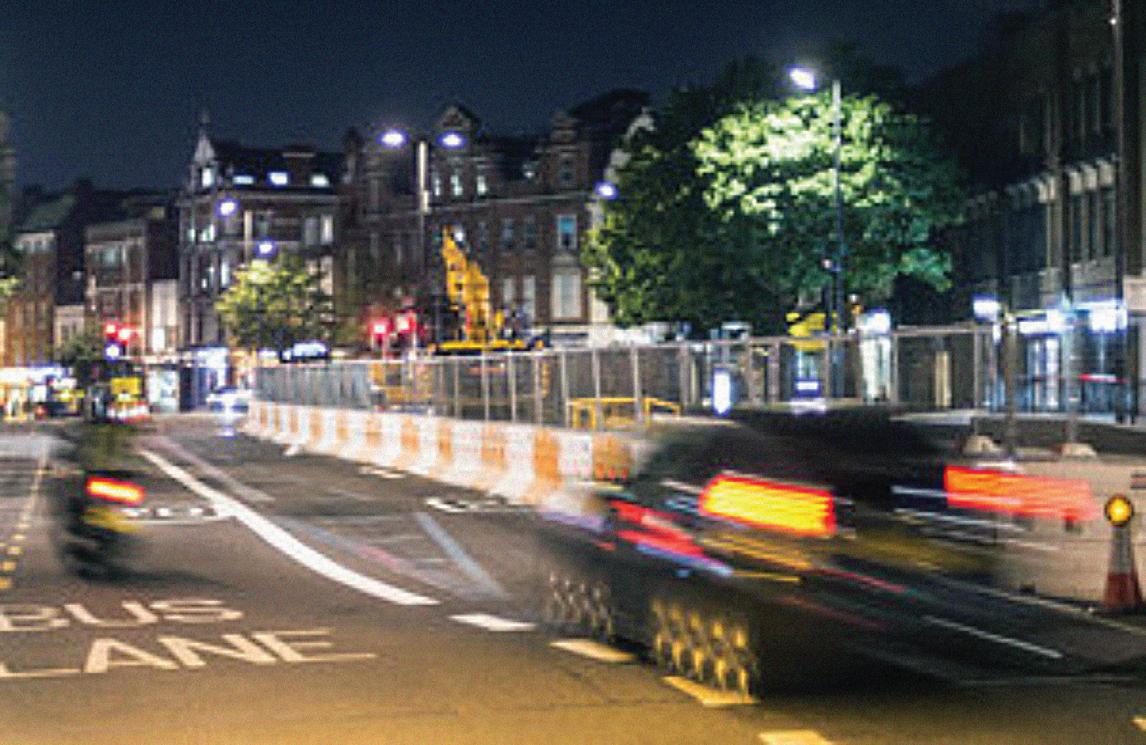
Noise Abatement Society chief executive Gloria Elliott OBE said: “Excessively noisy vehicles and anti-social driving causes disturbance, stress, anxiety and pain to many. It is unsafe and disrupts the environment and people’s peaceful enjoyment of their homes and public places.
“Communities across the UK are increasingly suffering from this entirely avoidable blight. The Noise Abatement Society applauds rigorous, effective, evidence-based solutions to address this issue and protect the public.”
Iain Stewart has been elected the new chair of the Transport Select Committee. He takes over from Huw Merriman, who was made a transport minister in prime minister Rishi Sunak’s new cabinet.
Stewart, the Conservative MP for Milton Keynes South, beat five other candidates.
The other nominated MPs were: Jack Brereton, Jackie Doyle-Price, Katherine Fletcher, Chris Loder and Karl McCartney.
Stewart said: “I have a real passion for, and experience in, transport issues and I am very much looking forward to working with colleagues on the committee to complete the existing programme of work and establish fresh inquiries. I want the committee both to scrutinise and hold to account government, agencies and operators, but also to do important horizon-scanning proactive work into future opportunities and challenges.”
Electric cars will no longer be exempt from vehicle excise duty from April 2025, the Chancellor of the Exchequer announced.
Vehicle Excise Duty (VED) is a tax levied on vehicles on UK roads. There are different rates depending on the vehicle, and pure-electric cars are currently exempt. Electric vehicles (EVs) are currently exempt. However, EVs registered from April 2025 will pay the lowest rate of £10 in the first year (which currently applies to vehicles with CO2 emissions 1 to 50g/km), then move to the standard rate which is currently £165.
In his Autumn Statement, Jeremy Hunt said: “Because the OBR (Office for Budget Responsibility) forecasts half of all new vehicles will be electric by 2025, to make our motoring tax system fairer I’ve decided that from then, electric vehicles will no longer be exempt from

vehicle excise duty.”

Under the plans laid out in the Autumn Statement the standard rate will also apply to electric vehicles first registered after April 2017.
However, drivers of traditional fossil fuel cars could see their running costs increasing much sooner, with a planned rise in fuel duty in March 2023 potentially adding 12p a litre to current petrol and diesel costs. According
to the Treasury’s impact assessment this will bring in £515m in 2025-26, £985m in 2026-27 and £1.595m in 2027-28.
Steve Gooding, director of the RAC Foundation, said: “It shouldn’t have come as a surprise that the pump-priming holiday electric vehicles have enjoyed from Vehicle Excise Duty would end, not least because manufacturers are still struggling to meet the demand for EVs in
their showrooms. The wider question, though, is where exactly the chancellor will go from here on the bigger tax question – the decline in fuel duty income as we leave the petrol and diesel era behind.
“Whilst there are only 540,000 battery-electric cars on the road in the UK at the moment, out of a total fleet of 33 million, as they become more common we predict fuel duty revenue from cars could drop by £5bn a year by as early as 2028.”
The Local Government Association (LGA) welcomed the move, saying that although electric cars have a less harmful impact on the environment than petrol and diesel cars, they still contribute to carbon emissions, congestion, and wear and tear on roads.
“It’s only fair then that drivers contribute towards these additional costs and help support investment in even lower carbon alternatives such as public transport, buses, cycling and walking,” said LGA’s transport spokesperson, David Renard.
Private parking companies have bought a record number of vehicle keeper records from the DVLA to use to issue parking charge notices to drivers who have allegedly breached their terms and conditions.
Official data shows that in the first quarter of 2022-23, car park management companies accessed 2.7 million records, a new high.
ParkingEye has emerged as the biggest purchaser of data from DVLA, buying 521,000 records in the quarter at £2.50 for each file.
The number of records bought by the companies – around 176 in total – is a proxy for the number of penalties they dish out.
It puts the firms on course to issue close to 11 million penalties – of up to £100 each – over the course of the financial year for supposed parking infringements on private land.
Steve Gooding, director of the RAC Foundation, said: “For all the concerns about the state of the economy there is one sector that is booming: private car
park management.
“Over the past decade the number of tickets being issued to drivers on private land has jumped from less than two million annually to probably near 11 million this year.
“This is big business which is seeing more entrants all the time. The attraction can only be one thing – the chance to make significant profits before the government brings in changes – which now appear delayed – to level the playing field.
“It remains inconceivable that, annually, millions of motorists
are setting out to run up these tickets of up to £100 each, especially when household budgets are so tight. This latest data is a sign of a system that is broken. We hope the new ministerial team in charge of this part of public policy will tackle it with renewed vigour.”
In March 2019 the Parking (Code of Practice) Act – introduced by Sir Greg Knight MP as a private members’ bill –became law and paved the way for a single, ministerially-sanctioned code of practice for the industry. However, the code is still to be finalised and ministers
Drivers overcharged after using parking machines have received refunds from Worcester City Council. Around £400,000 was taken in error across 15,000 parking sessions at council sites equipped with Flowbird pay & display terminals.
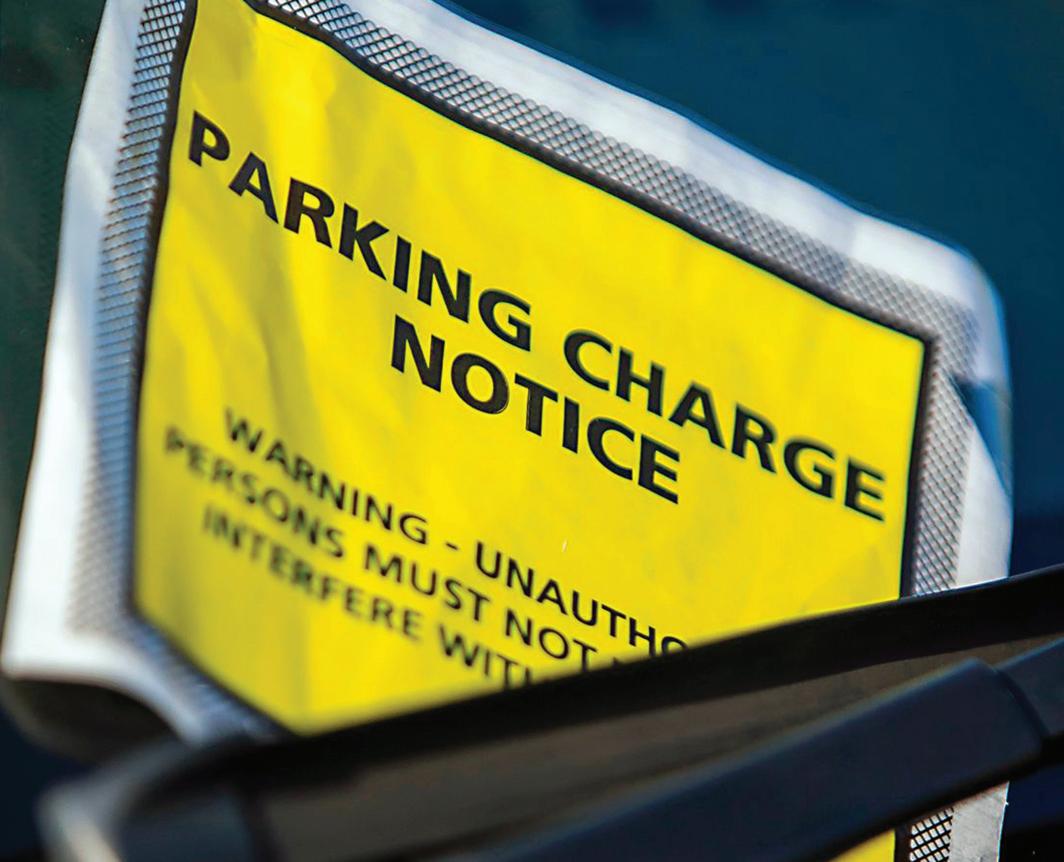
The council said 183,000 repayments were set to appear in customers’ accounts.
The council has also sought to collect unpaid transactions.
After the issue of duplicate payments became apparent, Worcester City Council ordered a stop on payment processing, with the last batch of payments processed on 30 September. This meant that many batches of transactions were held back and there were therefore car park payments relating to valid car parking sessions between 29 August and 28 September that had to be dealt with.
The council instructed
Flowbird to begin processing these transactions and sought to assure customers who had parked during this period that these are not further duplicate payments but are valid ones which are merely delayed in leaving their accounts.
Shane Flynn, director of finance at Worcester City Council, said: “While we are pleased to hear that all duplicate payments have now been dealt with, there is still some work to be done on processing payments which were put on hold once the duplicate payment issue became apparent.
“Firstly, we would ask people to check their accounts to ensure they have received their refunds and if they haven’t, to contact us at parkingoffice@ worcester.gov.uk.
“Secondly, we also suggest that if people have further payments taken from their accounts, that they check to
make sure that they do relate to valid car parking sessions. With these remaining payments, people may have parked several times and will likely see the payments all taken out at once, or within a couple of days. We would like to assure customers that these will be multiple payments, rather than duplicate payments.
“We appreciate how frustrating that this issue has been to customers, but ask that they bear with us while we try to bring this issue to a close. We will continue to provide regular updates until the matter is completely resolved.”
If any customer has incurred bank/overdraft charges as a result of this issue, the council said it will ensure that these are reimbursed. Anyone needing financial advice is being advised contact Citizens Advice, with whom the council works in partnership.
will consult on it again in early 2023. Alongside the code, government wants to establish an independent appeals service and scrutiny board.
Wheel clamping on private land was all but outlawed by the Protection of Freedoms Act 2012, however that legislation allowed parking companies to go after the registered keepers of vehicles supposedly breaking parking regulations on private land without having to prove who the driver was.
The RAC Foundation said that since 2012 there has been an explosion of ticketing, with the number of keeper records bought by the industry rising from 1.9 million in 2012-13 to a high of 8.4 million in 2019-20. This year, 2022-23, the number could be close to 11 million if the trend seen in the first quarter continues.
The RAC Foundation is a transport policy and research organisation that explores the economic, mobility, safety and environmental issues relating to roads and their users.
The foundation publishes independent and authoritative research with which it promotes informed debate and advocates policy in the interest of the responsible motorist.
A motorist posed as a delivery driver to avoid parking fines in Leicester. James Barford was repeatedly caught parking in loading bays and permit areas between 2020 and 2021.
Barford, 34, pleaded guilty to 11 charges under the Fraud Act at Leicester Magistrates’ Court on 16 November.
Leicester City Council said Barford faked six delivery notes when he was caught parking in a loading bay near his workplace. He also produced fake invoices to challenge fines issued for parking in permit-only residential areas.
The council said in all 11 cases Barford claimed he was making deliveries to nearby businesses and customers.
Barford was fined £846, ordered to pay £677 costs, £630 compensation and a victim surcharge of £85.
WPS is a leading solution provider of pay on foot systems and we have teamed up with industry payment providers to give motorists the same experience in paying for parking on-street in the off-street environment.
Digital payments, pre-booking and permit systems are ready to go using our partners JustPark, ZatPark and now with the addition of RingGo, or using our own payment app, WPS Pay.
You can be confident when investing in WPS that you are providing your customers with the widest choice of payment options coupled with an industry-leading redesigned user interface.
WPS are also proud to be leading the way with confirmed integration into the new National Parking Platform (NPP).
Build your parking operation on the WPS Parking Platform and our ever-growing Marketplace of integrated solutions.
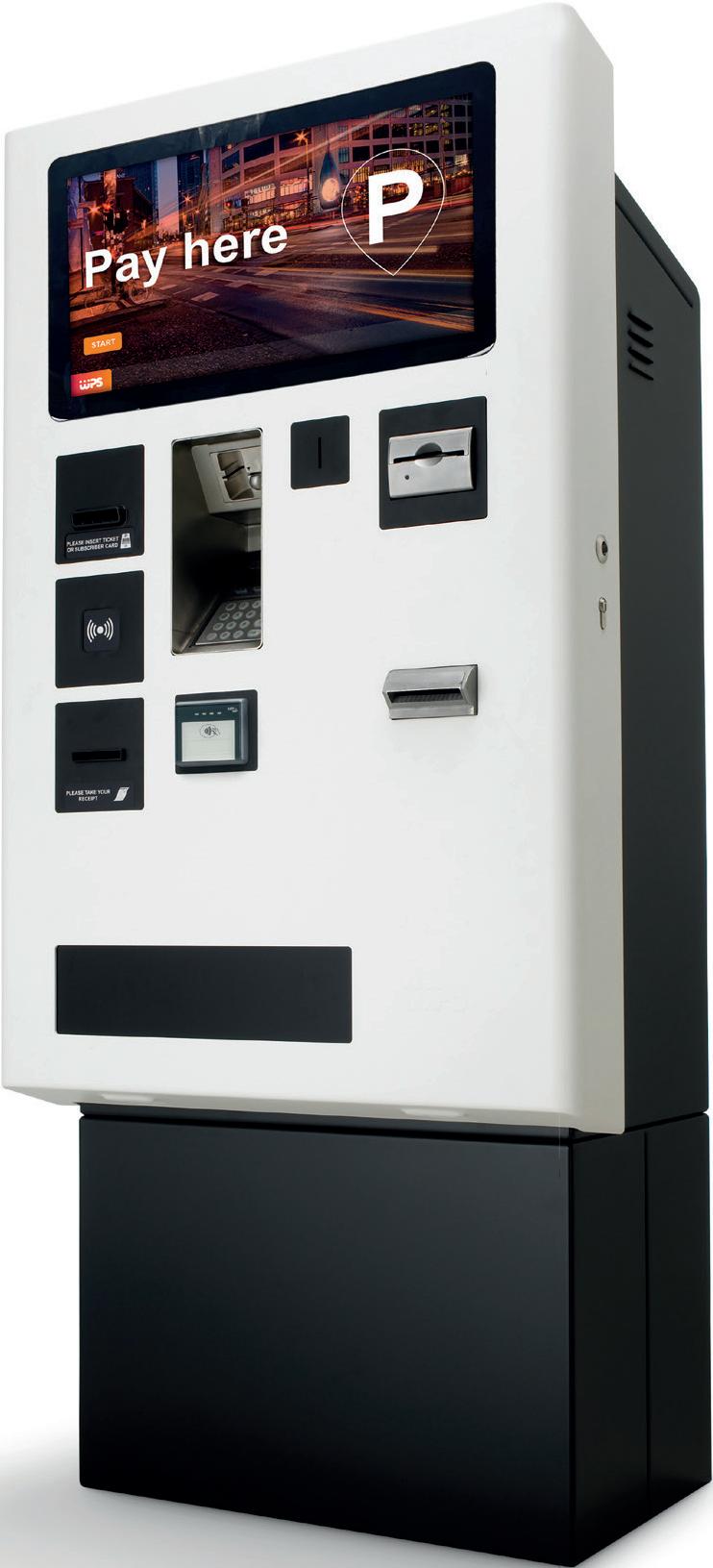

Up to £100m is to be made available to improve rest areas and roadside facilities for lorry drivers, the Department for Transport has announced.
Truck stop and road service operators can bid for a share of a £32.5m match-funding pot from the government. The new funding commitment comes in addition to £20m of match-funding launched earlier this year by National Highways. The two funding pots aim to improve security measures for drivers, boost welfare facilities such as showers, rest areas and restaurants, and increase HGV parking capacity where possible.
Roads minister Richard Holden launched the funding at the Red Lion Truckstop in Northamptonshire. Holden said: “Hauliers and drivers are critical to keep our economy motoring. But for decades, our truckers have had a raw deal when it comes to decent roadside facilities. This is why I’m so proud that our government is going to provide match funding support to the industry to boost drivers’ welfare, safeguard road safety and make sure driving an HGV is a really attractive career option by providing the facilities and respect our lorry drivers deserve.”
The funding scheme draws
on The National Survey on Lorry Parking: Part One, which provides important evidence as to what improvements are needed and where to boost the nation’s roadside infrastructure.
With hauliers required to take mandatory breaks and rest periods, it is hoped that building better roadside facilities will improve the quality of HGV drivers’ rest and recovery, ensuring everyone can feel safe on our roads.

National Highways customer experience director, Pete Martin, said: “We continue to work closely with operators of roadside facilities to help improve the standard of parking and other amenities they provide on motorways and major A-roads and are excited to see the results of this investment. \
“We want all road users to reach their destination safely and encourage everyone, from those who drive as a profession
through to people travelling on holiday or for leisure purposes, to plan ahead before setting off and to take regular breaks.”
Kate Jennings, director of policy at Logistics UK, said: “Logistics UK’s members and their employees deserve access to hygiene and rest facilities enjoyed by workers in other parts of the economy, and it is good news that funding is becoming available to help improve the quality and safety of amenities already in place –a swift resolution will now be needed to ensure that the shortfall of lorry parking and necessary facilities can be constructed and opened to support our key workers in the course of their daily travels.”
The road haulage association (RHA) has also welcomed the government’s announcement, but urges ministers to go further to help developers build muchneeded new truck stops. Richard
The Safer Parking Scheme has launched an accreditation specifically tailored to facilities for heavy goods vehicles.
The new Park Mark Freight is an assessment managed by Police Crime Prevention Initiatives and the British Parking Association that seeks to enhance the highest quality of services and operations of contemporary lorry parks and facilities.
Park Mark Freight builds upon the Park Mark by introducing essential criteria specific to freight parking facilities.
The Park Mark is primarily aimed at the prevention of criminal behaviour within the parking environment and requires owners or operators to adopt an active management strategy to ensure that there is minimal occurrence of crime.
The freight industry experiences a high volume of cargo theft and the main Safer
Parking Scheme Assessment Guidelines do not explicitly cover this type of business.
Facilities awarded the Park Mark Freight
Smith, RHA managing director, welcomed the move but called on ministers to reform planning regulations to help tackle the estimated shortage of 11,000 safe and secure lorry parking spaces. He said: “We’re pleased to see that service station operators can apply for grants to improve facilities for drivers –the standards at many truck stops are poor so it’s right that the government has shown this commitment.
“But thousands of truckers every night are still left without safe and secure places to park. Simplifying planning bureaucracy would help firms develop new sites quicker, which would boost local economies and offer truckers the facilities they deserve.”
The RHA is urging the government to reform the National Planning Policy Framework (NPPF). The association proposes that the NPPF is amended to reflect regional and national needs for lorry parking, reduce distances between facilities, and prioritise driver welfare.
A spokesperson from SNAP, a company that runs a payment system for drivers and fleet operators, said: “Enhancing driver welfare and ensuring that hauliers have somewhere clean and secure to park their vehicles is a leading priority of our business – and the £52.5m government funding is a vital step in giving drivers the facilities they deserve.”
award are subject to an annual assessment to ensure the high standards required by the award are maintained.
To be granted Park Mark Freight, a parking facility must demonstrate a wide range of responsibilities, which includes low crime, measures in place to enhance the safety of people and vehicles, good management and operations, and exemplary customer service.
Sara Fisher, head of operations and business development said: “There is an increased expectation for efficient, well managed and high-quality lorry parks and truck stop facilities in order to combat vehicle and cargo crime.

“We are delighted to launch Park Mark Freight with Police Crime Prevention Initiatives and look forward to awarding the Park Mark to facilities that can demonstrate the highest standards across their operations.”
For more information visit www.britishparking.co.uk/park-mark-freight



Transport for London (TfL) has announced that Saba has been awarded its car park contract following a recent procurement process. Saba will take over from NCP, the current car park operator, in January
TfL’s car parking portfolio consists of 79 car parks at London Underground, Overground and Elizabeth line stations, providing more than 10,500 parking bays in total across London.
The car parks are provided for travellers who need to complete part of their journey by car. TfL provides dedicated space for Blue Badge holders, who can use the car parks free of charge.
As the pandemic saw customers change their travel habits, the procurement process saw TfL asked car park operators to propose innovative use of space within the car parks as well as invest in technology to make payment easier and additional electric vehicle charging points.
Lal Bahadur, asset development portfolio manager at TfL, said: “Saba and PayByPhone will manage our car park estate and help us continue to provide a great service to our customers. By working closely together, we look forward to finding new
ways to use the spaces that complement the services provided and bring further innovations to the customers who use our car parks across London.”
TfL said it will work with Saba to find ways to make the car
parks more environmentally and financially sustainable, as well as possible additional services to help the wider community.
In January this year, TfL began a ‘Car Park Innovation’ trial which has allowed two small

Two major European parking operators are in merger discussions. The shareholders of Spanish car park manager Saba and Belgium company Interparking are reported to be in talks to combine the businesses. A merger of Interparking and Saba would create a European player with core earnings above €200m.
Saba has a significant UK operation, running both car parks in town centres, at rail stations, hospitals and universities, as well as a number of on-street enforcement
contracts for local authorities, Saba is 99.5% owned by Spain’s Criteria, the main shareholder in Spain’s Caixabank. Interparking is owned by AG Real Estate, the real estate subsidiary of Belgian insurer Ageas and Dutch pension fund APG.
According to Spanish newspaper Cinco Dias, who first reported the news, the groups are working with advisers to value their respective businesses ahead of a merger. Jefferies and BNP are advising Interparking’s shareholders, while BofA is advising Criteria.
The Ultra Low Emission Zone (ULEZ) will be expanded to cover the whole of London, the city’s mayor Sadiq Khan has announced. The expansion will come into effect on Tuesday 29 August 2023 and will operate across all London boroughs up to the existing Low Emission Zone boundary.

In parallel to expanding ULEZ, the mayor is announced a new £110m car scrappage scheme, a package of measures to support disabled Londoners and an expansion of bus network in outer London.
Khan says that the ULEZ has helped to reduce roadside pollution levels by 44% in central London and 20% in inner London. The Mayor believes that all Londoners have the right to breathe clean air.
Khan announced plans for the expansion at Bonus Pastor School in Lewisham, an area with dangerously poor air quality, and spoke to students and stakeholders from across London about the dangers of toxic air and the importance of tackling it urgently. The mayor said: “The latest
evidence shows that air pollution is making us sick from cradle to the grave. Londoners are developing life-changing illnesses, such as cancer, lung disease, dementia and asthma. And it’s especially dangerous for children due to the long-lasting impact on their health and life chances, with kids in our city growing up with stunted lungs.
“The ULEZ so far has been transformational, reducing harmful pollution levels by almost a half in central London. But there is still far too much toxic
businesses, Lovespace and Spokesafe, to use part of some of TfL’s car parks across London to provide storage facilities to their customers.
Phillip Herring, managing director at Saba, said: “We are delighted to have been awarded the contract to manage TfL’s car parking estate and look forward to working closely with both TfL and PayByPhone, to deliver a step change to the services and an improved customer experience.”
Saba will work with PayByPhone, which has provided payment services for TfL car parks for several years.
Rebecca Maisey, PayByPhone UK’s client director, said: “The longevity of our relationship is a direct reflection of the good work carried out under our previous contract coupled with our exemplary working relationship. Going forward, this direct contract will enable us to work even more closely with TfL and to deliver the additional services they require alongside further customer improvements. We are also very much looking forward to working with Saba.”
NCP had managed the portfolio since December 2014 and PayByPhone has been the payment provider since August 2019 through the contract with NCP. PayByPhone will continue the work achieved under NCP, but will work with TfL directly.
air pollution permanently damaging the health of young Londoners and leading to thousands of early deaths every year, with the greatest number of deaths in the outer London boroughs. Expanding the ULEZ London-wide will mean five million more people will be able to breathe cleaner air and live healthier lives.”
The expansion goes ahead despite some 60% of those who responded to the public consultation into the expansion plans were opposed to it, 70% of residents in Outer London against the idea, and 80% of workers in Outer London opposed.
The Greater London Authority (GLA) Conservatives have criticised the mayor for pushing ahead with the plans despite the public response.
Conservative transport spokesman Nick Rogers said: “Now is not the time to hammer Londoners with a £12.50 daily cost-of-living charge. Residents have made their views very clear to the mayor: they do not want the ULEZ expansion. The mayor must listen to them, scrap these plans and use the £250m saved on real measures that tackle air pollution.”

Topsham street scheme has an electric car club bay and bike-hire bays
A mobility hub in Devon delivered by social enterprise Co Cars has been recognised for promoting greener journeys with a ‘Gold Award’ from shared transport charity CoMoUK.
The site at Seabrook Orchards in Topsham, near Exeter, has received CoMoUK’s highest standard of accreditation for a new development. It is only the second such facility to be officially recognised by the charity – the first being a street hub in South Woodford, London.
Mobility hubs bring together shared, public and active travel modes, along with community facilities, and redesign and reallocate space away from the private car. They are used in many cities across Europe and North America and are increasingly spreading in the UK. The hubs can take several different forms, ranging from larger interchanges in busy city centres to mini stations which are tailored to suburban or rural areas.
The Seabrook Orchards facility was launched by not-for-profit social enterprise Co Cars in May and is the first at a housing development in Exeter.
It has been made possible
thanks to a partnership with Devon County Council, Bloor Homes and the landowners and management agents Darts Farm.
The hub is powered by 100 per cent renewable energy from Good Energy. It features a brandnew electric shared Co Car, Co Bikes e-bikes and a docking station. There is a dedicated charger for the Co Car plus a public charger, both supplied by Econetiq.
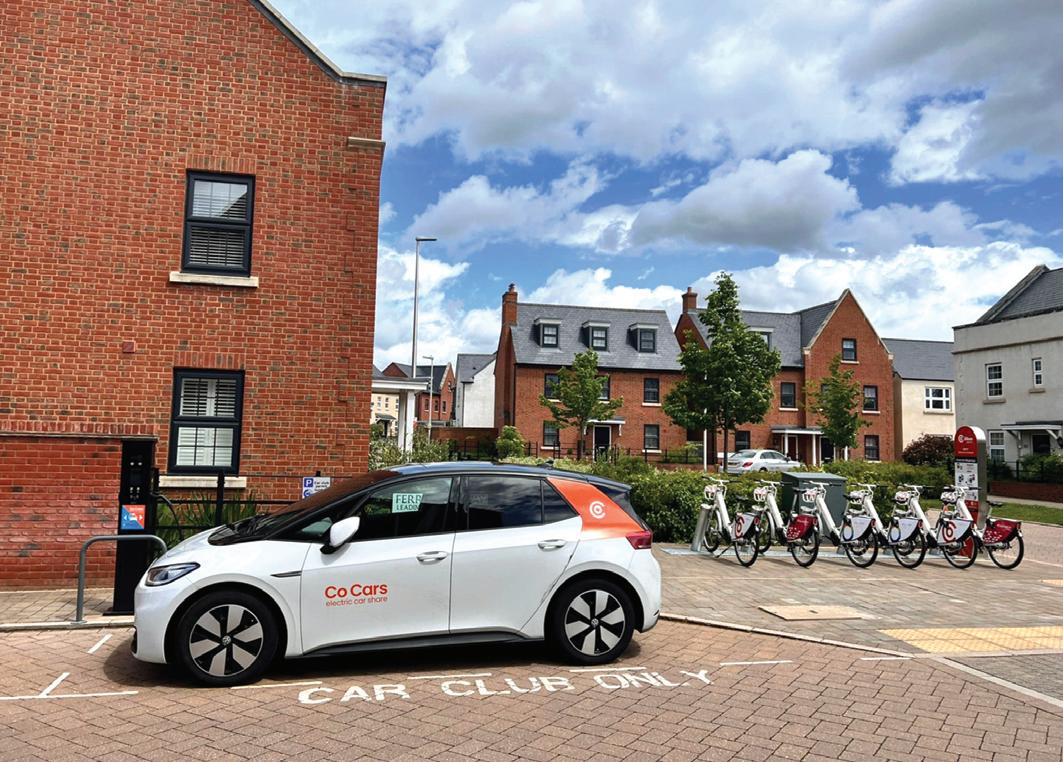
The hub is located 100 metres from dedicated cycle routes and the nearest bus stop, with the 57 bus route providing frequent connections to both Exeter and Exmouth.
Seabrook Orchard residents were offered free first year membership of Co Cars and a driving
credit to get them on the road. An on-site event gave them the opportunity to find out more about the services and to try the e-bikes for themselves. Since the hub opened there have been almost 2,000 e-bike rentals and more than 20% average car utilisation. Trip analysis shows the majority of bike journeys from the housing development end in Exeter city centre, Digby and Sowton train station, and the Royal Devon and Exeter Hospital, demonstrating that the bikes provide important connections to retail, onward travel and employment.
CoMoUK said that each shared Co Car removes an estimated 8.5 private cars from the road and around 50% of Co Bikes
The British Parking Association’s Selfish Parking campaign is highlighting the misuse of disabled parking spaces and Blue Badges. Under the ‘It’s not OK to park where it’s not OK to park’ banner, the association is calling for the public to be respectful of those with accessibility needs and with less visible or hidden disabilities.

Research by the British Parking Association (BPA) shows that the issue of selfish and anti-social parking is a major frustration for many of the public. One aspect of poor parking behaviour is the continued abuse of parking spaces designed for those with accessibility needs, as well as people using expired or invalid Blue Badges, or another person’s badge.
The campaign includes posters to highlight problem
parking areas, social media cards, and the hashtag #selfishparking which can be used to encourage motorists to think before they park and show respect for others
BPA members are being encouraged to actively engage with this campaign, building to deliver a nationally consistent message that inconsiderate
parking is not OK.
Dave Smith, BPA head of communications, said: “Our consumer research revealed one of the biggest frustrations people have is anti-social and inconsiderate parking. Misuse of parking bays specifically designed for those with accessibility needs and the abuse of Blue Badges by those
trips replace journeys that would have been made by a car.
Richard Dilks, chief executive of CoMoUK, said: “Mobility hubs are exciting ways to boost sustainable transport, improve public health and save people money. The combination of the cost-ofliving and climate crises make it more important than ever to properly manage space for shared, active and public transport as an alternative to private car use.
“Mobility hubs are increasingly popular on the continent and it’s time for the UK to embrace this idea to improve air quality, decarbonise the transport sector, support more active travel, and revitalise town centres for local communities. We are encouraged that local authorities and housing developers are actively considering mobility hubs.”
Nic Eversett, managing director of Co Cars, said: “It’s an honour to receive this accreditation for Seabrook Orchards and I’d like to thank our project partners for their support in making it happen. Mobility hubs make it very easy for people to make more sustainable travel choices. It’s been fantastic to see residents embrace the services it offers. Moreover, the hub has also sparked the interest of our stakeholders, including on-site visits to find out more.”
who are not permitted to use them are ongoing concerns.”

The campaign is supported by the Welsh Government and Disabled Motoring UK (DMUK).
Heidi Turner, communications and campaigns director at Disabled Motoring UK, said: “DMUK is pleased to support the BPA’s ‘selfish parker’ campaign and is thrilled to see a focus on disabled parking bays for this next phase. Blue Badge and disabled parking abuse is a priority for us and is the most common complaint that we hear about.
“Spreading the message about selfish parking among the general population is vital in seeing a reduction in this kind of abuse. So many see their actions when parking in a disabled bay without a Blue Badge as a ‘victimless crime’. However, to a disabled motorist being able to park in a disabled bay is vital to their independence.”
From a technology perspective, the parking and enforcement industry is maturing rapidly. When speaking with large authority teams operating in complex urban environments, or smaller councils aiming to effectively manage their region, we consistently encounter demand for systems that support and empower parking and enforcement teams.
I believe that technology suppliers can help to drive this transformation by delivering solutions that are sufficiently flexible to meet the requirements of all authorities – whether large or small –without compromise on quality of functionality, delivery, or support. This is an ambitious goal, but it is certainly not an unrealistic one. I know because it is already happening.

Taranto Systems’ success is to some extent built upon our record in major parking and enforcement implementations, such as those in place in Manchester, Sheffield and Edinburgh, and over ten London boroughs.
But of course, Taranto’s more than 60 clients come in all shapes and sizes. We are proud to support some of the UK’s most complex systems; but equally so we are proud to work with the many towns and districts where our system helps relatively small teams to ‘punch above their weight’ in delivering major change through a range of offstreet parking operations.
Such changes come about when talented and motivated people have access to powerful tools that truly meet their requirements. In recent years, new technology has emerged which makes it possible to deliver quality solutions for all clients:
• Platform as a Service (PaaS): As my colleague Barry Johnson recently explained in these pages, PaaS enables the delivery of solutions that can accommodate vast complexity. But PaaS also means that systems can be scaled back while retaining elements that benefit all customers: enabling them to make efficient use of the team’s time; access to powerful new functionality quickly, easily and without disruption; and far greater resilience and security.
• Customer Self-Service: Empowering motorists to manage their own parking has significantly reduced workload on authority staff. By aligning the user experience with the .GOV webpage structure, such self-service portals offer a user-friendly interface with a familiar look and feel, and consistent workflows to guide users through processes – and meet accessibility requirements (readability, voice control, Responsive Web Design and more).
• Configuration: Configuration is both vital and often underrated. A solution underpinned by comprehensive configuration can empower large teams to manage complex changes themselves – see Manchester City Council, where the team was able to implement Part 6 legislation changes through Taranto configuration without any chargeable services.
• Automation: Automation helps teams of all sizes but is perhaps especially important for councils with fewer resources. By combining effective automation with a system configured to the organisation’s specific requirements, it is possible to remove significant volumes of workload, enabling the team to focus their time on activities that really make a difference.
It’s time to turn the dial in parking and enforcement technology, writes Lewis Wray, Managing Director at Taranto Systems
But effective solution delivery is never only about the technology. Tailoring solutions to a range of requirements means understanding client needs and delivering quality every single time. And for that you need a quality mindset.
We see the Taranto system’s functionality as a dial that can be adjusted for each customer. It can be cranked up or turned down based on client requirements – but the core system, and the quality underpinning it, never changes.
This mindset focuses the entire organisation’s priorities on value for the customer. There will always be companies willing to offer superficially similar sounding solutions for a lower price, but we know that even if we refine requirements to meet a particular budget, our quality never wavers.
This is a vital consideration because authorities of all size are focused on risk and security: they need complete assurance that their supplier can support them technically with a tried and tested solution that they can manage themselves.

Maturation of parking and enforcement technology is presenting council teams with an opportunity to transform how they manage their estate. Teams of all sizes are able to improve the efficiency of processes and take advantage of new legislation to keep their community moving safely, fairly and efficiently.
Taranto Systems is committed to further enhancing a parking and enforcement solution already used by the industry’s major players –but also to harness the latest technology, configuration and automation to empower organisations of all sizes.

With Taranto, a single back-office suite can manage Blue Badges, Fixed Penalty Notices, suspensions, abandoned vehicles, debt management, removals and DVLA devolved powers – all accessible via one login and with a consistent user experience.
The entire system uses configuration and automation to maximise simplicity and usability. And we can turn the functionality dial up or down as required, creating a solution tailored to your organisation and budget.
So whatever your size or scale of operations, Taranto’s quality solution and commitment to service will meet your needs. And we will keep on developing and improving, turning the dial to support this industry and keep driving it forwards.
That’s our promise; if it sounds good to you then let’s talk.
We deliver for clients of all sizes in four main ways:
Reliable innovation
A product roadmap should be clearly communicated, developed and prioritised in close collaboration with clients –and then continually delivered upon by the supplier. A good example of Taranto’s commitment is the Blue Badge module, first introduced to customers as a roadmap item, and developed in partnership with Haringey Council. Since being installed in August 2021 it has reduced Haringey’s Blue Badge-related crime figures by 65% in one year.
Migration
A any client is naturally concerned with migration risk, our customers can be assured that over the past four years Taranto has undertaken 15 client migrations, transferring more than 12 million records from legacy systems – more than any other supplier in the industry. We ensure success by allocating dedicated teams to support this process, and our project delivery team has twice been shortlisted at the British Parking Awards, and commended on one occasion.
Flexibility
Because Taranto is built around configuration and automation, underpinned by a commitment to quality across all departments, we are uniquely able to support councils with the management of their parking operation in the way they wish to. In short: we don’t dictate how operations should be managed because of limitations in what our solution can do.
Assurance
Taranto has unique credibility in the industry, with some 13 million PCNs and 2 million permits issued through the system each year. 7,000 users manage parking and enforcement operations via Taranto, with more than 2,000 handhelds in operation.
Lewis Wray is Managing Director at Taranto Systems. He has led the Taranto team for 10 years, during which time he has overseen the establishment of Taranto as the public sector platform of choice in parking, road user charging and tolling. Lewis has driven Taranto’s innovation journey across both customer facing and back office systems, including the recent transition to a Cloud-based, Platform as a Service (PaaS) solution. The first of its kind in the industry, Taranto’s PaaS system represents a landmark development in parking and enforcement technology infrastructure.
“Changes come about when talented and motivate people have access to powerful tools that truly meet their requirements”
Lewis Wray
Supported by:Exhibitors include:
School Streets effectively address the congestion, road safety and air quality concerns that many schools experience.
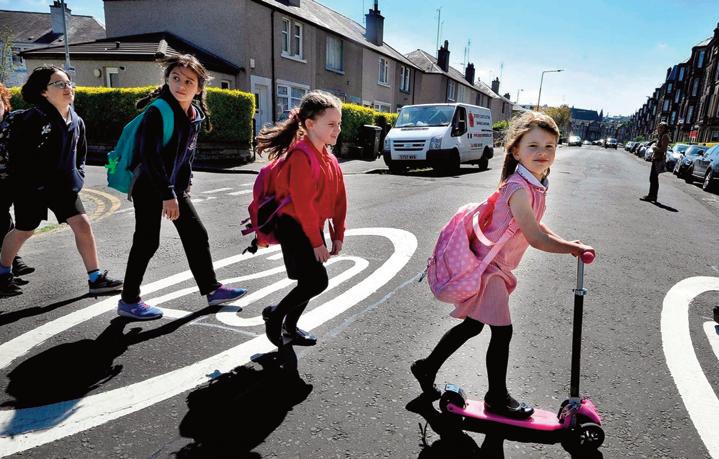
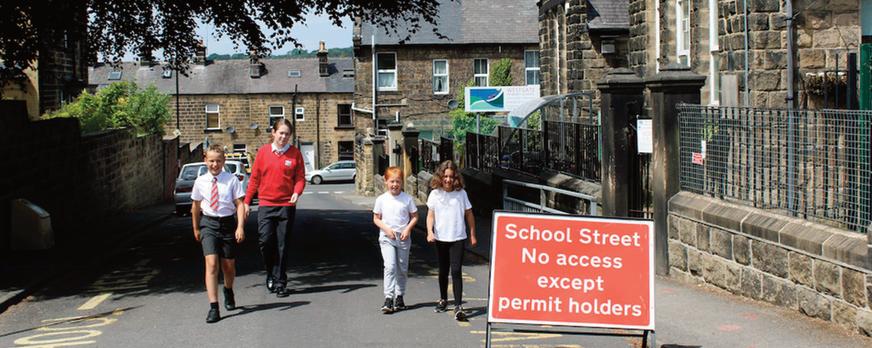
Landor LINKS is running a one-day event, hosted by Lambeth Council, to showcase best practice and offer practical guidance. This inaugural conference will bring together professionals from a range of disciplines.

The panels will discuss issues including:
l Funding
l Partnerships
l Active travel
l Health and wellbeing
l Consultation and engagement
l Infrastructure design
l Monitoring
l Traffic management & enforcement

There will also be opportunities to hear case studies.
Speakers include:
Catherine Rose
Cabinet member for leisure, parks, streets and clean air, Southwark Council



Mete Coban
Cabinet member for environment & transport, Hackney Council
Louise Krupski
Cabinet member for environment & climate, Lewisham Council
Rob Shoebridge
Traffic and transportation group manager, Derby City Council

Jemima Hartshorn Founder and director, Mums for Lungs


Tanya Braun Director of Policy and Communications, Living Streets
Asa Thomas Researching doctorate on School Streets, University of Westminster


Habib Khan
Founder and director, Meristem Design

life, challenging






 Headline sponsor
Headline sponsor
Innovative thinking, excellent management practice and a commitment to providing an excellent public service were all recognised at the British Parking Awards. This year marked the 20th anniversary of the competition which recognises achievement in the design, planning and management of parking across both the public and private sectors. Over 600 people attended a gala lunch at the Royal Lancaster London on 19 October. The ceremony was hosted by the comedian Kerry Godliman, who was presented with a special trophy because she is ‘Really Good at Parking’!

Besides recognising Kerry’s achievements as a driver, the dazzling awards show also honoured the work of professionals and organisations working across the parking sector. A total of 25 trophies were presented, with recipients taking to the stage to a soundtrack of music by Queen and applause by an audience of friends, family and colleagues.
There were key prizes for the building of car parks, and development of innovative technology, as well as a raft of awards for the teams and individuals who make this such a vibrant sector. The awards also recognised the changing remit of parking teams, reflected in the many entries that addressed issues such as the regulation of moving traffic, low traffic neighbourhoods and air quality schemes. To mark the 20th anniversary, three special ‘Parking Rosettes’ were awarded to projects and people who are playing a key role in the rethinking of parking. Many entries reflected how the worlds of parking and electric vehicle charging are ever more interconnected, recognised in a set of trophies presented by EVolution Magazine.
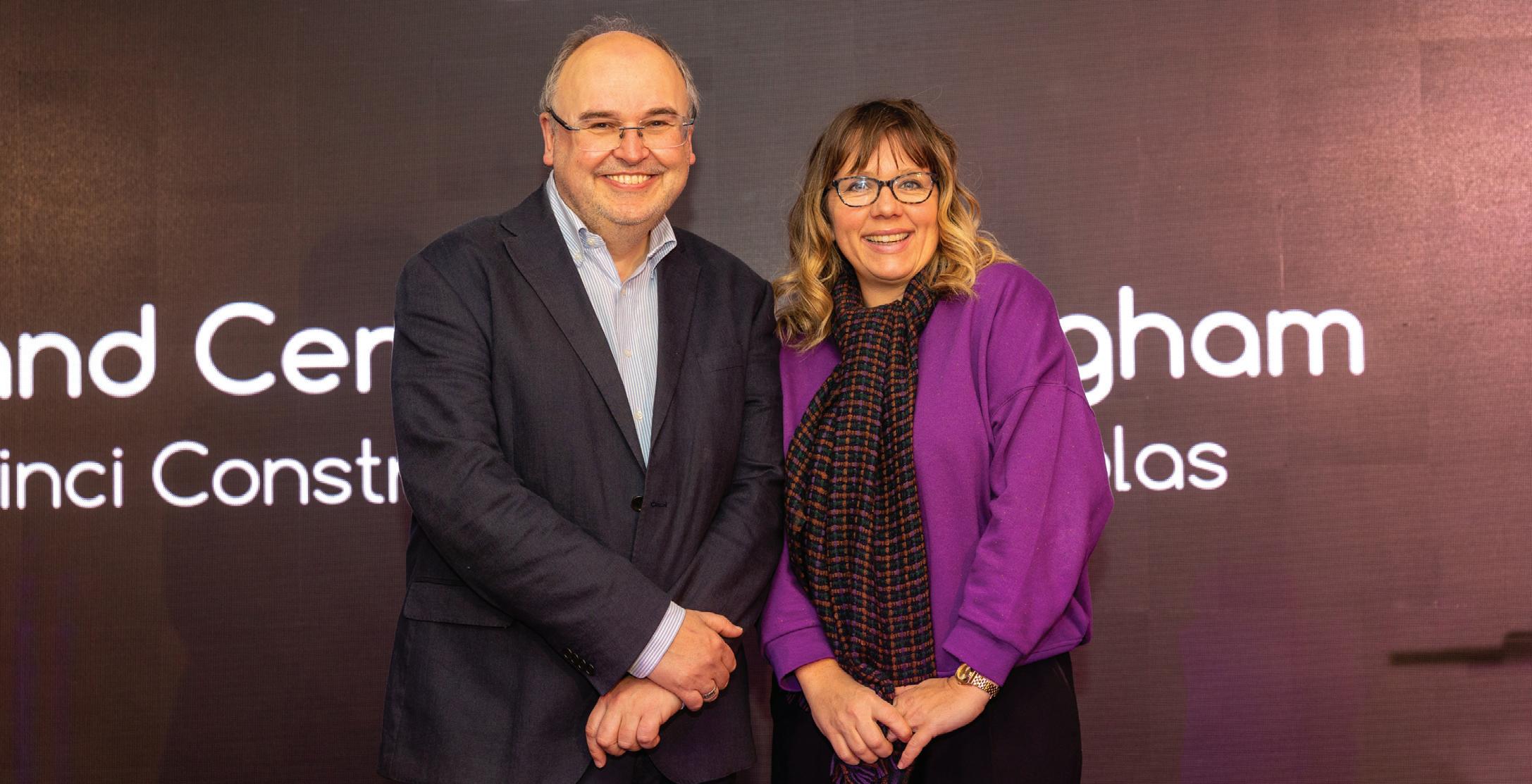
The role of parking in mobility was explored in an opening address by Paul Moorby OBE, managing director of Chipside, creator of the headline sponsor MiPermit: “My message is that we must all dedicate our cores to delivering a cleaner Britain, with cleaner air, cleaner water and better education for all on net zero. We have to go out there and provide leadership to anybody that will listen. To those of you in parking who are designing the future, give yourselves a round of applause.”
Mark Moran is editor of Parking Review
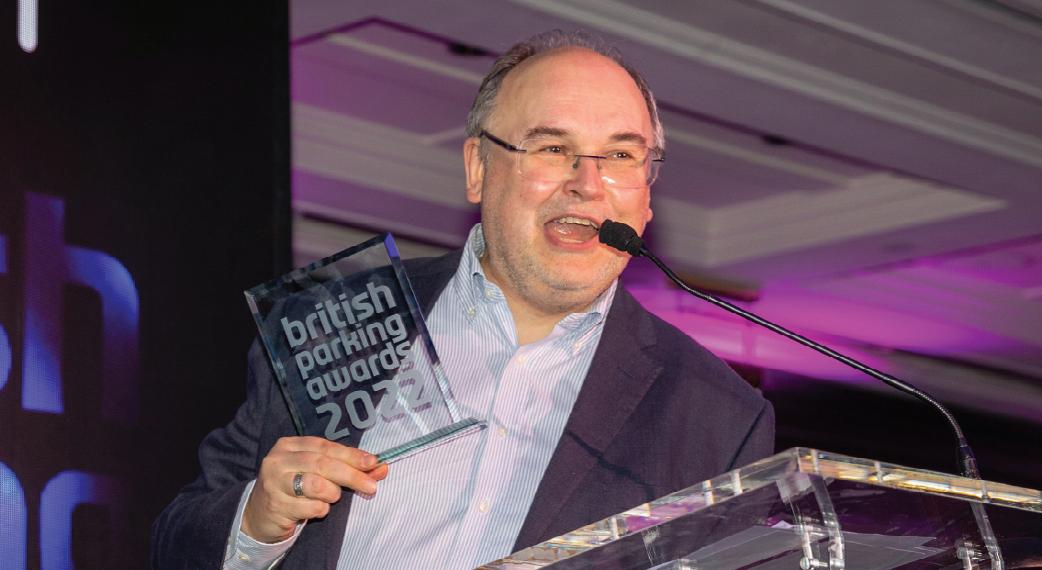
The 20th anniversary British Parking Awards celebrated all that is best in a sector that keeps our world moving, writes Mark MoranMark Moran and Kerry Godliman




The British Parking Awards 2022 took place at the Royal Lancaster London and also in cyberspace, with entrants and delegates sharing the moment on Twitter, LinkedIn and other social media channels. To see who posted what check out the hashtag #britishparkingawards


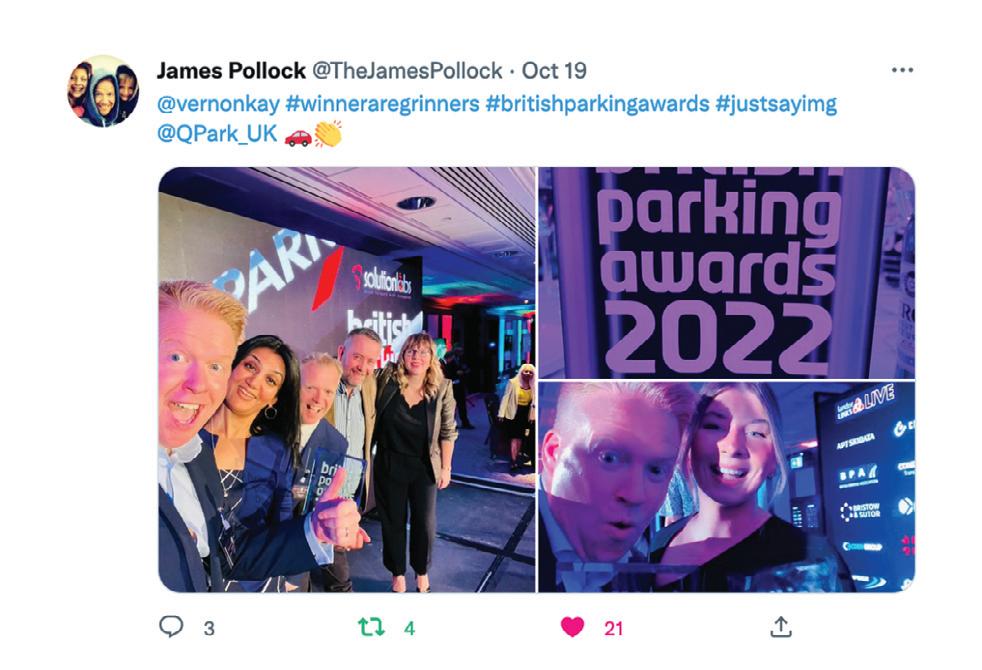
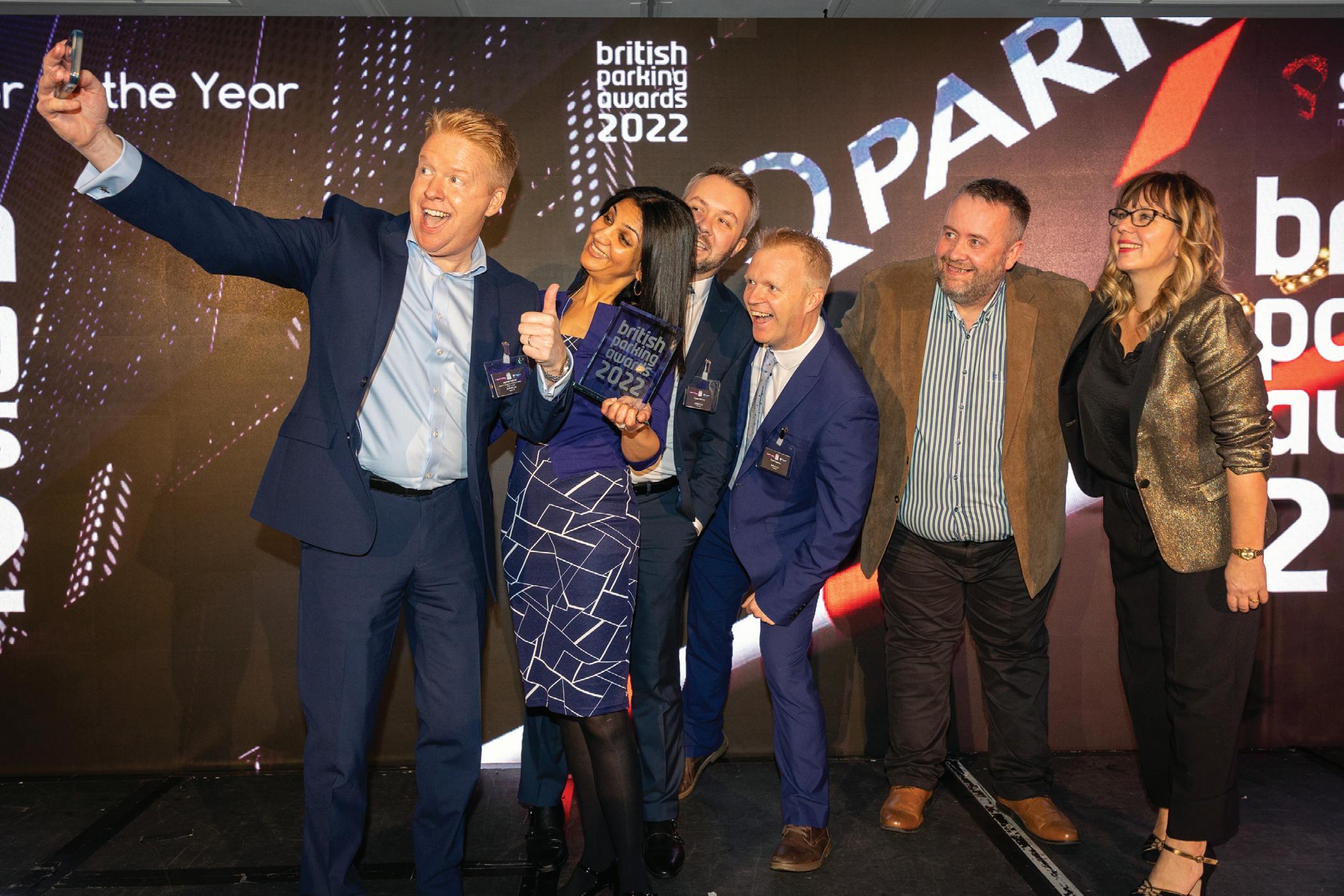
The British Parking Awards 2002 were hosted by comedian and actor Kerry Godliman. The star of TV series such as After Life and Whitstable Pearl received a special ‘Really Good at Parking’ trophy, having explained that she was very good at parking, actually!
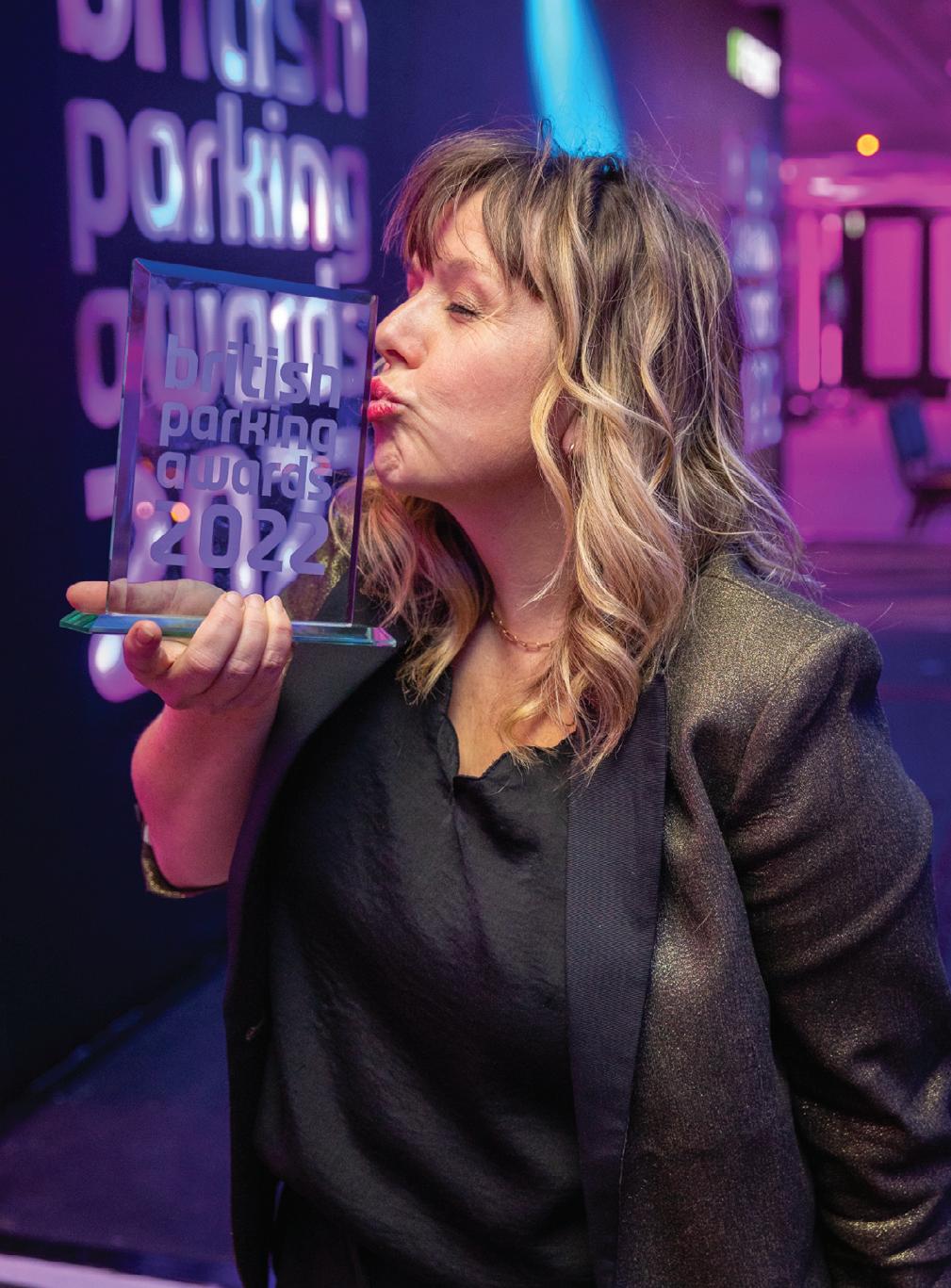
Entries to the British Parking Awards are assessed by a jury drawn from across the parking, transport and motoring sectors. There were over 120 entries to the 2022 competition, plus a series of nominations for special awards such as those for the Lifetime Achievement and ‘Parking Rosettes’.
Mark Moran, editor of Parking Review and jury chair, said: “One of the reasons that the British Parking Awards trophies are so coveted is that from the competition’s inception , the winners have been selected by an independent jury. The judges assess, discuss, argue over and then agree on the shortlist and eventual winners in a series of meetings that are truly fascinating and informative.”
The British Parking Awards 2022 jury
Chair and organiser: Mark Moran, editor, Parking Review
Jason Benjamin, independent consultant
Harry Clarke, director, Arlander
John Elliott, Local Government Technical Advisers Group (TAG)
Elisabeth Gilliard, independent consultant and vice president, Chartered Institute of Logistics & Transport (CILT)
Phil Grant, principal, Professionals in Parking
Nick Lester-Davis, director, Nick Lester-Davis Consulting
John McArdle, independent consultant
Chris Naylor, membership and operations manager, IPC
Paul Necus, independent consultant
Angela O’Shea, independent consultant
Anjna Patel MBE, parking professional
Andrew Potter, director, Parking Perspectives
Manny Rasores de Toro, principal, MR Parking Consultancy
Kelvin Reynolds, director of policy & public affairs, BPA
Mahmood Siddiqi, president, Local Government Technical Advisers Group (LGTAG)
Richard Talbot, director, The Railway Consultancy
Inspiration Award
Harrison Woods and YourParkingSpace
Parking Rosettes
Parking for a Better World
Nottingham City Council
Parking Futures Award
EF International Parking Services
John Galsworthy and the London Borough of Hammersmith & Fulham
Reinventing the Street
Dan Hubert and AppyWay
People and teams
Parking Person of the Year
Sarah Randall
Lifetime Achievement Award
Carol Gibson
Rising Star Award
Jake England
The Front Line Award
Conduent Transportation team, Oxfordshire County Council
Communication Award
Oxfordshire County Council

The Back Office Award
Welfare Team, CDER Group
Parking Team of the Year
Liveable Places traffic order team, WSP
The Business of Parking
Parking Partnership of the Year
Q-Park and RingGo
Parking Operator of the Year
Q-Park
Outstanding Car Park Award
B4 Car Park, Birmingham
Parking Technology Award
Barbour Logic
The Car Parks
Best New Car Park
Broad Marsh Bus Station & Car Park, Nottingham
Car Park Design Award
Watford Riverwell Car Park
Car Park Renovation Award
Grand Central, Birmingham –
Cemplas, Sika and Vinci Construction
Electric Vehicle Infrastructure
The EVolution Award
Westminster City Council, Siemens and Ubitricity
Leeds City Council and BAM Nuttall
Parking in the Community Award
JustPark
Special Jury Prizes
Stansted Airport
Newcastle City Council and the Great North Run Company
Barry Johnson and Taranto Systems
Harrison Woods, co-founder of YourParkingSpace, leads a company that has evolved from being a peer-to-peer marketplace renting out driveways into a leading parking technology provider and, most recently, operator.
Harrison Woods has been one of the parking world’s most dynamic and innovative business people for over a decade. While still a student he launched a parking services company that was pitched on the BBC Dragons’ Den show. Then in 2013 he became chief executive of YourParkingSpace.co.uk, a company enabling people to generate an income by renting out their driveways.
YourParkingSpace has expanded to help the owners of both private and commercial car parks market their spaces. The company has also formed partnerships with peer-to-peer car rental companies, retailers and hotel chains wanting to offer prebooked spaces. Via YourParkingSpace Solutions, they have developed range of cashless parking systems for use. The company is also evolving into an operator, running a growing number of car parks directly.
The past year has proven to be a landmark one, with street parking technology provider Flowbird acquiring the business in a deal worth around £120m. Bertrand Barthelemy, then president of Flowbird Group, said: “With this strategic acquisition, Flowbird will benefit from YourParkingSpace’s off-street and marketplace technology. Bringing on board its technology and proven track record of delivery is very positive news for all our stakeholders: motorists, cities and parking operator partners.”
Key clients were effusive in their praise. James Latham, senior manager and ancillaries partnerships at Whitbread, says: “Arrival and parking is the first step on our customer journey post-booking so it’s critical our car parking strategy is built on delivering the
optimal experience for all our guests and non-residents who use our 600-plus car parks. We’ve been working closely with YourParkingSpace, led by Harrison, to drive parking revenue and digitalise our parking operation. Harrison’s energy, passion and dedication is remarkable, he has an infectious enthusiasm for the parking sector and the value he’s bringing to Whitbread is evident.”
Callum Board, head of diversified income at Capital & Regional, says: “I think the experience with working with YPS has been really positive. We see it as a very collaborative partnership, there has been continual open dialogue both ways as to how the product itself can improve and how we can optimise, again the performance from an income and an operational perspective of our car parks.”
His colleagues were keen to share their feelings. Chief financial officer Chris Woods said: “Harrison is what you want in a CEO, someone who regularly challenges assumptions and demands that the business pushes itself through making funds available to rapidly scale, whilst actively leading fundraising discussions before the finance department take over during the due diligence phase.”
Sales director Scott Allis said: “Through the use of technology Harrison has helped numerous partners quickly adapt allowing car parks to remain operational and deliver a safer driver experience. As always his unique ability to see positives in a generally negative year has resulted in a more improved industry for all.”
YourParkingSpace co-founder Charles Cridland adds: “During COVID, rather than act powerless Harrison adopted the mentality of thriving rather than surviving. Today coming out of the other side of the pandemic the business has more clients, a better product, bookings hitting record highs, and the funds to drive growth over the next year. The key metrics of the business are stronger than they were pre-COVID, this is a testament to Harrison’s drive, ability and desire to succeed.”
Over the past decade Harrison Woods has been short listed several times. This year is his year. His unwavering belief, drive and ability has helped to navigate the business through many challenges, helping both the business and individual team members to reach their potential.

Nottingham City Council received a Parking Rosette in recognition of its workplace parking levy scheme.
In 2011 Nottingham faced increasing levels of congestion across the city and an ageing public transport infrastructure. It was estimated that congestion was costing the city around £160m per year, with at least 50% of that being incurred by the businesses operating in the city. It was estimated congestion would rise by 15%, and continue to rise thereafter if no changes were made.
Nottingham also had a high level of income inequality which was reflected by the levels of car ownership. In 2007, 45% of households in Nottingham did not own a car compared to the national average of 22%. The lack of car ownership and ageing public transport infrastructure meant that some areas of the city had difficulty accessing jobs, education and healthcare.
Nottingham City Council thus decided a step change in public transport was required to break the downward spiral of deteriorating services, so took the bold step of being the first UK local authority to implement a workplace parking levy (WPL). The levy is a demand management scheme which discourages commuter parking by charging employers who provide parking to their staff while encouraging sustainable travel options by ringfencing the revenue to pay for improvements highlighted in the Local Transport Plan.
Jason Gooding, head of parking, fleet and transport operations at Nottingham City Council, says: “Ten years of an active WPL has seen Nottingham transformed into a city which is recognised as a pioneer in tackling climate change and urban deprivation.”
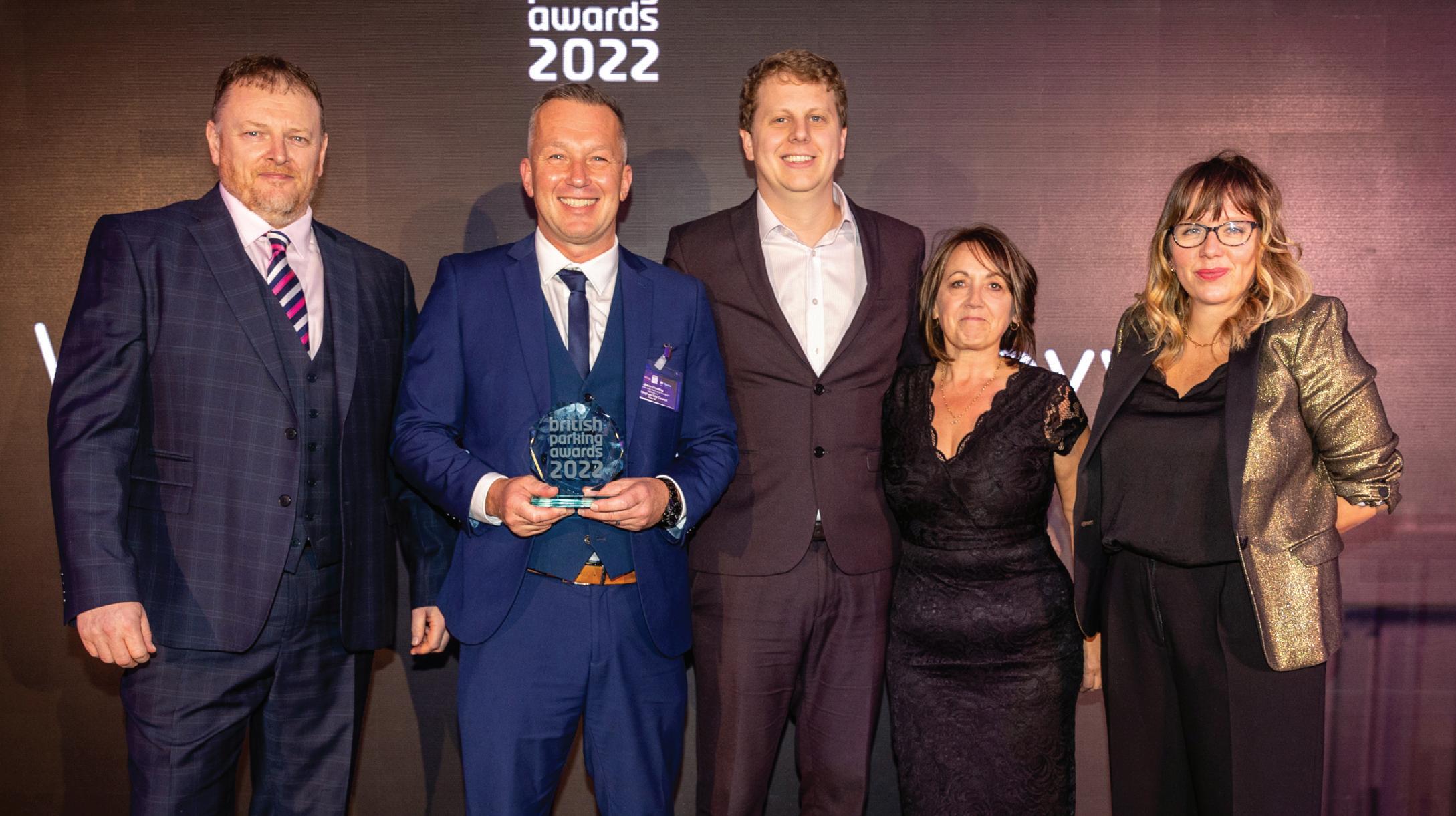
Awarded Go Ultra Low City status in 2016, the WPL is the cen-
trepiece of the council’s transport strategy. The projected income over the life of the WPL scheme in Nottingham is £360m. By law, revenue generated from a WPL scheme must be ring-fenced for the delivery of Local Transport Plan policies and objectives. The additional revenue comes at a time of austerity and shrinking grants from central government, providing a vital source of revenue for investment in to encouraging a “green economy”.
Gooding says: “The reliable WPL funding stream has allowed Nottingham City Council to borrow and match fund to access grants, securing a further £200m of investment that has delivered one of the largest fleets of electric buses in Europe and the world’s largest fleet of bio-gas double decker buses.”
Investment has been made in cycling infrastructure, providing bike lanes and secure parking. Meanwhile Citycard Cycles is a 24 hour bike hire service funded by the WPL.
The WPL package of transport improvements has created jobs, infrastructure and investment. Over £100m has been invested back into Nottingham businesses through contracts generated by the tram and Nottingham Station construction works, with the tram extension scheme alone employing 1,200 people.
Academic evaluation has concluded that the WPL scheme has constrained the rate of congestion growth. Gooding explains: “Discouraging car use reduces the need for parking space; releasing valuable city centre land for other uses, such as green space as well as new residential and commercial opportunities.
For example, Nottingham Trent University repurposed land previously used for parking before the WPL was introduced.”
As a result of the WPL and the wider infrastructure investments it allowed, Nottingham was the first English city to have its Air Quality Action Plan approved by the UK government and avoided the need to impose a charging clean air zone.
Nottingham’s WPL is a highly effective parking and transport policy which, through careful planning and development and working collaboratively with local businesses, has been able to overcome the challenges faced when delivering wide-ranging transport infrastructure improvements.
John Galsworthy
A Parking Rosette was awarded to John Galsworthy for his pioneering work on the use of data.
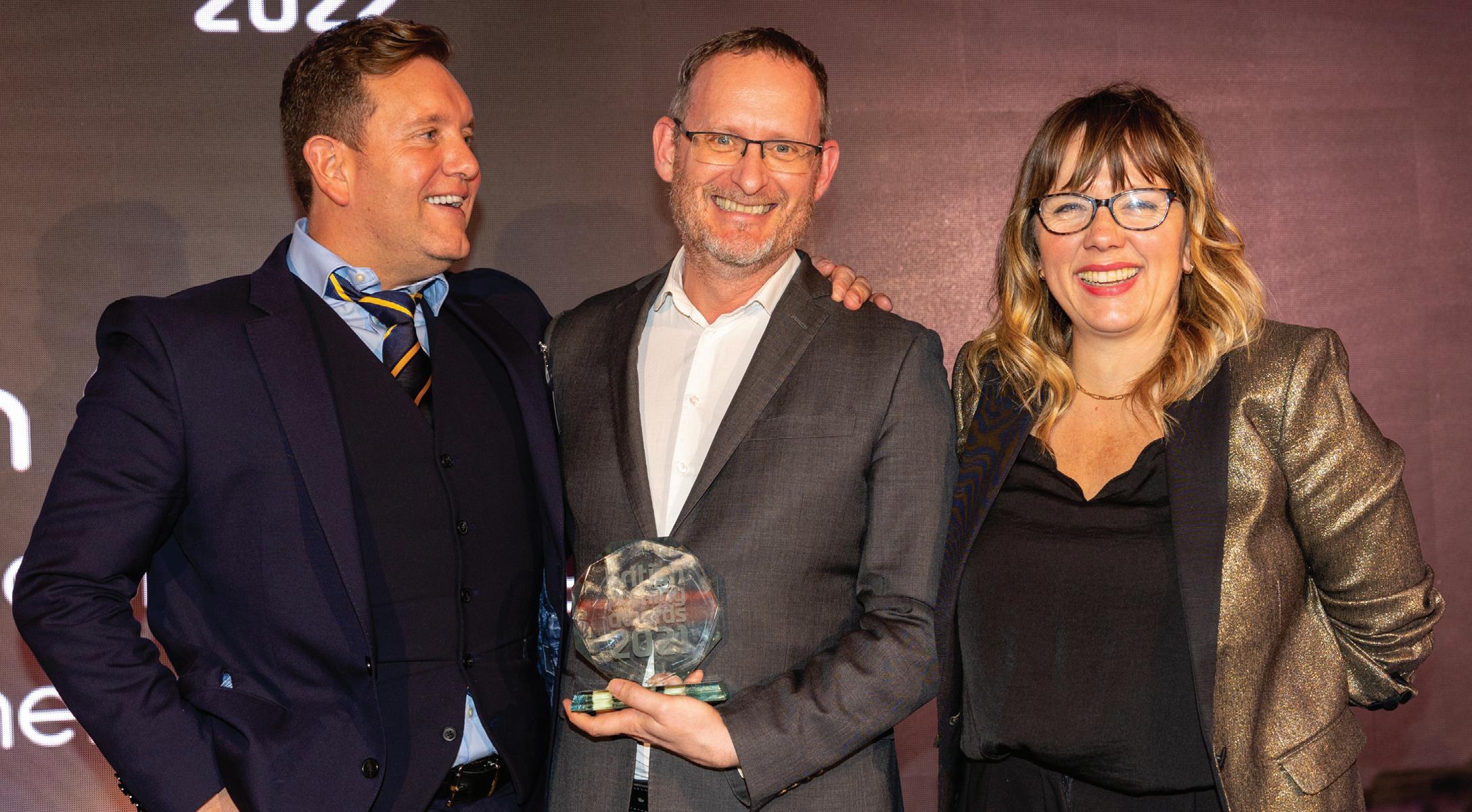
With over 25 years of experience within the parking sector, John Galsworthy has played a significant part in shaping the industry through collaboration with partners, residents, and road users alike. He has pushed the boundaries, bringing in new technological initiatives to the industry that became the norm years later, from first introducing ‘e-parking’ 20 years ago, to clean air and traffic reduction schemes introduced in west London.
Galsworthy started his career in transport and parking at Camden Council in 1995 and has remained focussed on the importance of data to inform intelligent decision making. This approach was deepened throughout his time at Islington Council, where in 2019 he spearheaded working with Google to map out the borough’s assets. In his current role as assistant director for parking services in the London Borough of Hammersmith and Fulham (LBHF), his vision has directly led to the reduction of 8,000 vehicles and more than 8,000 tonnes of carbon per year from the local network. This, in turn, has had a direct relationship back to improving educational achievement, life expectancy and social value outcomes for communities in LBHF.
Hammersmith and Fulham’s initial deployment of air quality monitoring (AQM) sensors is the densest deployment in Europe and the largest network in a city environment in the world. The AQM network helps the council to understand sources of pollution entering the borough as well as pollution generated within the borough. This enables LBHF to make informed decisions based on real-world evidence and assess the impact of those decisions.
Award sponsored by
When combined with other data, it can manage traffic in realtime and develop dynamic traffic and parking policies, moving away from a ‘broad brush’ approach that targets a wide range of traffic and parking types.
Galsworthy’s data-driven strategy is now delivering outcomes for stakeholders and residents further afield. He recently commissioned a region-wide assessment using data science to see the breadth of impacts and drivers for traffic and, therefore, emissions across Greater London and how locally made decisions in LBHF can affect the city as a whole. Commissioning dashboards correlating previously disparate data sets to measure relationships between compliance, air quality and vehicle movements has provided insights in to the way in which authorities can interact with and use data to deliver transport strategy.
Bram Kainth, LBHF’s chief officer of public realm, says: “Over the last few years, John has proven and demonstrated to be a very forward thinking innovative and inspiring strategic leader and manager. He has clear vision to future proof the parking service over the next ten years.”
Mark Fanneran, LBHF’s head of service development, says: “John provided our service with a clear vision for the future: to be a service which tackles air quality issues head on and provides innovative technical solutions for all those who drive and park in our borough. John encourages his colleagues to make changes which ‘move the needle’, to take calculated risks through the introduction of new technology that improves service delivery.”
Andrea Jones, director of strategic accounts, Marston Holdings, says: “John once said to me that he will be the person people won’t even realise has left a legacy of safer streets and cleaner air, and that is how he happy to ‘not be remembered’. This nomination is testament to the fact that we do recognise his contribution and that needs to be celebrated.”
Throughout his career, John Galsworthy has delivered a transformative approach in how parking data and policy can come together to support altruistic outcomes for London and its residents, benefits that extend beyond transport as they support real improvements in public health.
New market entrant EFIPS wants to transform the off-street sector by running parking as an experience.
Ethos Farm is a global customer experience consultancy that made a name for itself designing and delivering service strategies and front line customer operations for superbrands including British Airways, Heathrow Airport, Irish Rail and LaGuardia Airport New York. It has now entered the parking sector with a new company called EF International Parking Services.
EFIPS runs the car park management contracts at Westfield London and Westfield Stratford City, Europe’s largest and second largest shopping centres with approximately 10,000 parking spaces between them.
Westfield London and Westfield Stratford City’s estate managers, Michael Nicholson and Chris Mitchell, say: “In late 2021, Westfield underwent a competitive tender process for the car park management contract at both UK sites inviting the incumbent, NCP, and other competitive bids from car park operators. It was our desire to elevate the customer experience in our car parks. With that in mind we included, what some might have considered a ‘wild card’, Ethos Farm, the business that runs our guest services operations and their subsidiary company EF International Parking Services. We had seen the work that Ethos Farm was delivering for organisations around the world – the transformation of New York’s LaGuardia Airport and the service scores at Heathrow. From the point of announcement we saw a marked change in the team who would ultimately TUPE transfer over.”
Sally Alington, EFIPs founder and chief executive officer, says: “Although a new face to the industry, we know that EFIPS is set
Award sponsored by
to be a positive disruptor, bringing customer & employee-centric strategies and the associated target operating models and governance structures to car park management. The markets we serve at both car parks range hugely from guests who have come to enjoy our retail, leisure, entertainment and food and beverage offering inside the mall, to those who come for special events at the Queen Elizabeth Olympic Park or the Exhibition London.
“We have local residents who use our car parks for long term storage of their vehicles and, in line with our collective focus on sustainability, we now have an electric vehicle partnership with Tesla where guests can visit our in-car park showroom and enjoy a test drive. We offer car-rental through Sixt, our own inhouse valet parking service, car valeting with H20, car wrapping and redesign with Atelier Automotive Art and have many more commercial partnerships in place.
“We know some guests see Westfield as a pillar and focal point of the community and specifically come to us by car to spend some time with friends and family. Moreover, we have aimed to really become a destination that is recognised as being one of the most accessible anywhere in the UK and, as you will discover further on, the work that we have done to support guests with physical and non-visible disabilities is significant. For those who find the shopping experience challenging, we know that offering a totally accessible car park is the first opportunity to gain the trust and loyalty from guests who need a little extra support.
“We actively monitor the guest profile at both Westfield destinations through customer interactions, proactive monitoring of all feedback channels and exit surveys conducted in partnership with CACI. In doing this we get to understand more about the ACORN profiles of our guests, catchment areas for drivers and how we can continuously improve for our customers.”
With roots in the world of customer experience, EFIPS has recognised that car parks offer the first and last impressions that visitors have of a destination. The jury were impressed by the company’s use of data and surveys to understand and improve the parking experience it delivers.
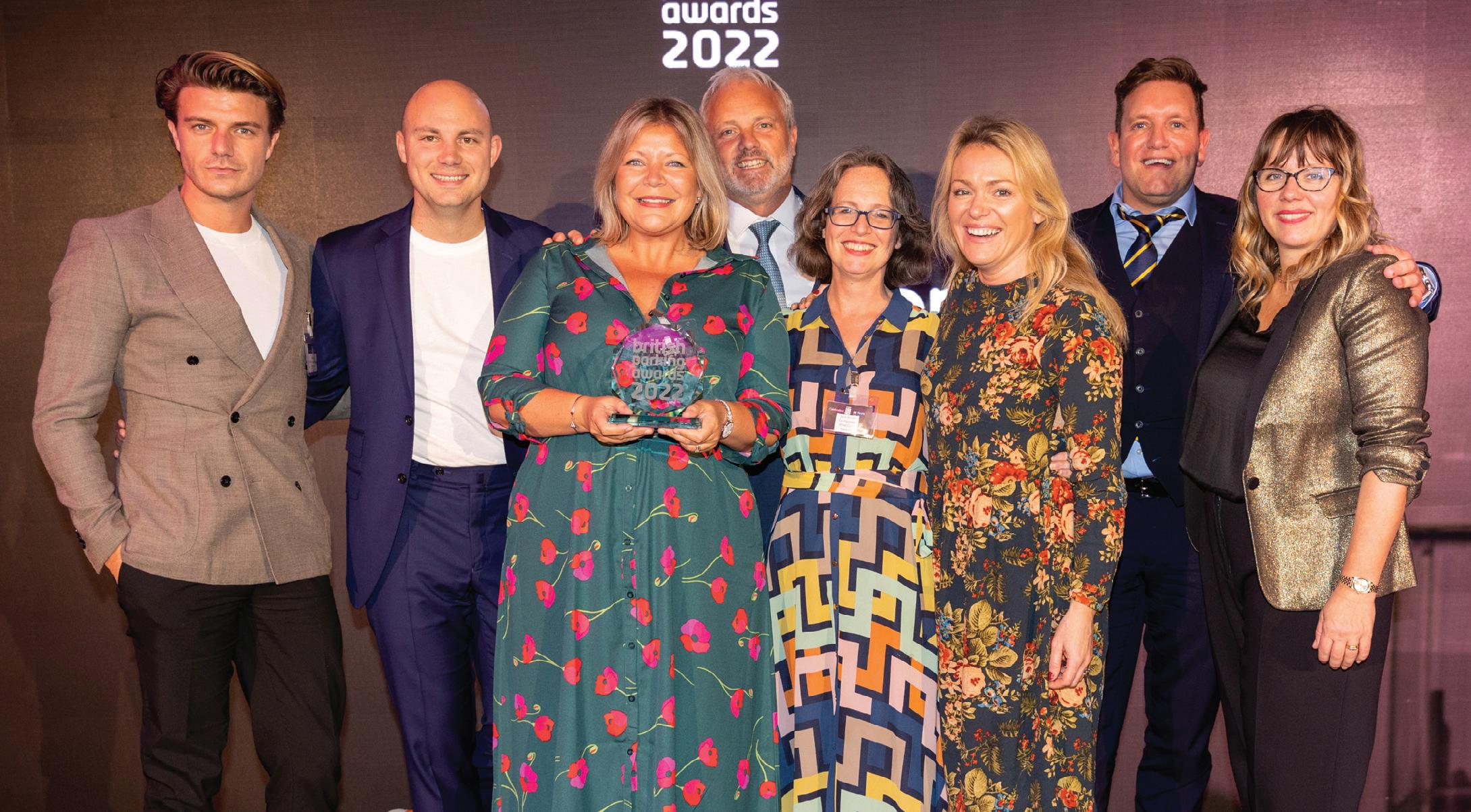
Dan Hubert received a Parking Rosette for rethinking how harnessing data can transform street parking.
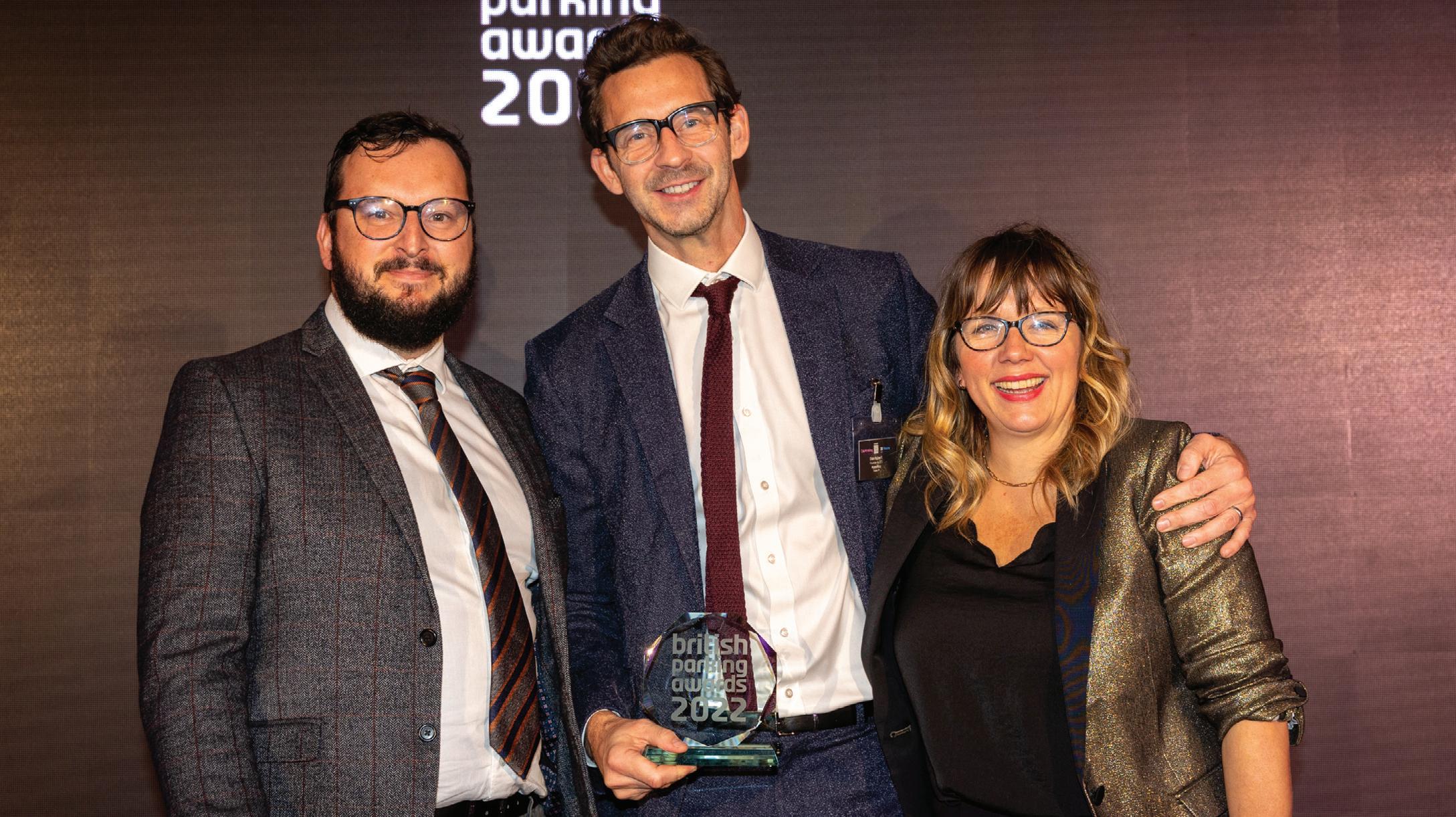
Dan Hubert is self-taught across the parking spectrum. Having studied at Central St Martins in Art, Design and Advertising, and spending some years in the advertising world, he learned how to raise capital investment, create a business and work with local governments to navigate the intricacies of regulation and unlock the potential of creating a digital kerbside.
In 2013, after a less than favourable experience parking in London, Hubert decided to create a London driver app to show where you could and could not park. He soon realised that no data was available. However, instead of giving up ,Hubert took to his bike and cycled around the whole of London mapping over 1,500 controlled parking zones. After six months he had enough data to launch the Yellow Line Parking app, but knew he could not be responsible for maintaining such a large dataset.
It was then he embarked on a mission to raise investment and build a parking platform where the data was maintained by the managers of the kerbside – local authorities. Nearly 10 years on and AppyWay’s platform is recognised as the industry leading solution to connect cities to vehicles via one API (application programming interface). The platform possesses a dataset of digital traffic regulation orders (TROs) that simplifies the parking rules of over 110,000 parking signs into single ‘yes’ or ‘no’ answer for drivers.
Hubert’s work has drawn admiration from across the parking and transport sector. Sunil Budhdeo, transport innovation manager

Award sponsored by
at Coventry City Council, says: “Dan and I have worked together on numerous occasions over the years on a number of innovative parking projects. It’s been thrilling to watch Dan on his quest for better parking data and the better management of parking data. His sheer determination to improve things for local authorities and for drivers has resulted in innovative solutions that are being used up and down the country. It’s been a pleasure working with Dan and the wider AppyWay team and I look forward to collaborating with Dan in the future.”
Paul Campion, chief executive of TRL, says: “A lot of people talk about the future of transport and how we need to revolutionise parking: Dan gets on with making it happen. Dan has been tirelessly pursuing a vision of how we can do parking better for years and the company he has built is a leader in real-world, installed parking solutions. But not content with just making life better for drivers and parking operators, Dan sees a whole new world of intelligent kerbside management that reflects the way that society is adopting new technologies and ways of working. If you ever wanted to find a way to safely and efficiently support and monetise the new ways of travelling and delivering goods that we see happening around us then Dan’s yer man!”
Anthony Ferguson, deputy director, traffic and technology, Road Strategy Directorate at the Department for Transport, says: “Parking needs disruptive forces and Dan Hubert has been a force for change. His creative and dynamic approach has already delivered concrete successes, such as the project in Harrogate. In his dealings with the Department, Dan is stubbornly persistent but in a charming way, and as a result he is always a positive and valued contributor to policy discussions about things that really matter like digitising TROs and making the kerbside into an asset to be managed rather than a headache.”
Dan Hubert’s commitment and passion for the industry is clearly displayed by his contributions to a range of initiatives. Over the past decade he has emerged as a thought leader who works across the public and private sector, championing the smarter use of data to improve driver experiences.
Barry Johnson and his team at Taranto Systems have embraced cloud-based approaches to service delivery. Having begun writing software as a teenager, in 2000, Barry Johnson and a group of colleagues formed a business called Traffic Support which focussed on developing parking enforcement software. Today, Johnson leads a team of more than 25 software developers at Taranto Systems. They are focussed on delivering innovative technology solutions that support the enforcement and management of parking and traffic contraventions, parking permits, civil enforcement, clamping and removal, and more.
Over more than 20 years, Johnson has established himself as a true industry leader. In recent years his career reached yet new heights as his work underpinned the delivery of the world’s first low emission zone (LEZ) in London, and supported its subsequent successful expansion into ULEZ in October 2021.
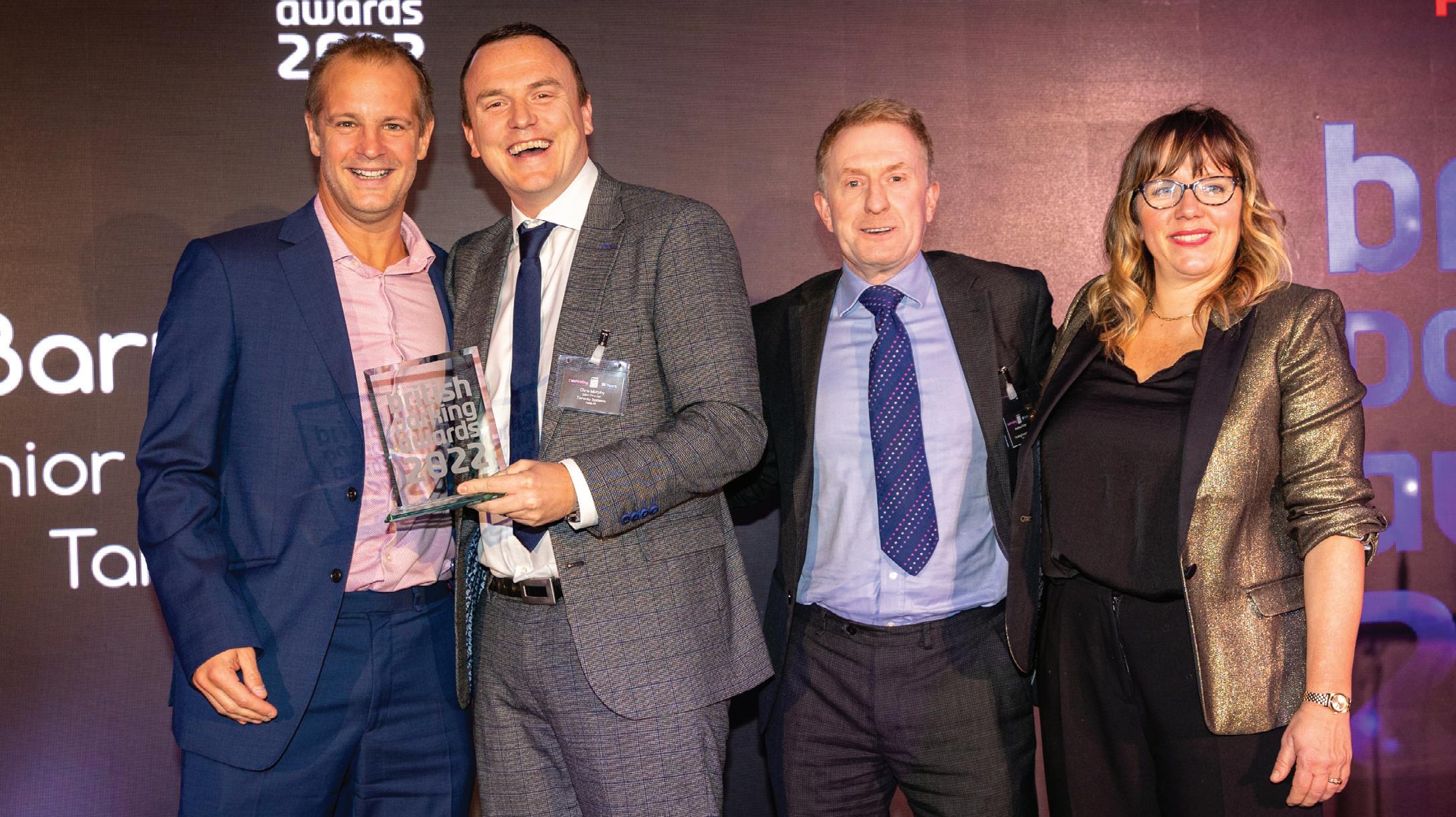
Johnson had the vision for, and led development of, Taranto’s next generation True Cloud Parking as a Service (PaaS) solution, a new technology platform designed to unlock significantly greater scale and improve access to new functionality. Taranto PaaS was originally conceived in response to the requirements for the expansion of London’s ULEZ because it offered a framework upon which applications could be built, with all servers, storage, and networking managed by a third-party provider (Microsoft Azure). PaaS was chosen over other forms of hosted delivery which would not offer the same level of benefits.
One potential ‘stop gap’, moving to an Infrastructure as a Service (IaaS) model, was rejected during ‘discovery’ as, while it may have been less challenging to transition to, it would not offer
the benefits provided by PaaS. The PaaS solution has also helped to deliver specific projects such as London’s Direct Vision Standards and ULEZ, which are directly improving people’s lives by introducing new forms of safety and reducing congestion and emissions. Johnson has also led on the launch of .GOV structures as a framework for Taranto’s self-service permits portals, and extensive development of Taranto’s new solution for the Private Parking market.
Lewis Wray, managing director of Taranto Systems, says: “Barry constantly challenges the status quo, ensuring processes are reviewed and adhered to in line with the latest industry standards. His hunger for continuous improvement and focus on driving efficiencies within the industry pioneered the adoption of PaaS, as well as highly innovative modules such as Fleet Bureau, Permits, and Blue Badges. He works hand-in-hand with clients to ensure solutions meet local needs and is held with utmost respect in Taranto and across its client base.”
Barry Johnson has been at the forefront of parking enforcement technology for two decades. His hunger for continuous improvement drives those around him; promoting the adoption of new technologies to maintain the integrity, security and future appeal and usability of solutions.

Sarah Randall
Sarah Randall, assistant director at London Borough of Newham, was named Parking Person of the Year in recognition of her championing of new technologies and smarter ways of working.
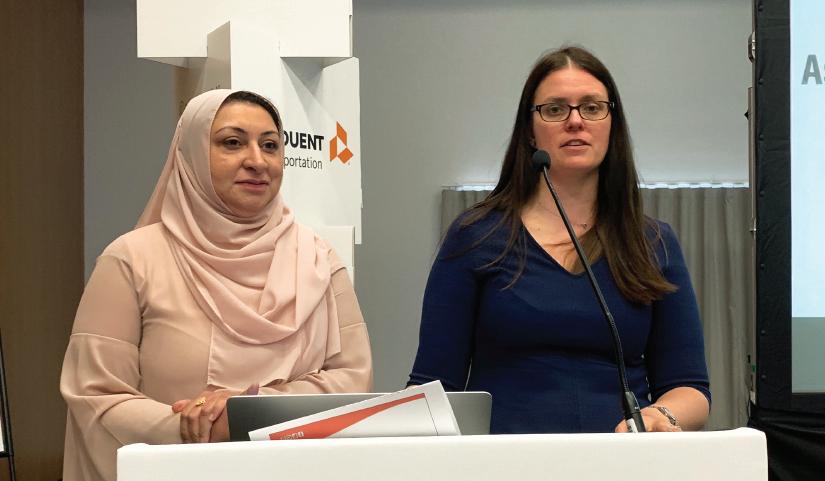
Sarah Randall has been in parking since 2008, starting in Croydon Council as the general manager of operations. She moved between operational, policy and performance and infrastructure, before become the parking manager and then head of parking for Croydon. During her time at the south London borough Randall oversaw the development of innovative school street schemes. She also led parking policy and strategy for addressing the organisation’s Corporate Plan and Clean Air Strategy, the London Mayor’s Road to Zero Strategy and Transport Strategy.
Randall joined the London Borough of Newham in 2021 during the COVID pandemic as the assistant director for parking and traffic. At Newham she has gone back to basics to ensure that policy and procedures are documented and followed. In particular the car pound has cleared a five-year backlog of over 500 vehicles. The traffic and parking team outperformed expectations by £2m during her first year in post. There have also been improvements in service delivery, with response times for penalty charge notices reduced from over 56 days to just five days.
She is currently overseeing the roll-out of school streets across the borough. Since the introduction of the first phases of the ‘Healthy School Streets’ and low traffic neighbourhood (LTN) schemes, air quality monitoring outside 99 schools showed an

Award sponsored by
average 8% reduction in NO2 with a traffic reduction scheme in place compared with schools without a scheme
Randall collaborates with various governing bodies and organisations looking for efficiencies, challenges traditional practices that may benefit the wider parking sector. She regularly speaks at conferences and seminars, and plays an active part within the British Parking Association and chairs the Technology Transformation Forum, whose main projects involve the process of creating, issuing and implementing of parking standards and the National Parking Platform.
Randall has a wealth of experience and leadership qualities, which she has complemented via qualifications such as PRINCE 2 Foundation and Practitioner and is scheduled to undertake PRINCE2 Agile. She is also working towards achieving her AAT (Association of Accounting Technicians) course.

Her colleagues provided excellent testimonials. Project manager Bruce Lazaro says: “Sarah has consistently demonstrated excellent leadership qualities throughout her career. She is a successful, confident and powerful female leader who balances compassion and competence with officers of different levels.”
Daniel Oates, general enforcement manager, says: “Sarah is an excellent leader in a challenging and complex environment, with a well-developed leadership toolkit and the ability to relate effectively with employees at all levels. She really cares for the wellbeing of those employees. She brings a high integrity approach to all aspects of her work and is a difference maker. A valued member of any leadership team, she demonstrates a strong commitment to results, terrific business acumen and great insight into the workforce. Sarah understands that you need to understand the system in order to solve a problem, and not just focus on immediate issues at hand.”
Sarah Randall has gained a high level of respect from fellow employees and the various tributaries of the parking society. She achieved this by her hard work, consistency, an open-minded approach and commitment to collaboration, which in turn has gained her trust from others.
Carol Gibson has become Lewisham Council’s much valued ‘go to’ person on all things parking.
During a career spanning nearly three decades Carol Gibson has made the journey from office temp to running contracts and developing highly regarded training schemes. Gibson joined Lewisham Parking Services as a temp but soon made it her permanent workplace. In the 28 years since then she has taken on various roles such as representations and appeals officer, parking contract monitoring officer and senior supervisory positions. Most recently she has taken up a post of senior parking operations officer.
Parking services manager Kyki Kim-Bajko, says: “Carol has always been an incredibly reliable colleague, always willing to go above and beyond the call of duty for all stakeholders. She has worked relentlessly to achieve the milestone from an appeals officer to her current role as a senior parking operations officer.
“Being a strong team player, Carol has trained newcomers into the business and helped to build an excellent pool of talent. Over the years, she has played an instrumental role in keeping the team spirit up through strength and resilience in some of the toughest periods, inspiring her colleagues in the service as a true role model. It is a pleasure to work with such an inspirational and strong female colleague in a highly male dominated industry and we hope this award will inspire and motivate many of our fellow female colleagues in the industry for the years to come.”
Gibson has become the ‘go-to’ person for most things parking, meaning she receives daily enquiries from offices throughout the council who go to her for experience, information and advice.
“Carol has never been afraid of going the extra mile to help others or to complete tasks at hand,” says Dorota Lejman, senior parking operations officer. “She provides exceptional support and service to staff and contractors she works with. She quickly recognises their individual needs and moves efficiently to provide key information, recommendations or directions.
“Beyond this, she is a very caring individual and is committed to provide opportunities for further development to others. Only recently she single-handedly developed and delivered a series of training sessions to our contractors aimed at broadening their understanding of parking issues. Needless to say, these proved to be very successful.”
Liz Brooker MBE, road safety and sustainable transport manager, says: “I have had the ‘pleasure’ of being part of the Parking and Road Safety Team. During this time I witnessed first-hand the commitment Carol shows to the parking profession. She displays a passion and commitment to parking services with a forthright, no-nonsense approach.
“Despite the last two years being hard on everyone, Carol has been a valuable support to me and my team. A staggering 37 school streets have been delivered in an 18 month period. The majority are enforced by ANPR. Carol has helped to ensure the school street enforcement is working as it should. When a problem arises she will help to find a solution. Carol has certainly helped me to understand the role parking has in day-to-day council work. She is a font of all knowledge when it comes to Lewisham and the parking services.
“Carol is Lewisham born and bred, she has supported many colleagues sometimes as an ally, sometimes as a critical friend, but always with a passion for delivering the best outcomes for the council.”
Carol Gibson has demonstrated an extraordinary commitment to Lewisham Council, as well as to the residents and general public. Carol’s skills, knowledge and her willingness to help others make her a worthy recipient of the Lifetime Achievement Award.


Jake England, group operating manager of NEPP, is a young man forging a promising career in parking.
The North Essex Parking Partnership (NEPP) is a body that brings together the parking operations of six different local authorities.
Jake England joined NEPP in 2013 as a civil enforcement officer. Since then, he has held various positions across the service – in the business unit as a specialist where he helped improve business processes and data clarity, then helping out during a later secondment to area manager of the West Area for NEPP operations.
England then attained the post of operations manager of NEPP’s new Data Led Services (DLS) team. The DLS team was created to effectively utilise innovative technology to gather data and information from various sources and analyse the results to identify areas where optimisations and improvements can be found. He initiated the use of Power BI and Power Automate to design, extrapolate and analyse information from multiple sources including Park Safe, bay sensors, car park occupancy and back-office statistics. A vast amount of anonymised data and information is generated through operational activities across the partnership, and even more will become available in future.
England led development of the Park Safe initiative, including adopting electric vehicles for patrolling and the use of static cameras. He has managed and developed the 3PR safer school streets scheme across the NEPP area, while also initiating and developing the partnership’s Revenue Protection Service to tackle permit, season ticket and Blue Badge fraud.
England was promoted to group operating manager in March 2022, and all whilst studying at university. He is planning to take
on additional training and development and is currently undertaking a Chartered Management Degree as an apprentice.
Richard Walker, NEPP group manager, says: “Jake has a capacity and outlook on business that belie his years; a wise head on young shoulders. I am pleased that he has been able to support the service throughout the recent transformation. He has a keen eye for detail and demonstrates genuine care, often going the extra mile to support his colleagues. Jake is always ready to take on a new challenge and helped secure our new operating agreement with the county council. Part of this includes work on staff communication through Teams and SharePoint, setting up appropriate technology to help internal communications.
“Keen to create an even better culture, Jake is now working on the NEPP future vision, brand values and communications as part of our next development plan. Jake is a truly inspirational gentleman, and undoubtedly a future leader in the making. I’m certain that our partnership will be in safe hands long after my own time here.”
Rory Doyle, assistant director, environment, Colchester Borough Council, says: “Across a directorate of 350 staff delivering vital operational local government services Jake stands out to me as an exceptional talent, someone I have no doubt will be a senior leader of the highest calibre in the not-too-distant future.
“Jake is an enabler, someone who is passionate about developing others. He is caring and empathetic and his people management and communication skills are exceptional for someone so young. Our people and our organisational culture are so important to us in NEPP. Jake is playing an instrumental role developing the future vision for the business, developing our brand, and everyday demonstrating and articulating the values we hold dear. He is an authentic young man, a pleasure to work with and a true rising star.”
Jake England is a young man who works tirelessly to deliver better outcomes for communities across North Essex, and is also emerging as a confident advocate of best practice in the wider parking sector.

Oxfordshire County Council
Oxfordshire County Council crafted an effective launch campaign for new Special Parking Areas.
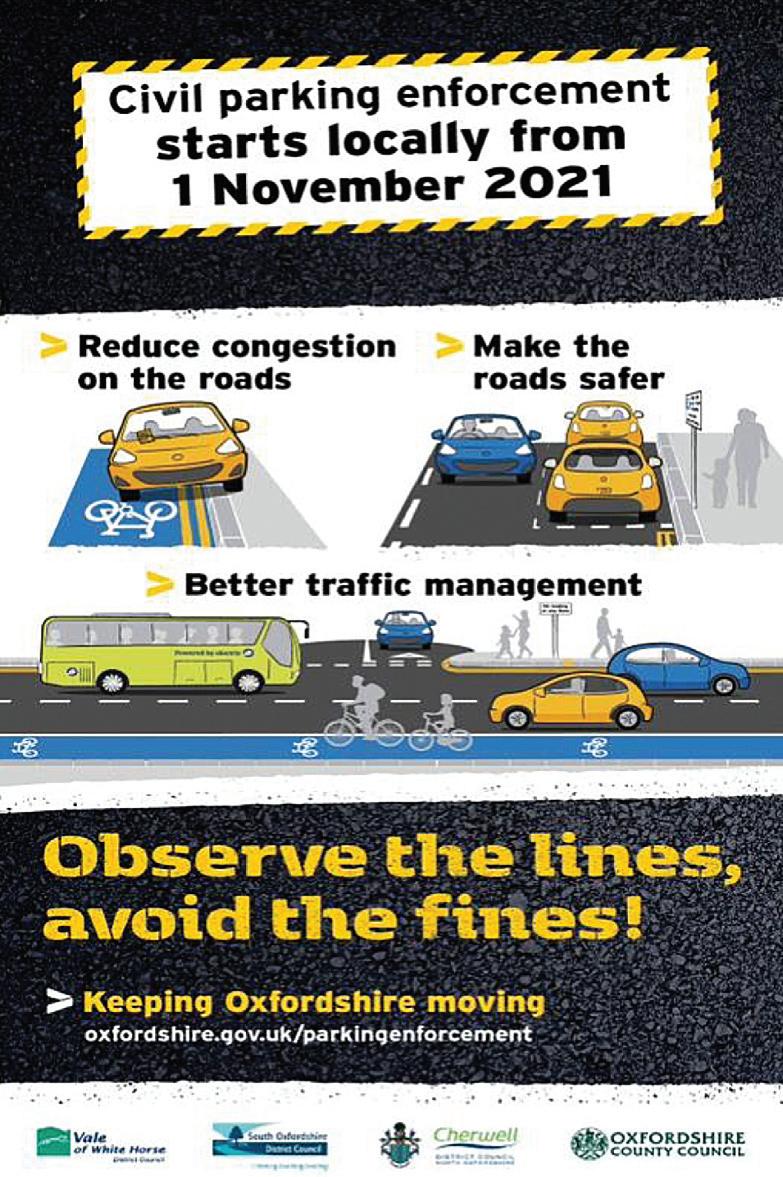
In December 2020 elected members at Oxfordshire County Council approved the commencement of a new application to the Department of Transport for the authority to take on powers for civil parking enforcement in the remaining districts of Cherwell, South Oxfordshire and Vale of White Horse.
The Special Enforcement Areas (SEAs) received approval in April 2021 and the new enforcement regime came into effect in November 2021. From the outset, officers and members placed great importance on raising awareness of the move to civil enforcement and the need to challenge pre-existing behaviours.
Parking enforcement manager Jim Whiting says: “Our communications strategy set out to promote the clear benefits of civil parking enforcement. Our objective in developing the media campaign was to ensure that the core message was clear and a simple slogan was chosen: ‘Observe the lines, avoid the fines.’”
A working group represented by Oxfordshire County Council and the district councils for Cherwell, South Oxfordshire and Vale of White Horse was put in place to monitor the project and make key decisions. During the campaign, the regular input from the working group ensured the core message was targeted in the right areas. There was also close working with partners such as Thames Valley Police and contractor Conduent Transportation.
The marketing and publicity campaign was coordinated through internal marketing and press teams at Oxfordshire, with the support of teams at the district council level.
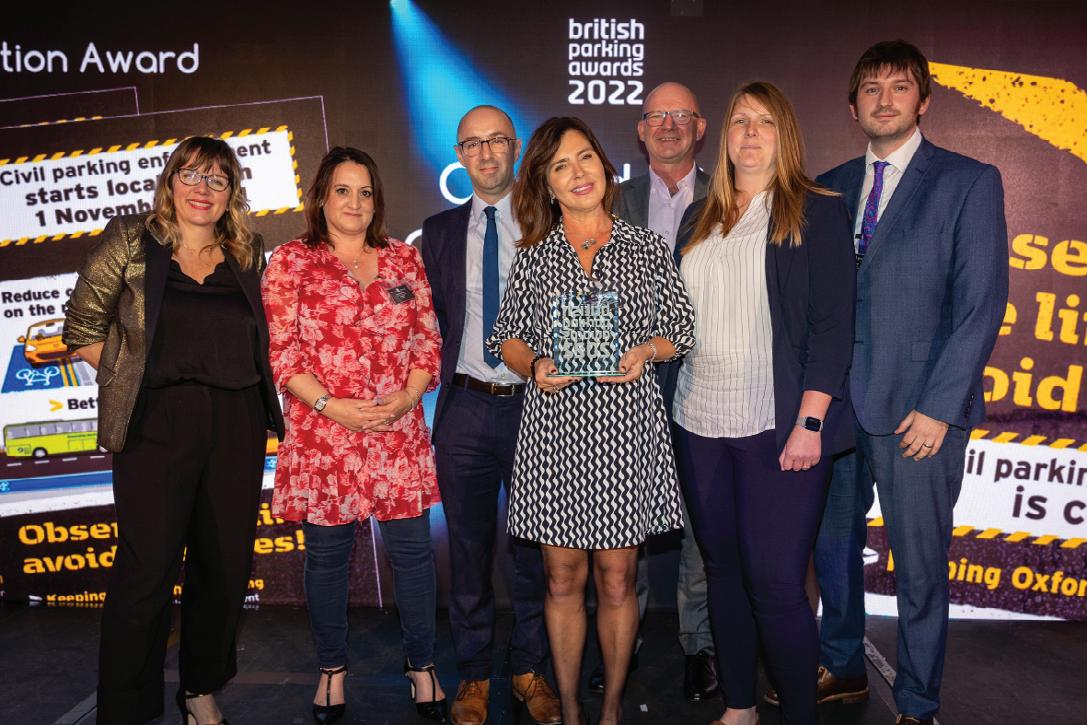
Award sponsored by


The campaign included countywide coverage and communication exercises reaching over 1 million users through various media channels, including direct communications (leaflets, warning notices), social media, TV and radio advertising and site placements at key locations (bus stops, petrol stations, supermarkets).
“A transparent and open approach to rolling out civil enforcement meant very few complaints were received throughout the transition to civil enforcement,” says Whiting. “An extended period of using warning notices and heightened publicity at launch, reinforced the message that civil enforcement is needed to better manage the road network, not to generate revenue. The county has maintained its communication exercises after launch supported changing of behaviours with month-on-month improvements in compliance with restrictions.”
Oxfordshire’s interaction with users throughout the campaign helped to highlight areas where the public was most concerned about parking contraventions. Building the campaign around a single slogan helped send a clear message that was easy to understand across different media.


Conduent Transportation is delivering decriminalised parking enforcement for Oxfordshire County Council.
Conduent Transportation’s enforcement contract for Oxfordshire County Council has followed a different approach in the county’s district areas. Some of these areas have not seen much or any enforcement by the Police for some time, so the team recognised that reaction to enforcement would be mixed. There would be those that embraced the need for parking control and there would be those who personally benefitted from the absence of control and would therefore be resentful of enforcement.
In preparation for these divergent reactions the front line team, supported by the communication strategy of Oxfordshire County Council, went on a charm offensive to win over local residents, stakeholders, and the motoring public, through a period of onstreet interaction, leaflet distribution and warning notices.
A key success, which was initiated from listening to the feedback from the front line team, was to ensure the same individuals were deployed to the same districts and towns before and after the go-live enforcement periods. That allowed the front line team to demonstrate personal accountability for the delivery of parking enforcement whilst engaging with local representatives. There were a number of instances where individual team members regularly liaised with Town Council councillors and county councillors whilst patrolling the districts.
Conduent deploys some civil enforcement officers (CEOs)
Award sponsored by
straight from home to beat rather than requiring them to undertake unnecessary travel to and from the base, and deploys them in or around their home locations. Jade Neville, Conduent’s head of user experience, says: “The deployment of the same team members to the same areas is contrary to traditional operational practices. However, Conduent has complete confidence in our front line team to deliver enforcement safely and consistently. Having put the effort into pre ‘go-live’ engagement to educate local stakeholders, businesses and residents, the team were confident that when enforcement commenced it would not come as a surprise. A measure of this success is that there have been no ‘Code Red’ incidents across the districts over the seven months of operation.”
Training for the CEOs and wider team provided them with a set of competencies and standard processes to deal with, and alleviate, customers questions, issues and concerns. Ongoing training allows the team to continue to improve their skills and acquire new ones by enhancing their communication, listening and problem-solving abilities.
Neville says: “As part of both our initial and ongoing training, Conduent ensured that the team understood the importance of positive engagement with our customers… members of the public. Their role was not just about enforcing parking but taking on the bigger aspect of being ambassadors for Oxfordshire County Council and Conduent alike. Customer service and conflict management training were key to making this happen.”
The training was delivered using a blended learning experience. Neville explains: “By utilising as many learning delivery methods as possible – video, face-to-face, e-learning and practical – we are able to fill in any knowledge gaps left by approaches that were less than optimal for the specific topic or learner.”
Oxfordshire County Council adopted a creative and sensitive approach to the roll out of civil parking enforcement across the county, recognising the benefits of harnessing the local knowledge of Conduent’s front line staff, including local liaison with politicians and relevant stakeholders.
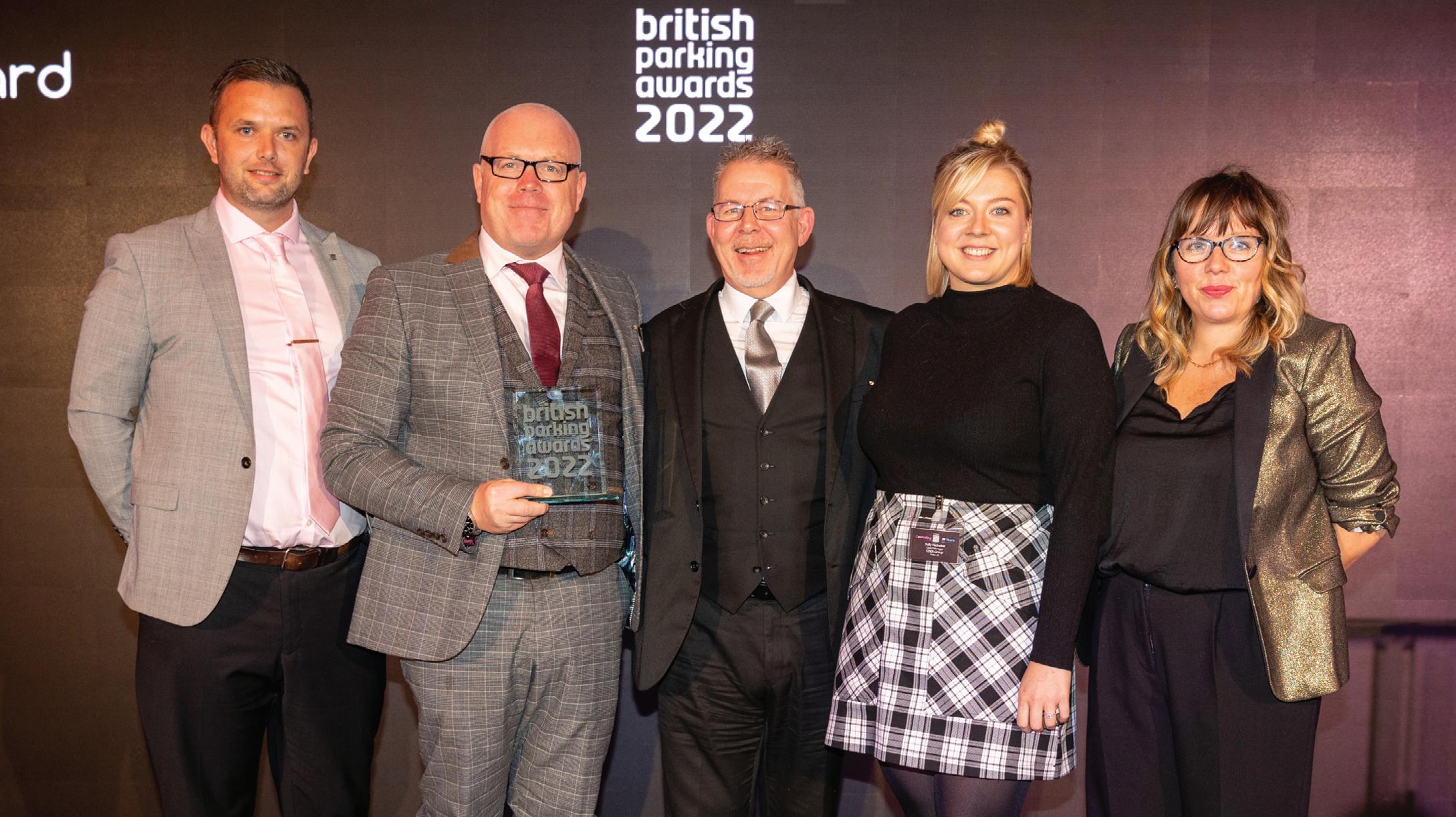
CDER Group’s welfare team works to alleviate the stresses faced by vulnerable debtors.
Operating across the UK, CDER Group provides enforcement and debt recovery services for over 100 clients, including local authority Parking Services teams and national transport agencies such as National Highways and Transport for London.
The company processes around 1.5 million cases and recovers £250m each year. Because customers with outstanding penalty charge notices (PCNs) may not interact with their local authority for other services, CDER Group is in a position to identify ‘hidden’ vulnerability because it sees a slightly larger proportion of vulnerable customers on parking and road traffic cases than Council Tax and sundry debts.
The company’s welfare team seeks to listen to vulnerable individuals and understand their circumstances. CDER thus coordinates support from creditors, welfare services, multi-agency safeguarding hubs and the advice sector to ensure immediate and long-term support required for people to experience lasting positive change.
The CDER welfare team is responsible for assisting in the identification of vulnerable customers. For instance, they review incoming letters, e-mails and calls from customers who claim that they cannot pay their debts or require support. If CDER’s propensity to pay modelling process – which is conducted immediately upon case receipt – identifies potential vulnerability indicators, the case will immediately be referred to the welfare team to review. The welfare assistants engage with customers to obtain
supporting evidence of vulnerability (e.g. proof of benefits, income/expenditure details, medical information). They then conduct assessments using empathetic questioning, reviewing evidence, and following CDER Group’s vulnerability procedures to determine appropriate action and support; The team provides guidance to vulnerable customers, for example, on how to access benefits and where/how to find specialist local support. They also help debtors assess their finances using their award-winning online self-help budget calculator.
The welfare assistants work with debtors to develop bespoke repayment and support plans, providing reasonable adjustments where necessary. They conduct regular reviews to ensure the plan reflects the debtor’s latest circumstances, and manage the case to successful resolution. The welfare assistants have authority to take payments, set up payment plans, place cases on hold, recommend assistance from the advice sector or return cases to the clients (following approval). Senior members of the welfare team also make free home visits to provide assistance and conduct assessments and host ‘Debt Surgeries’, both online and in-person, where they discuss suitable benefits, debt management plans and personal budgeting with customers. They also train contact centre staff on vulnerability considerations.
CDER director John Mason says: “We find that many of those who do not pay their parking or road user charging fines, simply cannot afford to, and struggle to make ends meet with barely enough money for food or for heating their homes. The pandemic and current cost-of-living crisis has exacerbated these issues, with 22% of the UK population currently living in poverty. Many vulnerable residents ‘slip through the net’ of local support networks/services. We are often first to come face-to-face with vulnerable people.”
CDER Group’s welfare team are the caring face of debt recovery, adopting a principled, ethical approach to recovering payment, supporting vulnerable customers and showing consideration, understanding and flexibility in addressing recovery planning.

Stansted Airport’s landside operations team makes sure car park users are cared for and kept safe.
The Stansted Airport landside operations team is led by Charmaine Sweeney, who has been control room manager for over three years, having previously worked in various roles at the airport.
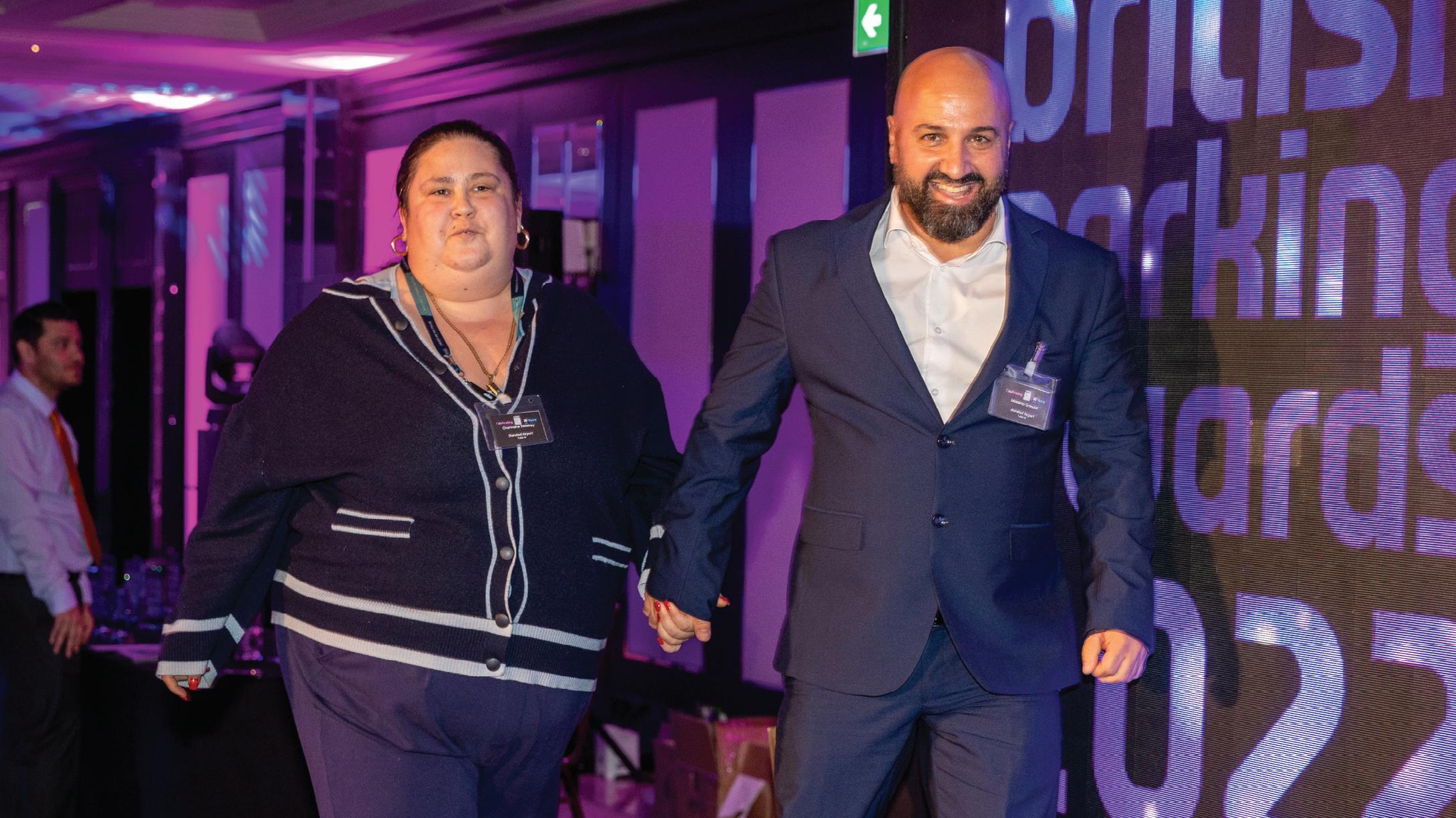
When Sweeney took over management of the control room, one of her first priorities was to unify five very separate teams. With the other key six teams at the airport codenamed after Ford cars, such as Cortina, Granada and Capri. The team chose to become identified under one banner and became Team Comet.
The role of Team Comet is to ensure the smooth running of one of the largest surface car park operations in the Europe – over 44,000 car parking spaces spread across 14 car parks that are in use 24 hours a day. This is achieved using the APT Skidata Sweb Control solution that links up over 330 devices such as intercoms, CCTV and parking systems.
Alongside overall responsibility for 16 team members in the control room, Sweeney also manages a team of 15 customer facing patrol officers in the car parks that are the first and last touch point for travellers. The team of control room operators and patrollers regularly receive commendations via Stansted’s Customer Feedback Channel where guests can comment on the service they receive whilst at the airport.
The airport sector was heavily impacted during the travel restrictions that were imposed during lockdown. The landside operations team ensured the successful management and maintenance of these critical assets during the lockdowns. With travel now
Award presented by
happening again, the role of the team has changed and evolved to include administrative roles and other aspects that would normally sit within other teams at the airport. For example, the controllers support a local resident scheme where the airport provides discounts to local people. The team originally simply responded to intercom calls from residents, but processes have been introduced where the residents apply for the discount scheme, ensuring the landside operations team have visibility of the entire process.
Sweeney regularly works as an airport duty manager, with responsibility not only of the smooth operation of the car park, but the airport itself. She says: “As a parking professional, I feel there is always something to learn. As a member of the British Parking Association I regularly meet the specialist airport group to share my experiences and to learn from industry colleagues.”
Taking over from a fragmented approach, the new Team Comet provides an integrated approach to running parking at Stansted Airport. There has been a real commitment to training and team building. This is proven by excellent testimonials that show the team is ‘going the extra mile’ for customers.



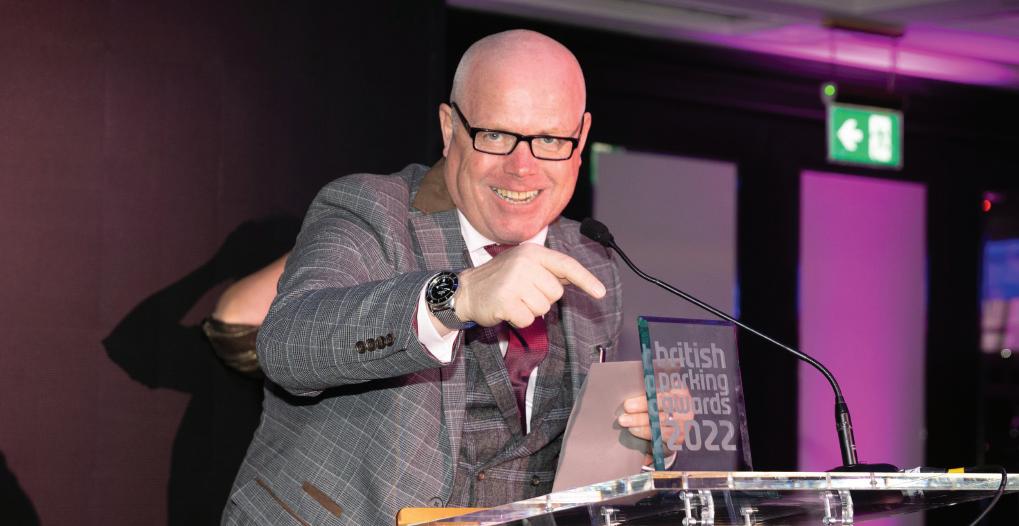




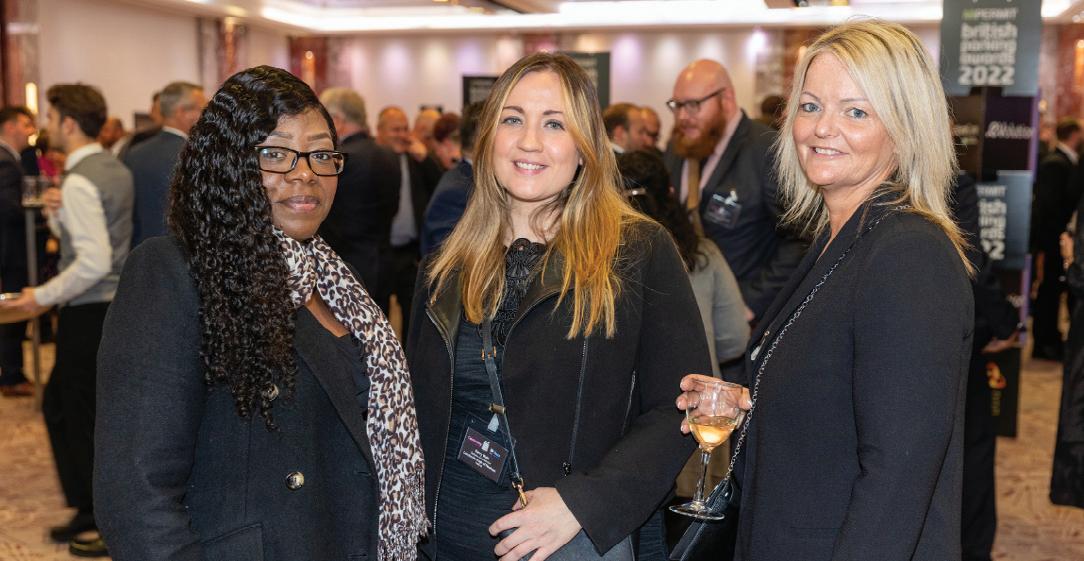





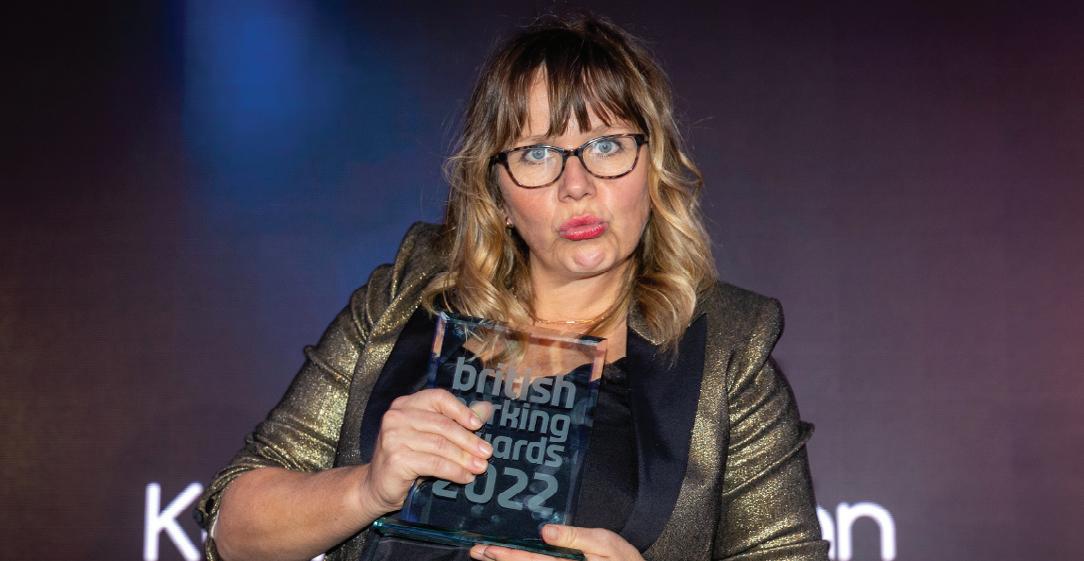
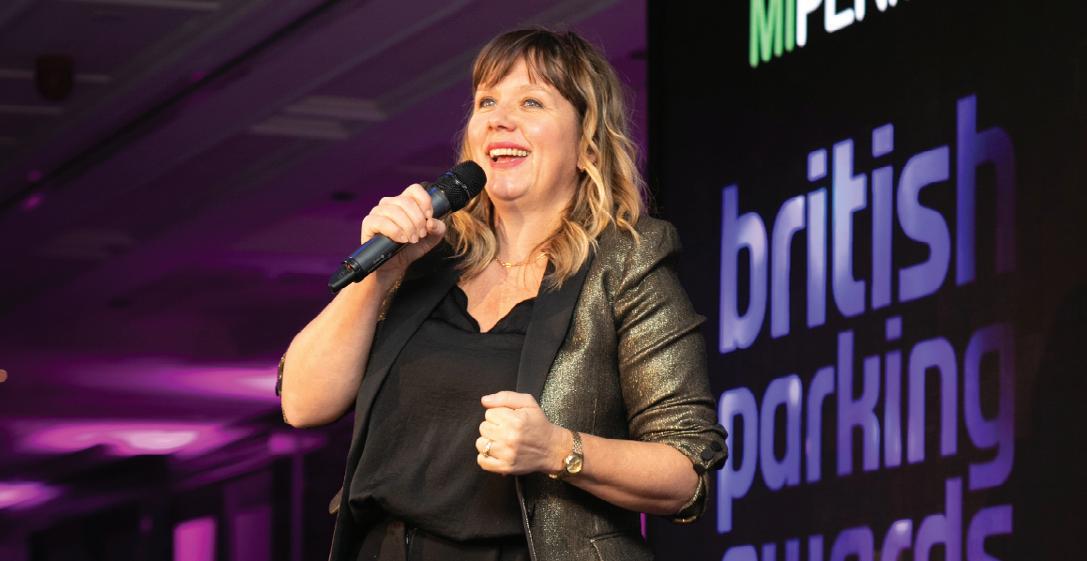

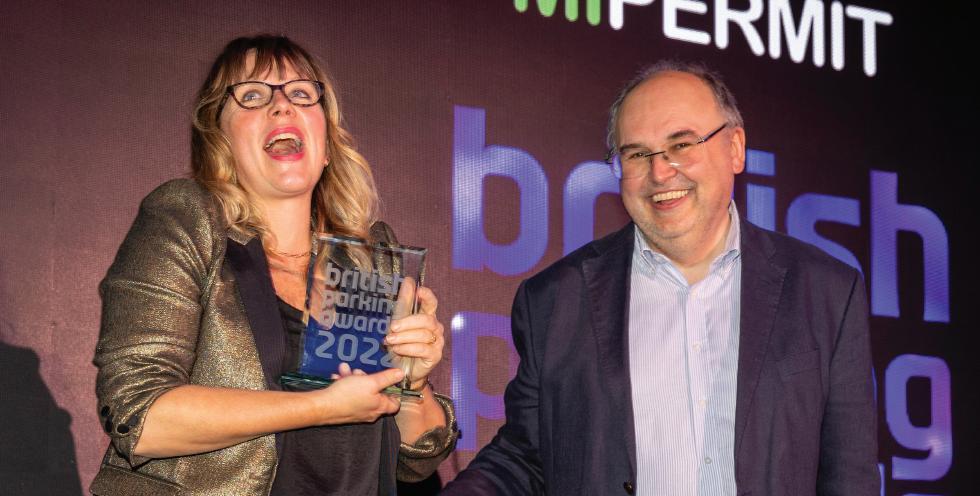


WSP Liveable Places traffic order team
Creating traffic orders is an often overlooked art which has been mastered by WSP Liveable Streets.
The WSP Liveable Places traffic order team brings together a wide range of specialisms including traffic engineering, public realm transport planning, road safety and parking to offer clients a one-stop shop service helping to drive forward transport’s contribution to the sense of place in an area.
Ollie Miller, technical director for Liveable Places, says: “The traffic order team is a large, highly talented and very hard working team within WSP’s transportation area. Relatively low profile and somewhat unsung due to the technical challenging work, the Liveable Places traffic order team plays a critically important role in the background, getting all kinds of high profile, important and neighbourhood transforming schemes on the ground quickly, legally, and safely. The team makes a real sustainable, and positive difference to the communities their traffic orders relate to.”
The traffic order team is led by Nishar Damhar, who has worked with Ollie Miller to identify opportunities for efficiency in the ways that the team delivered some of its work. The entire team was brought in to the change process so are positively committed to new approaches. For example, for the team’s work with Westminster City Council, Damhar devised reporting queries and various tracking spreadsheets, reports and minutes so that the team can more efficiently extract data on key performance to be reported to Westminster. While a seemingly small example, it has saved the team time and delivered an improved service to the client. Damhar also introduced an innovation spreadsheet
where team members can contribute ideas and suggestions for improvements which may streamline the service and/or cut costs for Westminster. To ensure there is tangible benefit in implementing any of the suggested innovation improvements, Damhar introduced a ranking system which considers a range of criteria, including cost and complexity, risk and dependency to identify those concepts that are most likely to be delivered.
The traffic order team adopted a collaborative approach that achieves the best possible outcomes. An example of this is from the team’s work on a Westminster City Council traffic reduction scheme in Covent Garden that aims to reduce motorised traffic, enhance the public realm, and improve public and road safety in the piazza and surrounding streets.
The team built positive relationships that were vital to delivering a high-profile traffic reduction scheme in the Covent Garden/Seven Dials area, advising the city council’s third party consultant designers and correcting signage within their designs to eliminate loopholes in enforceability which may otherwise have compromised the ability to deliver on the ambitions of the scheme. The team also liaised across neighbouring Camden’s traffic order service as the scheme was partly within its authority area.
The team’s expertise and collaborative approach has been praised by clients such as Helen Taverner, parking services at Reading Borough Council, who says: “The WSP Liveable Places traffic order team is a small, but perfectly formed, team who are able to support and advise across a range of traffic and parking projects. The support I received in applying for the new moving traffic enforcement powers was excellent, with the level of knowledge and understanding of the relevant legislation superb. Traffic orders are the golden thread that allow the implementation of restrictions as well as enforcement. This team understands how to make sure the sewing is perfect.”
The WSP Liveable Places traffic order team undertakes the legal and consultation work vital to the successful operation of parking schemes. The team is also increasingly involved in research projects that seek to improve the way in which parking is planned, which is a public good.
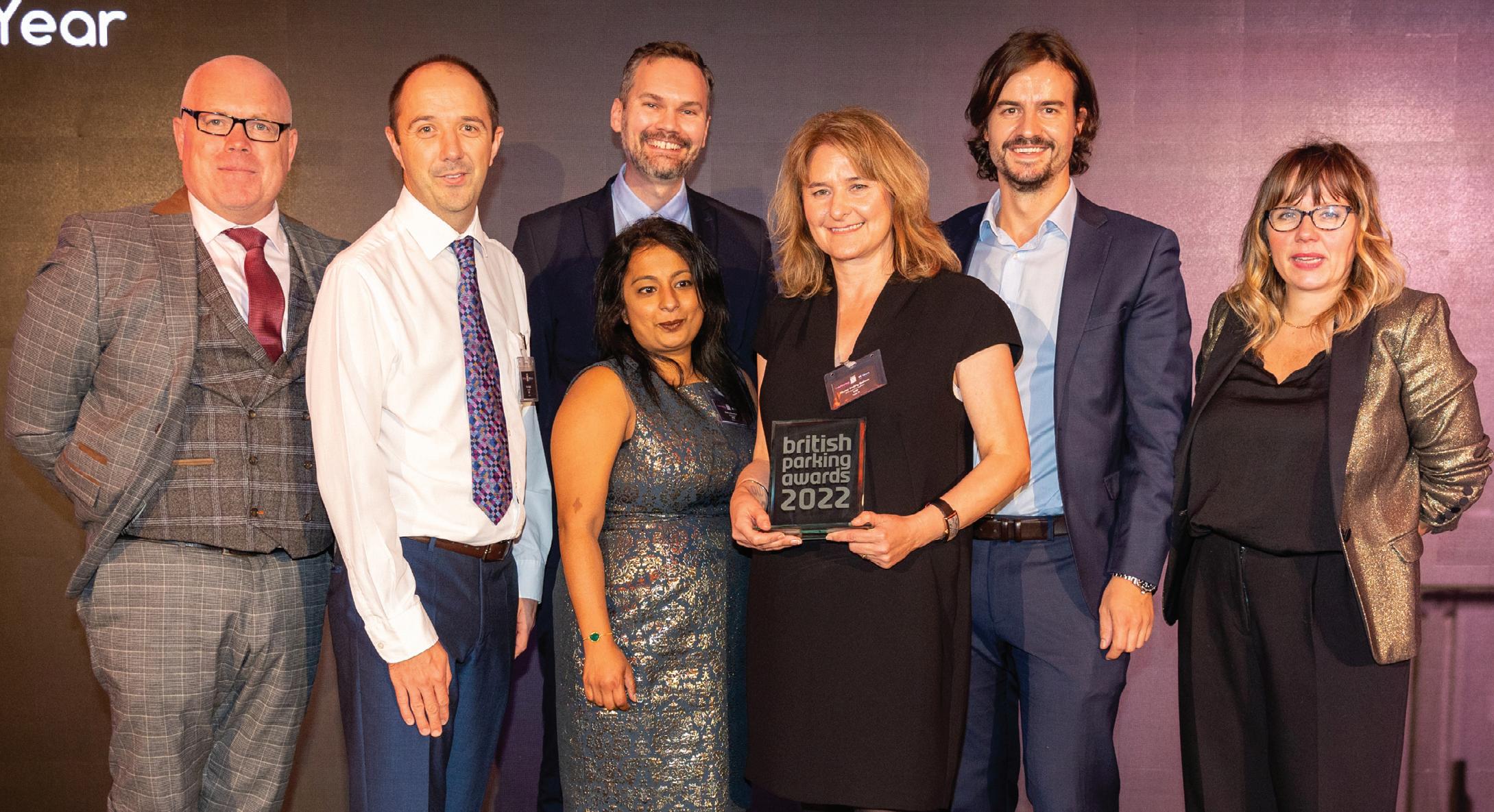

Newcastle City Council’s parking team were key to the Great North Run’s triumphant return.
The Great North Run is one of the most high-profile events to be held in the North East and showcases the region and highlights all that is good about the North East. As a result of the pandemic, the race could not be held in 2020, the first time it was not held in almost 40 years. By 2021, organisers the Great Run Company, Newcastle City Council and people of the North East were very determined to see it run again, so it was staged in a way which ensured everyone was able to stay safe with the ongoing pandemic.
The Great Run Company determined that they needed to change the route to prevent everyone trying to get back to Newcastle from the traditional finish point in South Shields. They called upon Newcastle’s parking services team to develop a system which allowed everybody taking part in the race to arrive and park in a way which would ensure that social distancing was preserved.
Just weeks before the race, several members of the Newcastle City Council notice processing and enforcement teams joined the project to support the Great North Run. As the start and end points of the run were to be based in Newcastle city centre, the council offered pre-paid pre-booked parking spaces in three major city centre car parks to support run participants.
At short notice, an online application and payment system was devised and built with support from the council’s ICT team that allowed the parking service to provide booked spaces for over 1,000 customers. Meanwhile the enforcement team would not only facilitated the parking arrangements but also to offer
guidance on people arriving for the run.
Newcastle’s parking services team manager Steven Foster says: “We worked to communicate with the Great North Run organisers to highlight that the booking facility was available, and they in turn rolled out the booking system to the registered runners. Staff also responded to many customer queries regarding parking arrangements on the day of the event.
“Our enforcement staff were visibly present at all car parks on the day and were able to help people who attended the event from across the country. Parking services also worked with the traffic management section who were responsible for closing and reopening roads and diverting traffic to other more suitable routes. This ensured that vehicles arrived and were able to park efficiently and without any concern.”
Over 1,000 customers were able to pre-book parking as soon as the system went live, which helped minimise the stress of getting parked in the city centre on a busy day. Foster says: “It was clear, however, that there was even greater demand than anticipated and so we built on the original allocation and made additional car parks available. This allowed for hundreds more customers to be able to utilise the pre-booking system and distribute people attending the event to car parks across the city.
“This bespoke pre-booking system is something that we will look to use at multiple events where we identify a need to prebook vehicles into car parks in advance of an event taking place. We will also continue to work in very close partnership with the Great Run Company to support the Great North Run. We have already began working on the arrangements that we are putting in place for the 2022 event. Whilst this may not involve pre-booked payment systems it will involve staffing car parks to support people attending the event as well as reserving car park spaces to facilitate welfare facilities and race resources.”
Newcastle City Council’s parking services team are proud of what they do, and rightly so. The team really rose to the occasion when asked to help deliver a revised approach to staging the iconic Great North Run, delivering traffic control and parking solutions that guaranteed a successful event.
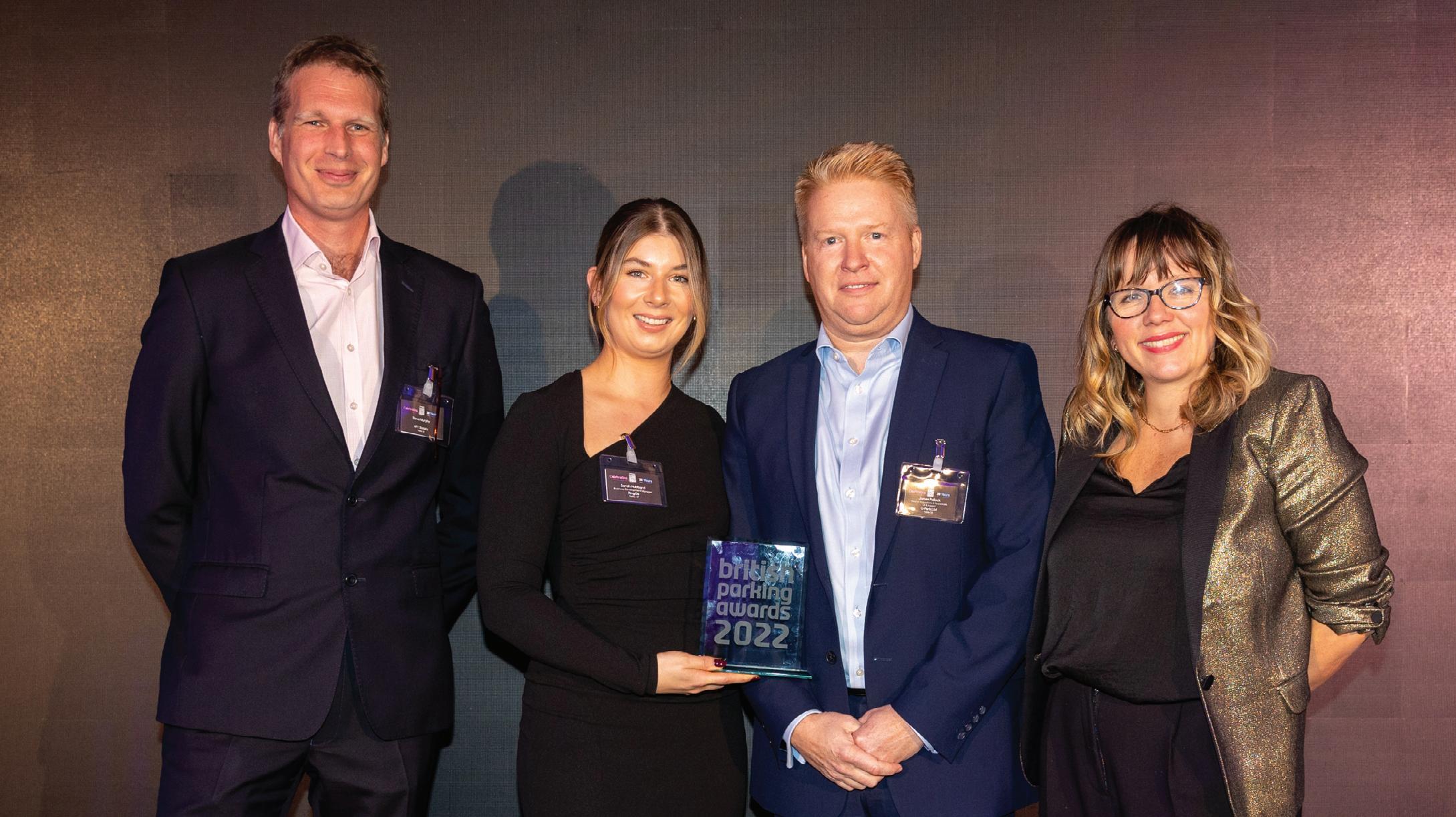
Q-Park and RingGo have developed a seamless way for drivers to pay for their stays in car parks.
Paying for parking is a painful necessity for drivers. Often perceived as a hassle, and even a source of anxiety, motorists’ sensitivity around parking is surpassed only by the frustration of having to understand the location’s restrictions, find the right change to pay and suffer long queues at payment machines that are often slow, clunky or broken.
Cashless parking specialist RingGo thus teamed up with European car park operator Q-Park to create AutoPay, a system that automates payment in off-street locations. There are no buttons to push, no coins to collect, no machines to queue at. Drivers sign up once in the app, then payment is automatic.
AutoPay integrates automatic number plate recognition (ANPR) parking technology with the RingGo app to allow easy, contactless entry and exit to barrier-controlled Q-Park car park locations. With AutoPay, the parking transaction starts and ends completely autonomously, bypassing parking payment machines, allowing for a quick and effortless experience for drivers so consumers can park, pay and get on with their day. Motorists wanting to automate parking payments slide the AutoPay toggle in the app to opt in.
As the first digital on-demand parking solution available at Q-Park locations, AutoPay is an integral part of Q-Park’s new Parking as a Smart Service (PaSS) system, which seeks to provide automated, safe and secure parking to drivers in the UK.
RingGo and Q-Park collaborated on the AutoPay technology digitally, an approach reinforced by the remote working policies
Award sponsored by
put into place during the pandemic. To support smooth ways of working, the companies put in place joint access to a sandbox test environment to stress-test the solution. Finance teams from each company worked together to put in place effective reporting tools for reconciling payments, ensuring compliance and quality standards are consistently maintained.
Q-Park has developed an API (application programming interface) that allows RingGo and Q-Park technologies to talk to each other. It works by collecting data: when a RingGo customer signs up to AutoPay; when they then park in a Q-Park car park, the data is shared with Q-Park to cross-reference with PaSS/season tickets, ensuring the user is linked to the correct payment flow.
Peter O’Driscoll, managing director of RingGo, says: “Now more than ever, the requirement for simple, intuitive technology that removes friction from everyday tasks is a fundamental consumer expectation. After all, an entire adult generation have grown up with digital services and mobile technology playing a central role in their lives, having never known the sound of dialup internet. We’re now so used to solving everyday problems with digital solutions that technological innovation is an essential requirement for creating the experiences desired by consumers.
“To help our operators evolve their parking strategies, meet the ongoing demand for digital parking payments post-pandemic, and offer the flexibility of choice to motorists through innovative payment options, we partnered with Q-Park to imagine, develop and deliver a seamless automated parking solution for tomorrow: RingGo AutoPay. By bringing cashless options to more off-street parking spaces, systems like AutoPay can ensure that people are still drawn to towns and cities to work, play and stay – while the requirement for parking machines is reduced, as is the number of journeys required for people collecting cash, and the number of pay & display tickets printed.”
By bringing cashless options to more off-street parking spaces, systems like RingGo AutoPay can ensure that people are still drawn to towns and cities to work, play and stay, while the requirement for parking machines and their requisite upkeep is reduced

Q-Park
Q-Park is working to enhance and, ultimately, reinvent the town centre car park.
Q-Park is one of Europe’s leading parking operators, with more than 640,000 parking spaces in over 3,300 commercial parking facilities across seven Western European countries. In the UK it operates clusters of car parks in cities such as London, Birmingham, Edinburgh, Leeds and Manchester. The company mainly operates off-street cars parks that it owns, or spaces run under concessions and long-term leases from public and private landlords.
The company’s car parks have a distinctive house style that offer a secure environment and additional services. Q-Park has received 75 Park Mark awards as well as three Park Mark Plus accreditations. Adam Bidder, Q-Park’s managing director UK and Ireland, says: “Q-Park stands for ‘Quality in Parking’ and is the service that they are well-known for providing. Q-Park injects quality into every single area of its business, this can range from external design that is sympathetic to its surroundings or the fabric of the previous structure right through to parking spaces that are wider than the UK average and the latest technology in LED lighting to eradicate any dark corners.”
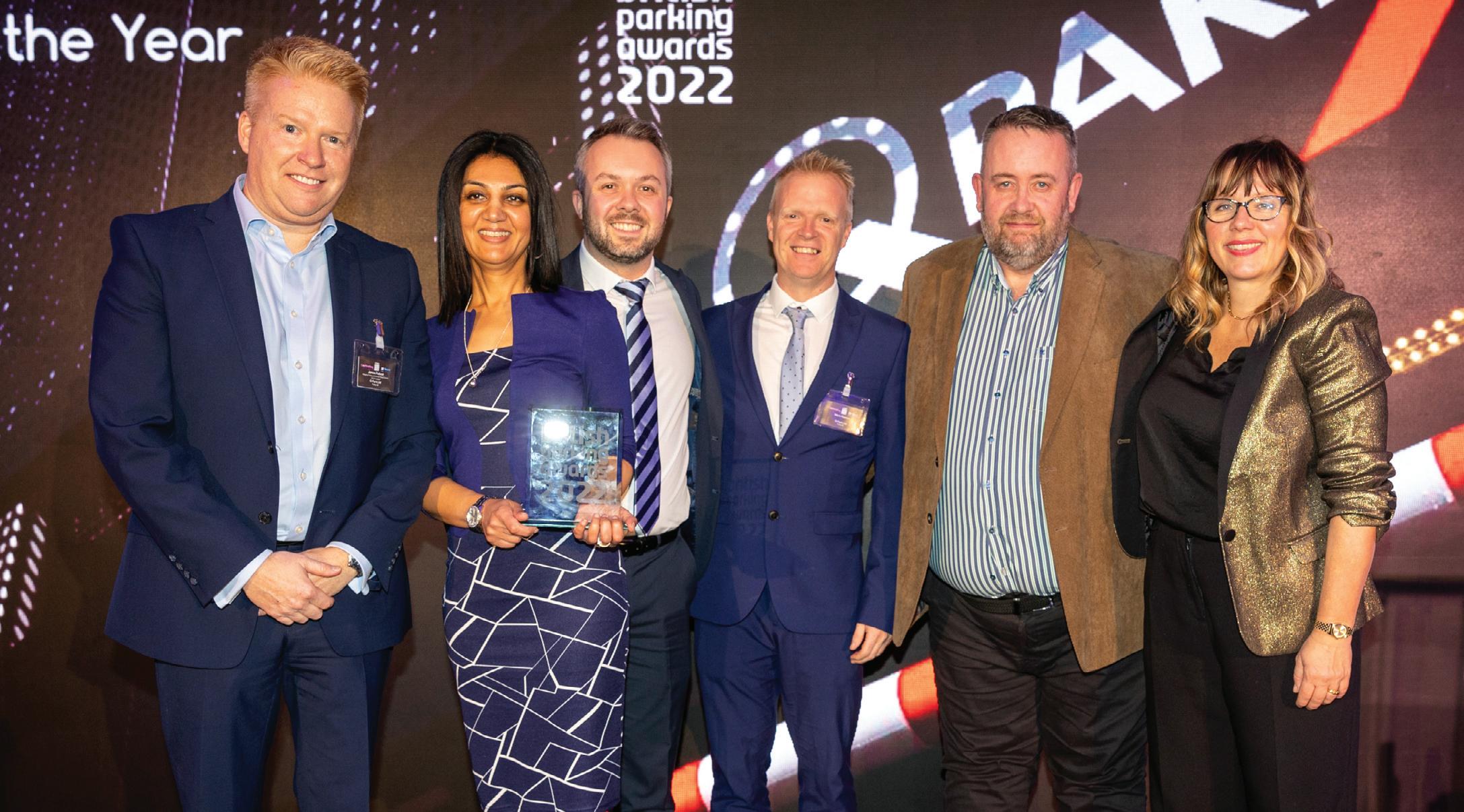
Customers who need assistance when they arrive at a Q-Park can either speak to a parking host on-site or a customer service centre. “Having a physical presence also helps provide peace of mind to customers about the security of their vehicle,” says Bidder. “Q-Park does not believe that simply having a parking host in the car park office 24/7 provides the best value to both customers and the wider business. This means that the hosts are
fully mobile within the facility undertaking cleaning tasks and also removing any person who should not be there. Should a customer require assistance and are not able to locate a parking host, they can simply press the assistance button on any barrier, pay machine or help point. This will transfer them through to our 24/7 customer service centre based in Leeds. The operatives can assist the customer with most queries or can call the local response number to request that a parking host urgently attend to provide customer support.”
Q-Park is a champion of the mobility hub concept, and aims to develop parking facilities into places that realise urban accessibility, sustainability and liveability. Q-Park is thus making space for shared mobility schemes, electric vehicle charging, last mile delivery and retail space at a growing number of its facilities. For example, the Park Lane Mobility Hub in Central London is a large car park underneath Hyde Park where, as well as parking, tenants include BP, DPD, Enterprise, UFODrive and ByBox.
Q-Park has also been investing in technological innovation to provide a more seamless customer journey. For example Q-Park are currently in the process of installing PaSS (Parking as a Smart Service) technology across all of its facilities. This innovation is a combination of automatic number plate recognition parking technology and PlatePay, a digital payment solution. Bidder says: “Q-Park creates a seamless customer journey by allowing access to the car park and taking payment for parking simultaneously. This takes place by reading the number plate of a vehicle. Use of a debit/credit card while at the parking facility is no longer required. This integration leads to a fair, transparent and seamless parking experience with customers no longer needing to visit a pay machine before they depart. The new system has delivered instant demonstratable improvements in customer experience.”
Q-Park has long set a benchmark for providing high quality parking facilities, but it does not rest on its laurels. Q-Park recognises that the world around its car parks is changing and, therefore, must transform the way parking facilities are operated to keep pace with the changes to city centres.
The very swish B4 Car Park offers its growing number of members a safe and comfortable stay.
The B4 Car Park is located within the Post & Mail Building, which is located on part of a site previously occupied by the printing works of the Birmingham Post and Mail newspapers. Chatham Billingham bought the former printing works building and developed the site including a state-of-the-art public car park that opened in 2015.
With its prime location, B4 is the gateway to Birmingham city centre. Being in the heart of the Central Business District and Snow Hill area, B4 is used by office workers who commute to the city as well as people working at or attending any of the numerous law courts located within a four minute walk of B4.
The car park offers range of season and exclusive flexi-tickets that are popular with local businesses who can save money on their staff parking and manage their B4 account online.
Darryl Veness, car park manager, says: “B4 Membership has been available from day one. For those who sign-up, at no charge, the benefits include a discount on the standard parking tariff: no need to pay at the pay machines; access to an online account; and free Wi-Fi. B4 members are able to pre-book a wider parking space in advance for a nominal fee. The extra wide parking spaces are particularly attractive to those drivers who have large cars, and/or perhaps have children and pushchairs with them.
“Here at B4, our customers can take advantage of the car valeting service which is conveniently located on the first level of the car park. Offering a choice of services ranging from a quick
Award presented by
wash and polish to a comprehensive full valet including engine bay clean, customers can leave their cars in the capable hands of the valet staff while they go about their business. More than 44,000 people have signed up to become B4 members as a result of the service we offer,” said Veness.
B4 is particularly well placed to meets the needs of visitors to Birmingham Children’s Hospital, which is a two-minute walk away. Veness says: “We are open 24/7 and offers family friendly amenities such as wider parking bays to assist in getting pushchairs in and out of the car and a platform lift for pushchairs and wheelchairs. For those having to make frequent visits to the hospital, parking at B4 can be cheaper for those who sign-up for membership. B4 offer discounts of up to 50% off the standard parking tariff to B4 members – and it’s free to join!”
The B4 Car Park has been a consistent winner at the British Parking Awards since its launch. It is a well designed facility managed by a team committed to providing a quality service to customers who are signing up to become members in ever increasing numbers. This really is a ‘hotel for cars’.

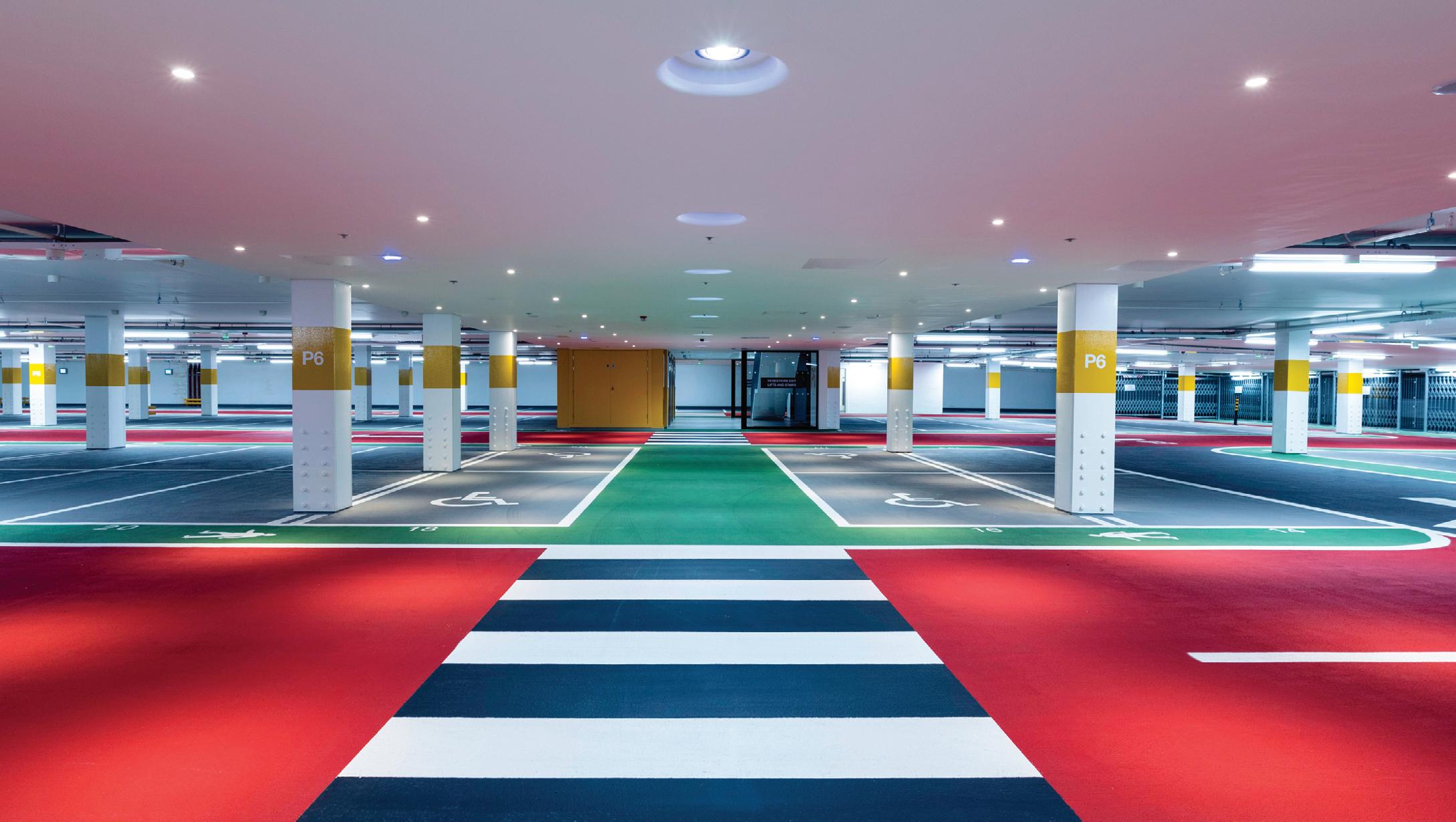
Challenge Writer by Barbour Logic
Barbour Logic is helping motorists write their appeals against penalty charge notices.
The Parking Technology Award was won for a second year running by Barbour Logic. This year’s successful entry was Challenge Writer, a piece of software that assists people with literacy problems to write challenging parking penalties.
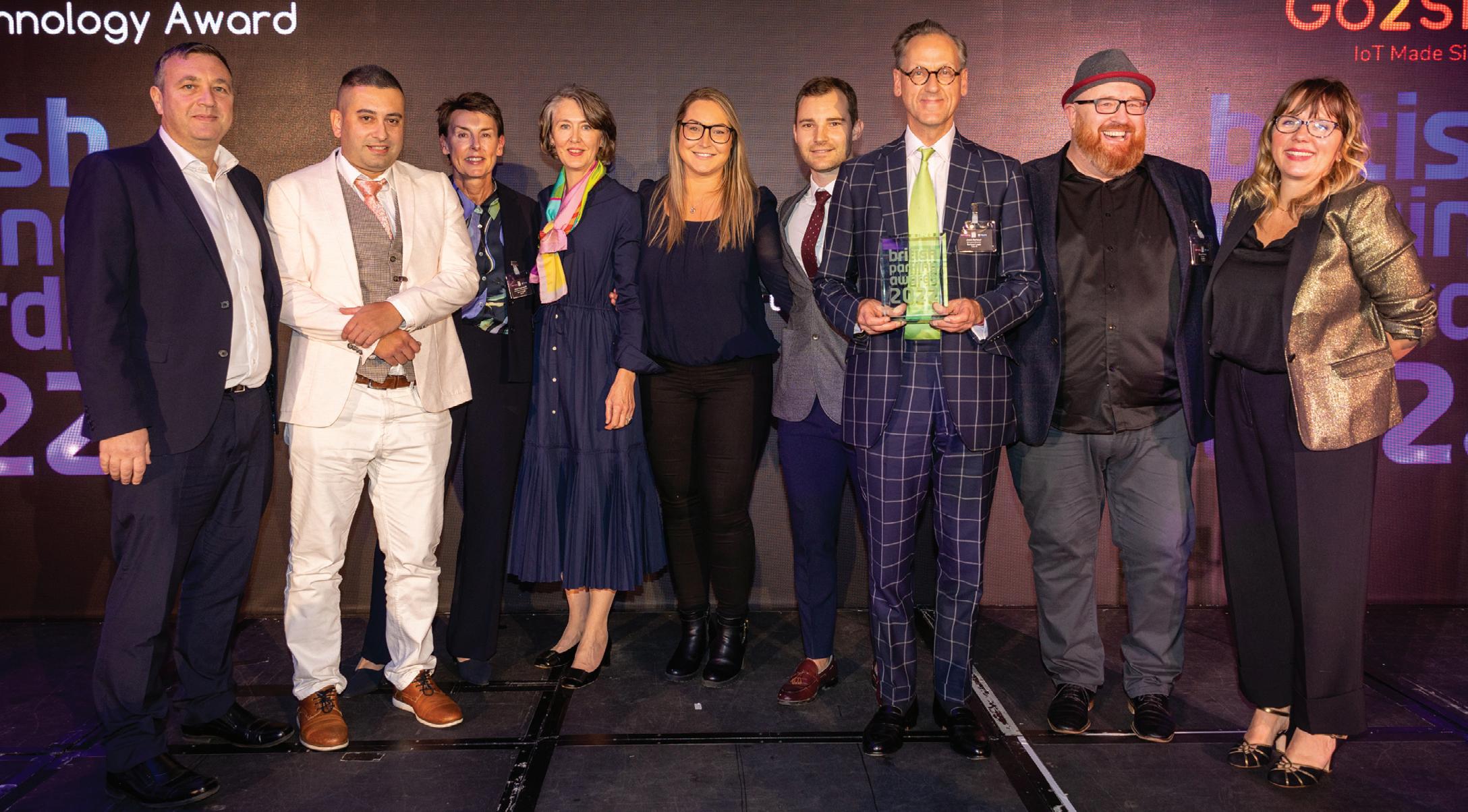
Everyone has a right to challenge a penalty charge notice (PCN). Around 3 million people do this per year. But 16.4% of UK adults are deemed ‘functionally illiterate’ with ‘very poor literacy skills’. Jason Barbour, managing director of Barbour Logic says that means that of these 3 million people, about half-a-million will be barely able to exercise their right to challenge their PCN. Among this group, literacy levels range from ‘may not be able to read bus or train timetables or understand their pay slip’ down to ‘may not be able to read a label on a medicine bottle’, or even ‘may not be able to write short messages to family’.
Barbour says for these people writing a PCN challenge is an immensely difficult task. “Writing a challenge will be an immense struggle for 500,000 people – the functionally illiterate – and doubtless too daunting for some,” he says. “For motorists as a whole, even people with strong literacy skills have a frustrating experience. They struggle to know what information to mention in their challenge or don’t realise they need to provide documentary evidence. The problem for councils is that challenges are often long, unstructured and without documentary evidence. They are time-consuming to read and often require another round of correspondence to request evidence.”
Addressing this challenge led to Barbour Logic devising Challenge
Award sponsored by
Writer, a piece of software that offers to help drivers compose a letter when engaging with a local authority using the Chatbot Max system, which won a British Parking Award in 2022.

Challenge Writer assists drivers write letters that are concise, structured and to the point; which list the key points that staff need to check, are typed and in plain English.
Barbour explains: “Development was an iterative, agile process, starting with a smaller product and building up to a fuller one. We worked closely with a small number of councils and had very few hitches after go-live. And of course we’re continually developing the product. Nine councils are now live with Challenge Writer, with more in the pipeline.”
Sarah Randall, assistant director of traffic and parking at Newham Council, says: “‘Challenge Writer supports residents and businesses in Newham in writing representations, particularly those where English is not their first language.”
Garry Hoyle of North Tyneside Council, says: “Challenge Writer corrects a major social injustice. The disadvantaged no longer need to struggle writing a challenge or get left out. Thanks to Challenge Writer they can now exercise the same right to challenge as everyone else. It’s a welcome breakthrough for the sector and for motorists. It shows motorists that the council cares about them, that it’s a friend not foe. Which is great for the council’s reputation. And it’s great for the wider reputation of the parking sector too.”
As the system was intended to be an aid to the public, Barbour Logic piloted the Challenge Writer with real people such as William O, who explains: “Appealing a parking fine is stressful. To dispute a PCN, it’s hard to know what to say or what documents you need to provide. The appeal it wrote for me told me what evidence to supply, so my case was resolved first time. A really helpful service. I’m very impressed the council offers it.”
Barbour Logic stood out in the Parking Technology section because it had devised a system that seeks to address a real human need – helping people who have literacy issues or lack confidence in writing to engage with the parking representation and appeals process.
Nottingham’s new multi-storey car park and coach station acts as a modern gateway to the city centre.
The original Broad Marsh Bus Station & Car Park was a 1970s concrete and brick structure constructed alongside the now demolished Broad Marsh shopping centre. Having demolished the old car park in 2018, Nottingham City Council has built a new car park which opened to the public in November 2021.
The new Broad Marsh facility was a capital funded project by the city’s parking, fleet and transport operations team. The project cost approximately £50m, a sum that covered the demolition of existing buildings, the construction of the new bus station and car park, along with retail units, the Central Library, pedestrian walkways, landscaping and a cycle hub.
The car park was built by main contractor Galliford Try, which worked closely with the city council to design and build a multimodal facility that is a key part of the wider £2bn Southside redevelopment programme, which aims to transform the southern area of the city centre into an attractive, safe and aestheticallypleasing environment.
The car park has 1,304 spaces spread across six floors. The spaces are wider than the minimum regulatory parameters to provide drivers with more manoeuvrability, which not only helps to ensure that all spaces are accessible, but also reduces the potential for accidental collisions. The lower level houses the city’ s new bus station, which accommodates both local and national
bus services. The ground floor is home to a new cycle hub.
To help customers with finding an available parking space, Nottingham City Council has implemented an automatic parking management system. The parking management system works by indicating whether a space is available or occupied with a green or red light respectively. This system was implemented to reduce the amount of time vehicles spent cruising, which in turn reduces congestion, air pollution and carbon emissions.
The car park’s façade is made up of 12 different materials which were carefully selected to be environmentally considerate, durable and reflective of local architecture within the city centre. The façade features vertical aluminium fins, as well as terracotta and glass panels to allow natural light into the car park. A standout feature is a series of laser-cut panels that show images representing the local area and the diversity of the community.
The public realm around all four elevations features tree-lined pedestrian zones with views to Nottingham Castle, amphitheatre seating, soft landscaping and high-quality granite paving.
In line with Nottingham City Council’s ambition to become the first carbon neutral city in the UK by 2028, the building houses one of the greenest car parks in the country with 81 electric vehicle charging points, and 720 roof-mounted solar panels, which will provide renewable electrical energy to power the car park and bus station, saving over 53 tonnes of carbon annually.
Nottingham City Council leader, Cllr David Mellen, says: “I think it is better than I could have imagined. The environmental credentials of this building are bang on for what we want to do about being carbon neutral by 2028. It’s also a high-quality finish, it speaks to the people of Nottingham that we value them, whether they are parking their car here or getting on the bus, they are going to do it in a smashing environment. I think it’s brilliant.”
Broad Marsh Bus Station & Car Park is example of architectural, construction and collaboration excellence that provides the people of Nottingham with a welcoming, safe and user-friendly multi-storey car park, new civic services and an attractive, vibrant public realm.
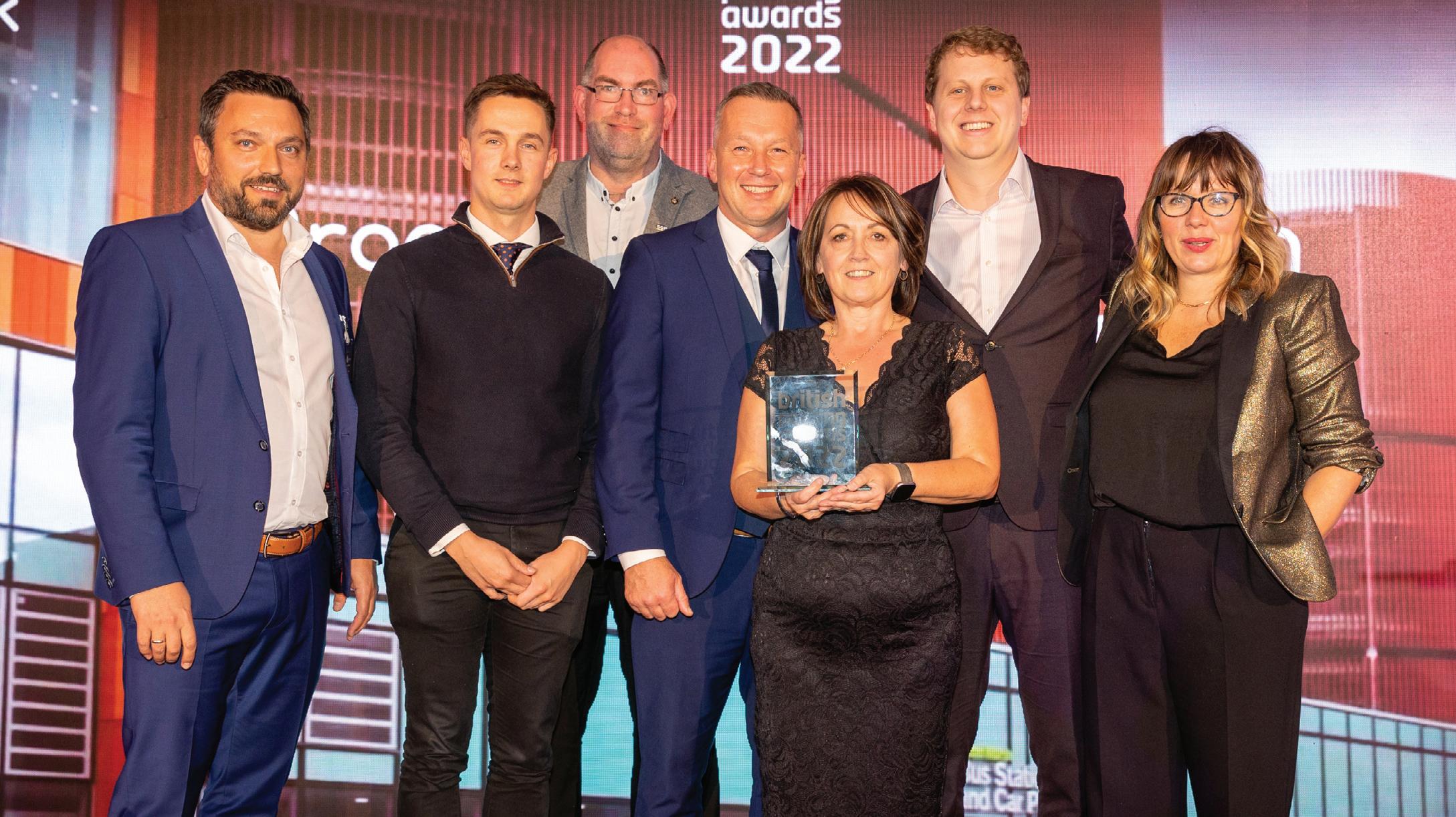

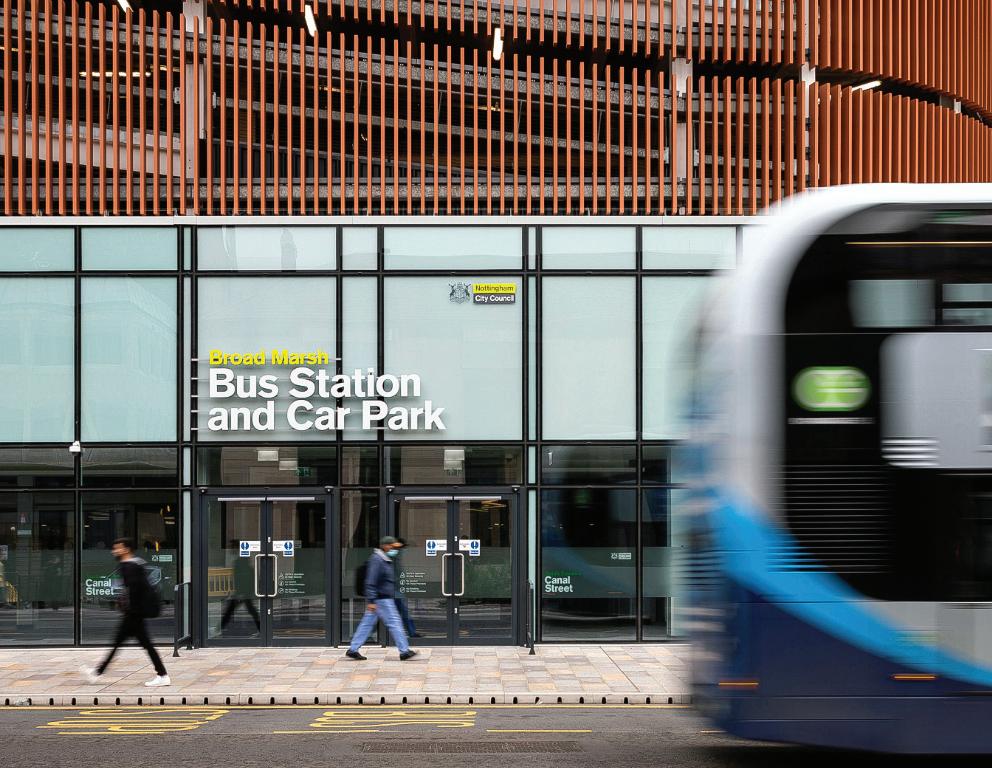

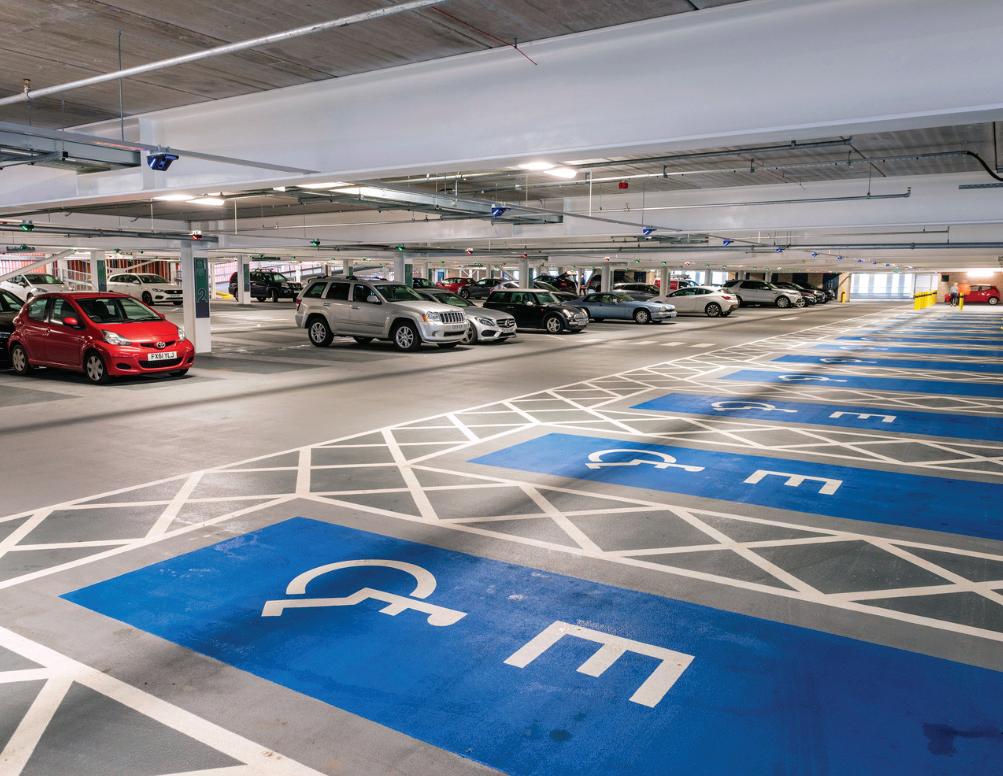

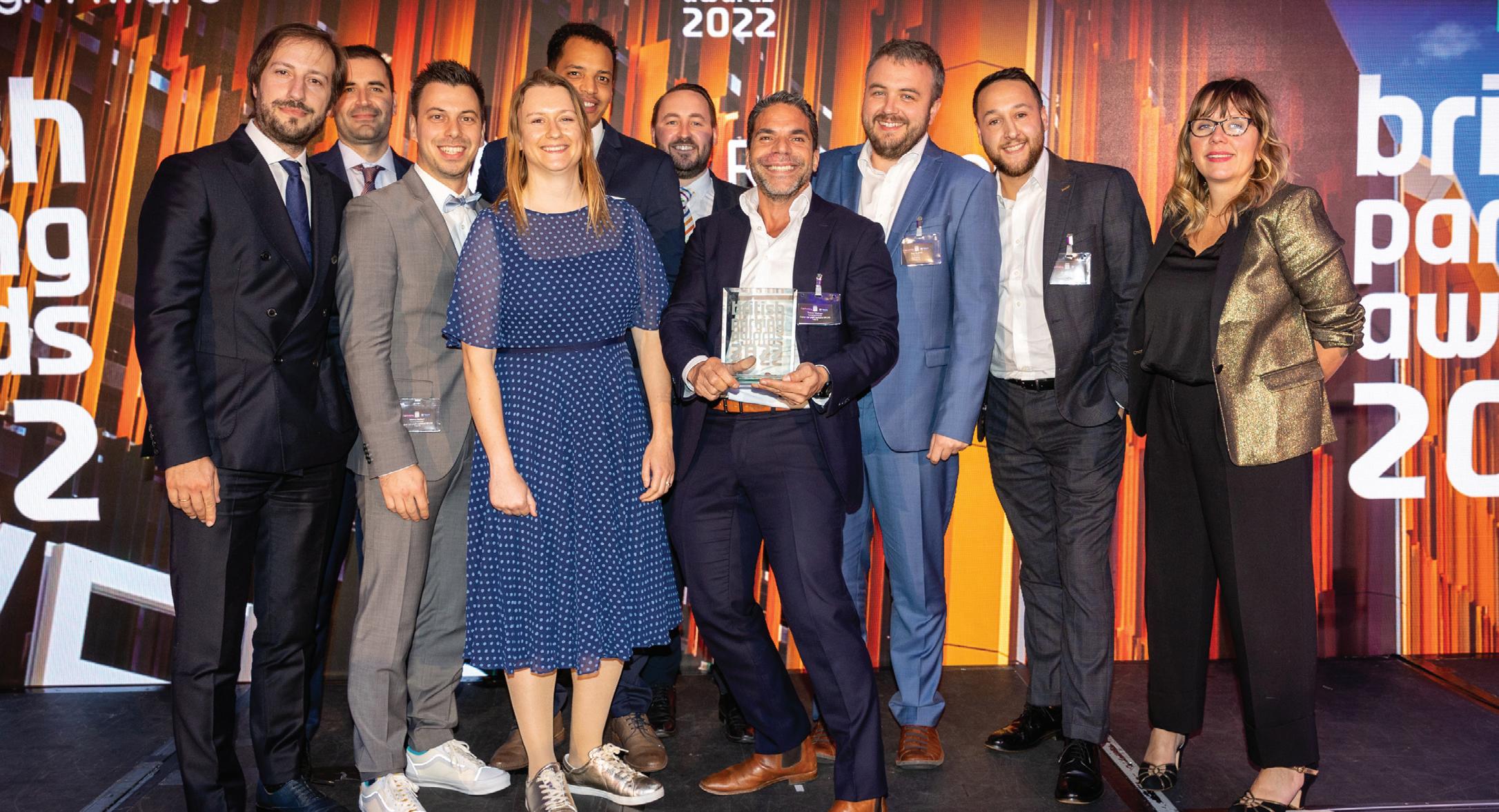
Watford General Hospital’s staff and visitors can now use a truly impressive facility.
Watford Riverwell is a multi-storey car park that provides much needed new parking capacity for Watford General Hospital and for a major regeneration of the Hertfordshire town. When designing the project, HUBER Car Park Systems was conscious of the client’s requirement that the new facility be a vital link in the overall development and growth of the Watford Riverwell area. The new car park thus allows direct access to Watford General Hospital via a pedestrian bridge providing easier access for patients and visitors, as well as an access way leading to neighbouring Watford FC’s Vicarage Road Stadium.
A lot of work was put into creating a façade that fitted in with its surroundings but also had an iconic landmark quality for one of the earliest buildings in a wider masterplan. What is striking about the car park is its scale. It has six levels and 1,455 spaces. These are attributes the design team decided to celebrate. The levels are counted out on the tower element, and the car park is unmissable on account of it being yellow.
HUBER’s design team worked closely with the local planning authority to develop an exterior design that uses L-shaped coloured profiles at different depths and lengths. The intricate cladding plays with perspective and shadow, giving the building a stunning and distinctive external look.
Internally the façade maximises natural light, which gives the car park’s interior an airy, safe and comfortable atmosphere. All the levels easily accessed and clearly numbered, designed to keep
walking and driving distances to a minimum. There are four stair cores with four lifts having been installed in the main core to provide a swift and reliable service. The disabled parking bays are located close to the main core for ease of access.
The building is accessed via a newly built road (Shrodells Road) off Thomas Sawyer Way, which means traffic flow is smooth and fluid, with multiple entrance and exit lanes to reduce queuing. Once inside, the use of vertical circulation module (VCM) featuring a continuous ramp means the car park is column-free. A parking management system signals the location of free spaces on each level.
The top floor is covered by a full metal sheet roof, protecting the structure and users from the weather. The roof also carries is an array of 1,248 photovoltaic panels that is able to provide the car park with full power and even supply the grid with its oversupply. The car park provides 144 electric vehicle (EV) chargepoints. Watford Riverwell has its own substation, which offers the possibility to providing additional EV points. HUBER’s proprietary LED lighting system features daylight and motion sensors so as to be as environmentally and economically efficient as possible.
At ground level there is new public plaza and flexible space to accommodate coffee shops, retail units and a parking office that enables any queries to be dealt with immediately. The parking office has a kitchenette and high quality staff welfare facilities, while the public are provided with amenities and disabled toilets.
HUBER’s managing director Tomer Meirom says: “The design and build of this car park was particularly interesting, challenging and ultimately extremely rewarding. It combines our vision of multi-storey car parks as mobility hubs with our aspirations to create greener and more sustainable.”
Many car parks are designed in a manner that seeks to hide their purpose, but this big yellow building shouts its presence. And Watford Riverwell’s bold exterior wraps an interior engineered to provide a safe, hassle-free parking experience, which is much appreciated at a busy hospital site.





Cemplas and Sika developed a way of stopping cars grounding on ramps at a shopping centre car park. The Grand Central shopping centre is a key part of the reimagined New Street station in Birmingham. Interconnected with Birmingham’s Bullring, Grand Central is home to shops, restaurants, bars and leisure facilities.
While a comparatively new development, a problem emerged with its multi-storey car park. As vehicles were moving between levels, the profile and geometry of the ramps were causing damage to the underside of the cars, which were ‘grounding’ on the concrete. This became a major cause of concern.
The car park sits above the stores. The structure’s steel frame and precast concrete floor provide approximately 12,000m2 of parking. It became clear that a total of 17 ramps required reprofiling to precisely finish the floor levels because they were not performing adequately to accommodate construction tolerances of the high trafficked car park.
Cemplas Waterproofing & Concrete Repairs was appointed by Vinci Construction UK to undertake the £1.7m ramp refurbishment. The car park was a challenging working environment for a construction site as it was built above live railway lines. Cemplas divisional director Mike Wood says: “Grand Central is right in the heart of Birmingham city. It is extremely busy so timely, effective solutions needed to be developed to address the operational issues. The building links to the train station as well as the multilevel shopping and leisure complex, so our refurbishment innovation needed to ensure we completed the project on time.”
Cemplas worked with material supplier Sika to develop a solution. The product selected was part of the SikaScreed range. SikaScreed HardTop-60 has a soft plastic consistency, fast curing, rapid load bearing and is over-coatable, being designed for application in a minimum layer thickness of 8mm. It is almost shrinkage-free during the curing process and has very high abrasion resistance and compressive strength.
During the first product trial, Cemplas developed a purposebuilt ramp at its Midlands office to recreate the car park structure. This allowed Cemplas to create a number of ramp angles to show how the SikaScreed HardTop-60 could perform under the different variables. The design mix ratios were extremely tight and had to be developed to precise tolerances to the millimetre, as the client had to ensure the issue was resolved once and for all.
During the second product trial, Cemplas hired an entire warehouse and contracted carpenters to build three ramps to simulate the desired levels required to stop cars from ‘bottoming out’ at the top and bottom of the ramps. The trials gave the structural engineer and the client confidence in the materials being used.
Once the trials were complete, the car park refurbishment was undertaken on a strict 32-week programme of works. “Because this project was all about the uneven levels, tolerance and geometry of the ramps, we were continually working with millimetre precision,” explains Mike Wood. “The innovative nature of the screed solution meant we could work this precisely, compared to some other car park refurbishment products on the market. The product could also be laid in a minimum thickness of 8mm, which is extremely thin and precise. The results of this showed the tolerance levels were within a 1mm range – so our innovative product and site application solutions were extremely precise and effective for this refurbishment. An incredible achievement!”
The re-profiling of ramps at the Grand Central car park was an engineering project that required working to truly fine margins. The teams at Cemplas and Sika adopted a very methodical and practical approach to testing their solution and then applying it to the real world.





EVolution is an independent source of news and analysis for organisations planning, creating and operating electric vehicle and zero-emission charging infrastructure.
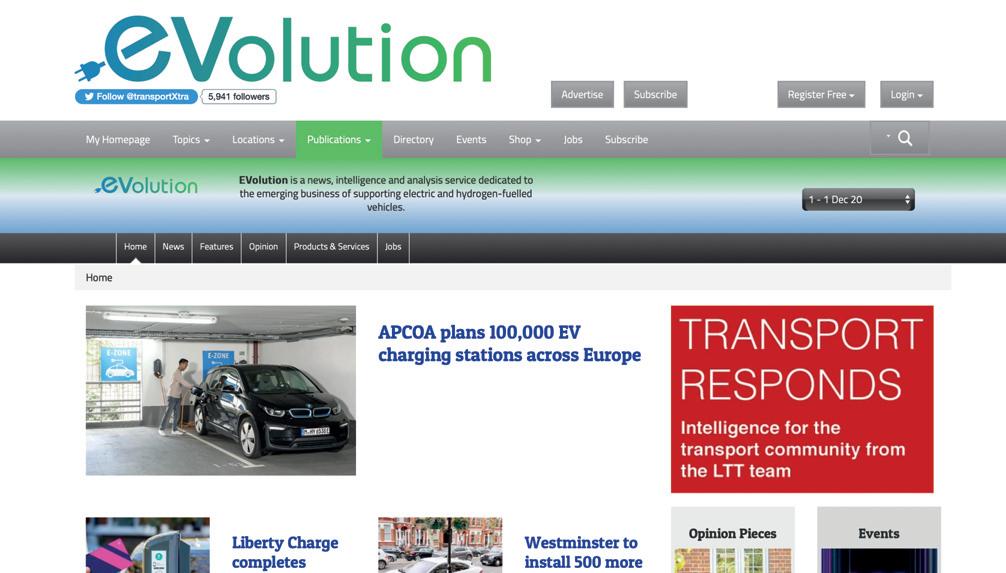
Existing magazines, websites and events covering EVs focus on the vehicles themselves. What makes EVolution different is that is the first content space dedicated to the emerging business of developing the infrastructure required to support electric vehicles.
EVolution makes the business of providing electric vehicle infrastructure its core mission.
In parallel to the website and print version there are:
Digital editions
Webinars
Conferences and exhibitions
The EVolution Awards.
EVolution is produced by the highly regarded Landor LINKS editorial team, along with expert contributors, that bring knowledge and expertise grounded in the worlds of transport, parking, traffic management and urban development.
Send your story ideas to: mark.moran@landor.co.uk
EVolution covers themes such as:

The planning and operation of EV charging
Designing EV infrastructure for car parks, motorway service areas, workplaces and the home

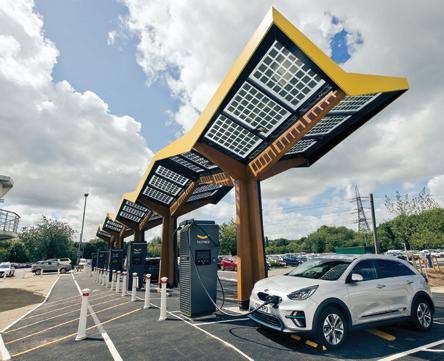
Decarbonisation policy
The development of EV charging networks
Chargepoint technology
The creation of EV hubs
Kerbside charging provision
The enforcement of EV charging bays
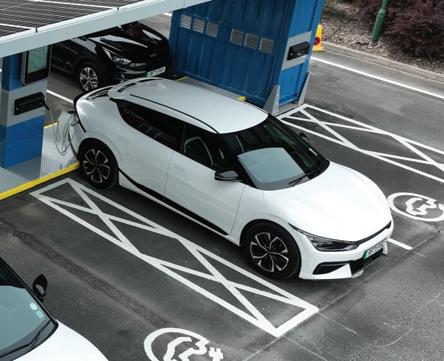
Connecting EV infrastructure with payment services

The uptake of EVs by drivers, commercial fleets and car-sharing providers
Vehicle design and powertrain R&D




The distribution of zero and low-emission fuels
Vehicle-to-grid (V2G) technology


Sourcing green energy for EV charging
Legal and regulatory developments


The role of EVs within clean air schemes
Managing fire safety in EV charging areas
Developments in the energy sector
To help us tell promote your organisation via print and online advertising, or a presence at Landor LINKS events contact Jason Conboy on jason@landor.co.uk











Lamp columns have been turned into EV charging points to help residents transition to electric vehicles.
Air quality is a critical issue for everyone who lives, works or visits Westminster, which suffers from some of the worst air pollution in the UK. Consequently, in 2019, City of Westminster Council declared a Climate Emergency and committed to being a net zero emissions council by 2030 and a net zero city by 2040.
The City of Westminster devised an Electric Vehicle Charging Infrastructure Strategy that set out a five-year plan to enable transition to electric vehicles (EVs) through the provision of charging infrastructure. It was recognised that much of this would have to be on-street as 90% of Westminster residents do not have access to off-street parking.
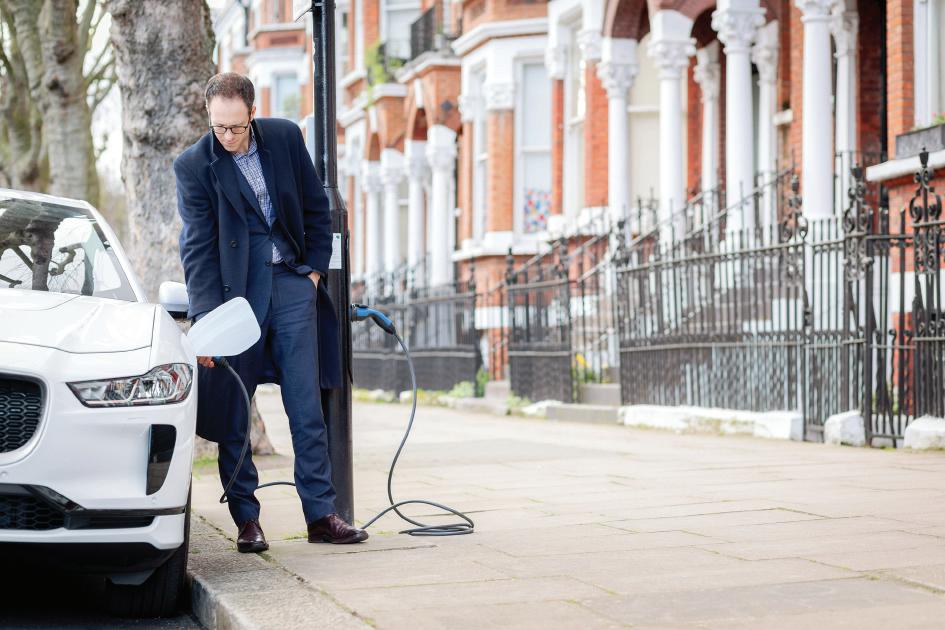
In 2019 Westminster was relatively well provisioned in terms of chargepoints, with around 200 made up of a mix of fast and rapid chargers and also some lamp column chargepoints that had been trialled by its street lighting team. The new chargepoints are primarily units attached to lamp column alongside resident parking bays. Utilising lamp posts meant the council was able to deliver charging infrastructure at a much lower cost, with reduced highway disruption from installation, whilst also ensuring that this resulted in negligible levels of additional street clutter.
Damon Budd, Westminster’s parking services contracts manager, says: “The city council’s strategy determined that it was key to ensure good levels of resident engagement, as well as good use of multiple data sets, in order to best understand current demand for charging infrastructure and its future profile. As a result, we set up a web-form on the city council’s website that invited residents with an EV to signal their interest in having charging
Award presented by
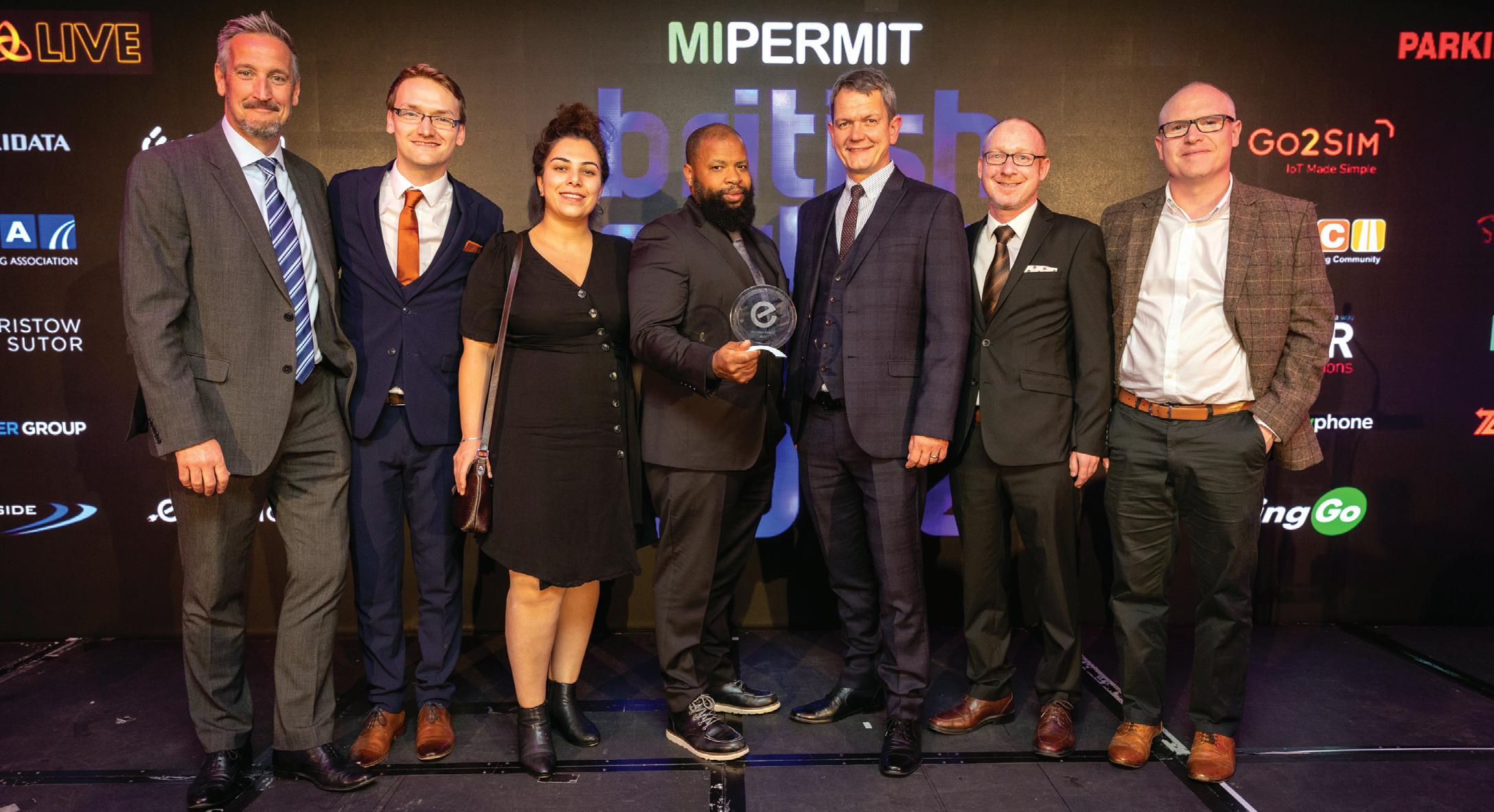
infrastructure close to where they live. This provided results as to where demand definitively existed and this could be used, in addition to various other datasets, as a basis on which to install charging infrastructure. We also conducted a survey on our website and held a series of focus groups with both potential and existing EV drivers to understand the concerns of both groups in Westminster to better inform our decision making.”
The council has used a framework offered though the Go Ultra Low Cities Scheme (GULCS) to fund the roll out 1,500 chargepoints in three waves between 2019 and 2022. The council partnered with Siemens and Ubitricity to deliver the programme. The city council has recently been successful in securing a large award of external funding that will result in a further 1,000 resident charging points, delivered through a Round 4 installation programme, to add to the 1,500 that are already on the public highway in Westminster, including 1,250 specifically for residents.
The UK government’s desire to see a transition to electric vehicles by the mid-2030s will require innovative and deliverable charging solutions. The pioneering approach that Westminster City Council has developed is one that should serve as an exemplar for towns and cities across the UK.David Bagwell, Michael Starkey, Rahid Rad, Earl Fairclough, Damon Budds, Neil Muscroft and Kevin Costigan
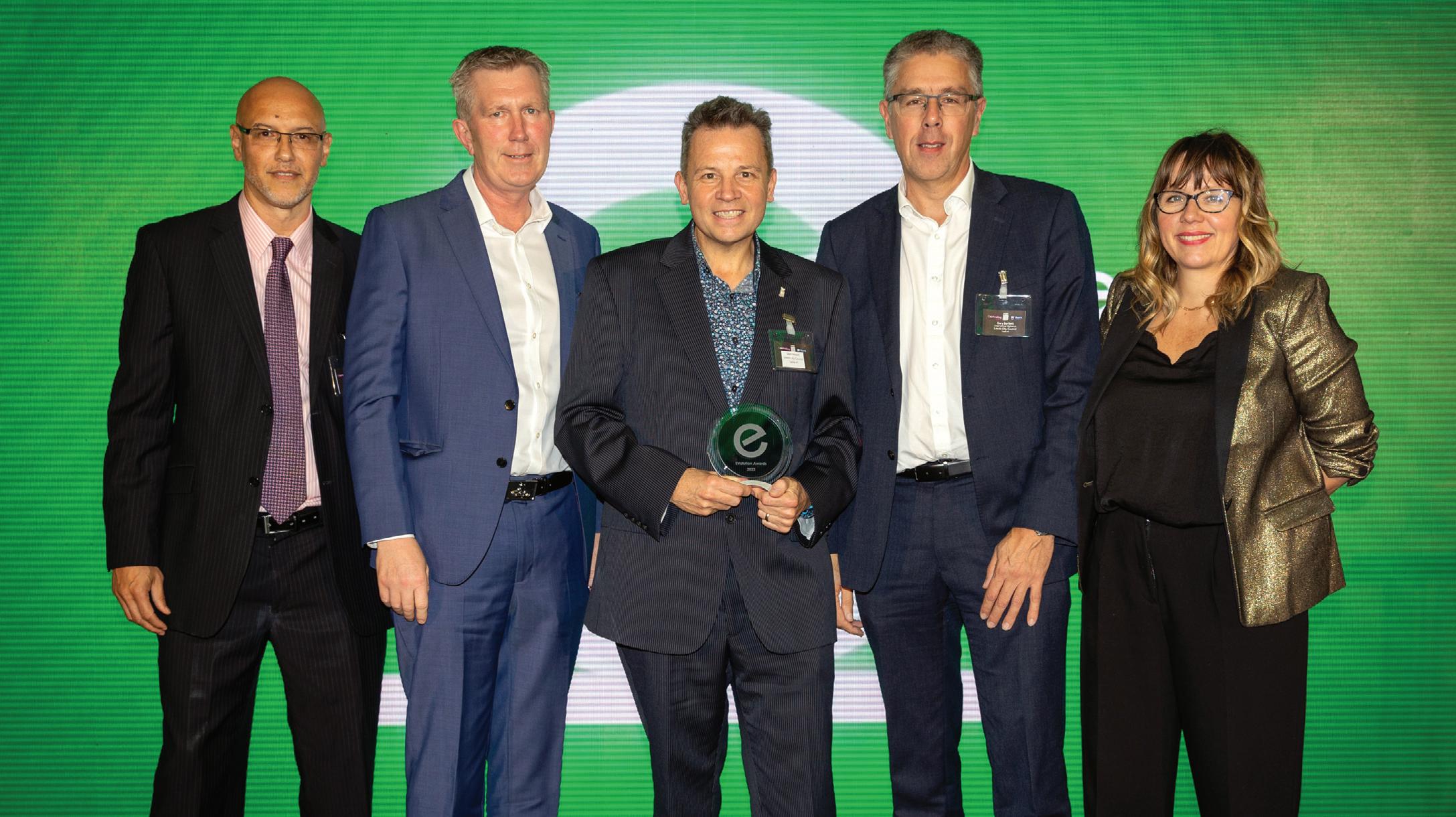
Leeds has created solar-powered park & ride site that provides plenty of space for electric vehicles.
Leeds City Council’s Stourton park & ride (P&R) site is an attractive, well lit, secure surface level car park with a striking green-roofed terminus building surrounded by trees, shrubs, footpaths and cycleways.
The facility provides 1,200 parking spaces, with direct access from the M1, M621, A61 and A639. There are 30 electric vehicle (EV) charging bays, along with dedicated disabled, family and motorcycle bays, as well as secure cycle storage and mobility scooter parking with charging.
The car park is free to use for park & ride customers, with a 1-hour limit for non-park & ride customers. P&R users can buy a bus ticket either in the terminus building or on the bus. There is also a payment structure for the electric vehicle charging points run by Electric Blue where app payments are used to cover the cost of charging an EV.
Stourton P&R is the UK’s first fully solar powered park & ride. It uses a smart energy system to provide all of the sites power needs, supporting electric vehicle charging and the fully electric bus fleet serving the P&R. There are 26 fast vehicle charging ports and four rapid chargers. Inclusion of automatic gates and an ANPR system, allows 24-hour access to electric charging.
Fully electric, zero emission buses serve the site every 10 to 15 minutes, from early morning into the evening. These high frequency electric buses into the city centre have short journey times, due to the bus lane improvements which were made as
part of the wider Leeds Public Transport Investment Programme. The scheme was delivered as part of the investment programme, supported by £173.5m of Department for Transport (DfT) funding. The scheme also received a grant from the European Regional Development Fund, to create a smart energy grid. The P&R car park cost a total of £39.3m to create.
A diverse group of partners from the public and private sectors came together to create the Stourton P&R. These included: Leeds City Council (project management, programme coordination and part funder); West Yorkshire Combined Authority (funding partners, budget holders, business case development and project assurance); development partner WSP; the DfT (funder); Mott MacDonald (design partner) and BAM Nuttall (construction partner).
The P&R also provides 2,150 metres of new footway and cycleway, to encourage walking and cycling instead of car use. The scheme now attracts cyclists who can use the Wakefield to Leeds Corridor, via safer routes through the P&R site. Secure cycle storage also helps to promote ‘cycle and ride’.
Stourton P&R has removed up to 1,200 cars from the Leeds city centre corridor, reducing congestion and improving air quality, while its sustainable engineering has created a scheme that supports Leeds City Council’s Carbon Neutral Commitment.
Sean Hewitt, Leeds City Council group engineers, says: “The scheme was designed and modelled for future expansion, with spare solar power generation and battery storage capacity, 84 additional electric vehicle charging bays, and spare ducting throughout the site. By taking a ‘once through’ approach the scheme removes the carbon which would be associated with additional future works, and proactively plans for future lowemission vehicles.”
The Stourton park & ride site in Leeds sets a benchmark for future transport interchanges. The sensitively landscaped car park has been designed to harness solar power, support the transition to electric vehicles and encourage drivers to switch to public transport for travel into cities.
Award presented by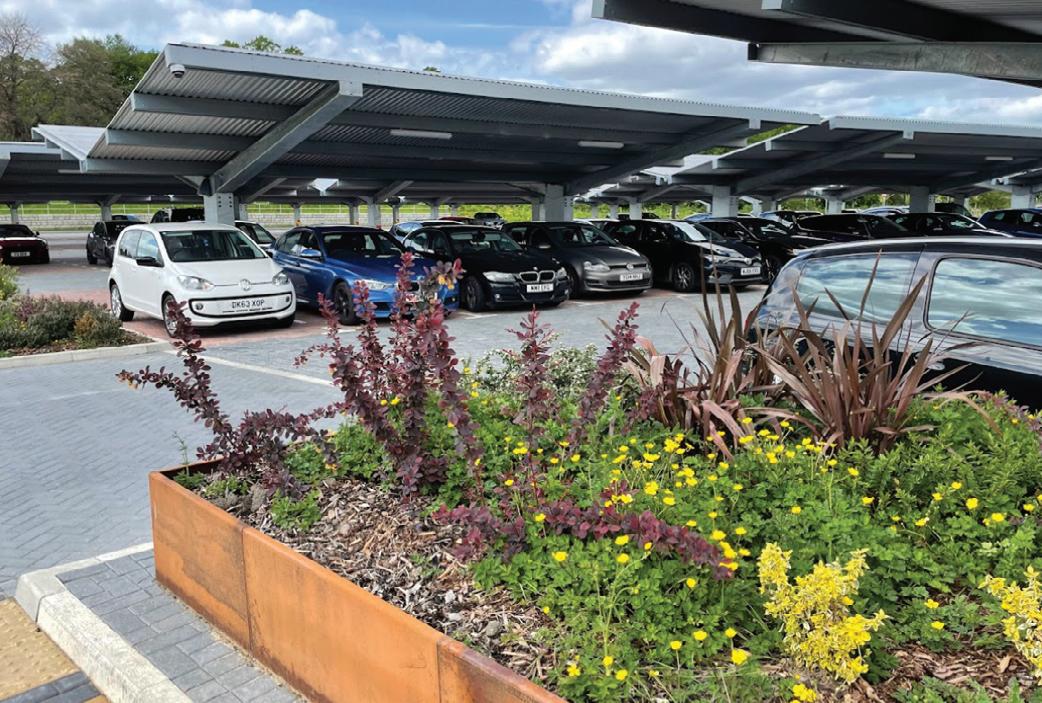


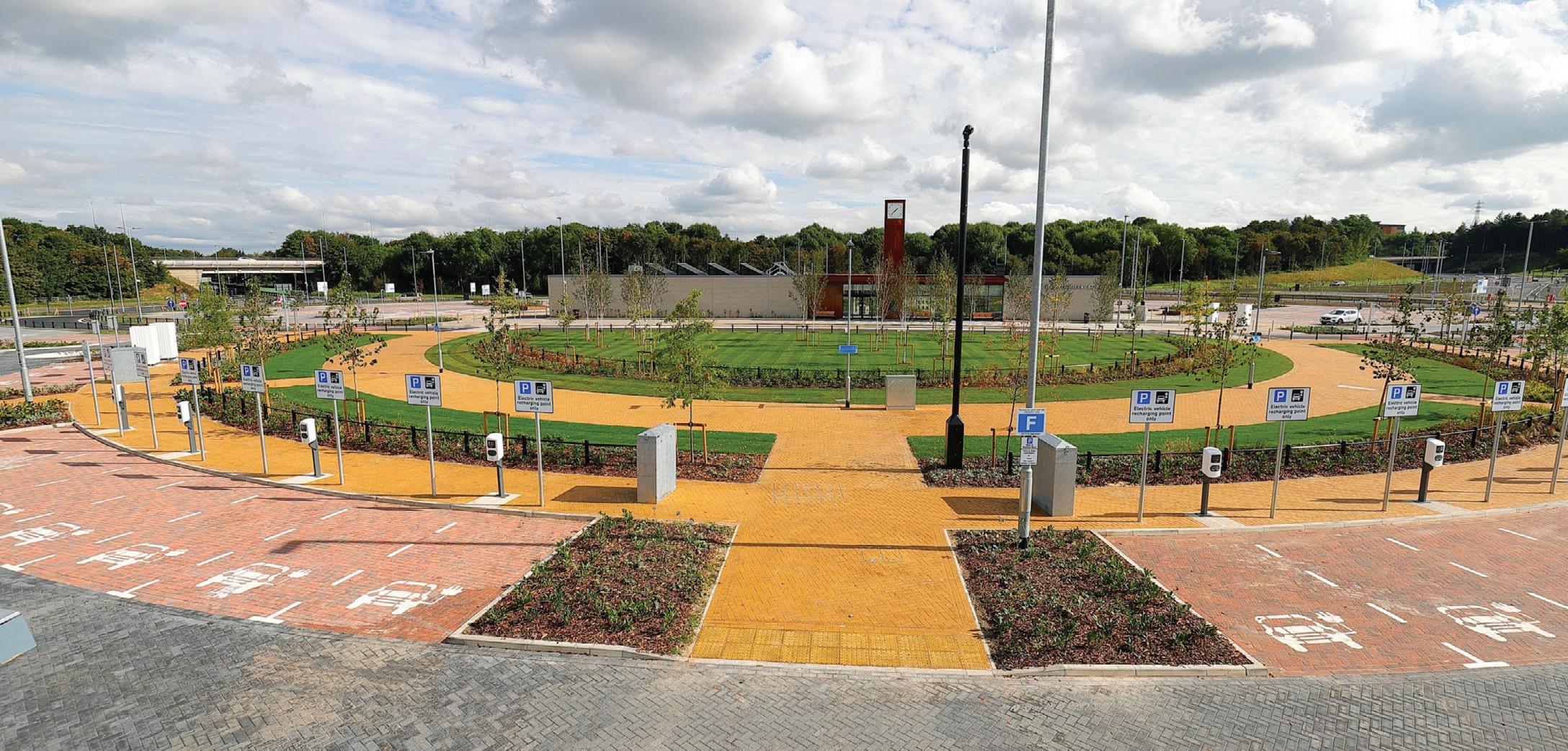
JustPark is boosting the adoption of electric vehicles by marketing a network of driveway chargepoints. Electric vehicle (EV) registrations grew five time faster than the growth of public charging locations during 2021. This means there are now fewer public chargers per driver today than there was in 2018. And in hundreds of towns and villages there is still not a single public charger. Parking provider JustPark carried out research to find out what consumers perceive as the biggest barrier to EV charging. The answer was that 62% of those surveyed said EV charging infrastructure is the biggest barrier to EV adoption. This result got JustPark thinking. The company, which was a pioneer of driveway rentals, saw that nearly 400,000 EV charging points already exist on people’s driveways.
Anthony Eskinazi, founder and chief executive of JustPark, says: “If we combine the two together, we have the ability to create the largest charging network in the UK, using the power of the community. We just need the help of the community to make it happen. It’s really simple. Those with a home electric vehicle charging point can make it available for others in their community that don’t have the ability to charge at home.

“Drivers in the local community are able to book and pay to use it, via the JustCharge network. JustCharge can unlock the potential for millions more drivers to switch to an EV, by providing reliable, bookable and convenient charging for those who can’t do so at home. Bookability of chargers is key to the success of a scheme such as JustCharge. You no longer have to fear driving around, looking for a charging point, risking an empty battery. Instead, you can find and book a charger in advance: it only takes a few minutes and removes all that hassle.”
Award sponsored by
JustPark has partnered with a range of businesses to promote the JustCharge concept, including: Vauxhall; elmo; Right Charge; Octopus Energy; and Visa. JustPark has also launched an alternative to the government’s OZEV grant. The JustCharge Grant invites people to apply for £350 off the cost of a charger and installation in return for listing their charger on the JustCharge network.
Eskinazi says: “The UK is facing an EV charging crisis. Today, over 50% of UK drivers can’t charge an EV at home. They may live in a flat, or a house without a driveway, or in shorter term rental accommodation. To make matters worse, the public onstreet charging network is limited, especially outside of London. So without a regular place to charge near home, owning an EV for this group is not feasible, especially for those outside of a major city. JustCharge enables drivers to switch to an electric vehicle by unlocking the power of home charging for everyone. We are using our superpower of sourcing spaces within the community, to support the transition to EV.”
JustCharge offers a smart way to harness domestic chargepoints to boost the adoption of electric vehicles. And with driveway chargers typically being unused for 90% of the time, the scheme is also a handy way for EV charger owners to make some extra cash whilst helping their neighbours.
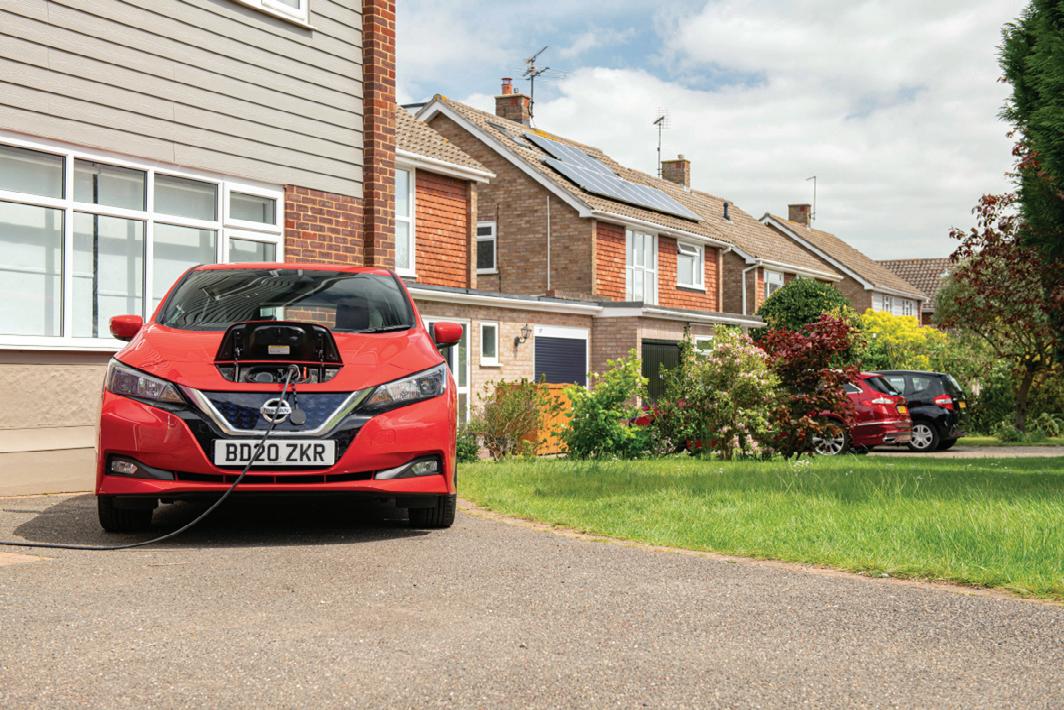

Flowbird has announced that Bertrand Barthelemy is to step back from his role as chief executive in order to focus on his role as a board member of the international parking system manufacturer.
Frédéric Beylier is replacing him as chief executive officer.
Beylier said: “I am thrilled to join Flowbird at this crucial moment in its development. Flowbird are the world leader in their industry, a partner of cities and mobility organisational authorities, simplifying their lives and those of their citizens for urban mobility and digital payments. We will rely on the company’s foundations to develop new technologies and services that benefit our clients, in a world where environmental and digital transitions are at the heart of everything we do. This project carries real meaning and ambition, and I am impatient to start collaborating with our teams, recognised around the
world for their expertise.”
Beylier has most recently been working advisor to executive management at companies dealing with accelerating growth and transformation such as April and Aresia Groups. Previously, he was deputy managing director and a board member for six years at Oberthur Technologies (now Idemia), a company supplying payment, telecommunications, transport, identity and security solutions.
Beylier spent five years as deputy managing director of
France Champignon, a mushroom production and sales operation. He started his career as a consultant at EY and AlixPartners.
Barthelemy, who has led the company for 12 years, said: “I am proud of all that has been accomplished while I have been leading Flowbird. By listening to our clients and leaning on innovative technologies and our sector expertise, we have evolved our equipment, bringing value to cities thanks to software offers and payment services.
Williams is also chair of the Alliance for Parking Data Standards (APDS) and president of the European Parking Association and BPA council member.
The NPP board
• Anthony Ferguson, deputy director, traffic and technology, DfT (chair)


“During these past 12 years, the company has become the undisputed world leader on the market. Flowbird is the preferred partner of over 4,350 cities, and is the only company with such a wide range of products and services that help cities orchestrate mobility on their territory.
“Over the next decade, the new user services that we’re experimenting with our partner clients will take hold in all cities: making journeys simple for users through mobile and contactless payment, encouraging multimodal transfers with mobility as a service applications, facilitating access in the public domain to electric vehicle charging, embedding mobility services in connected vehicles, and dynamically adapting infrastructure to different uses to reduce congestion and control urban logistics. All these services will become standard.
“Creating a managerial team that looks ahead to a ten-year horizon was important for me. I have every confidence in Frédéric to lead it, and I wish him every success.”
Indigo Cloud is a provider of cloudbased debt collection software. It has appointed Ian Simpson as director of business and client development, a role in which he will be defining new market strategies, driving sales, and overseeing client relationships.
The National Parking Platform (NPP) has announced its new management board. The NPP is a local authority-owned pilot project that brings customer experience into the 21st century by facilitating data exchange, digital payments, and a new way of delivering better parking and mobility services.

The project is funded by the Department for Transport (DfT) which provides a number of board members, including its chair Anthony Ferguson.
There is also a strong representation from the British Parking Association (BPA), with many of the board members holding elected positions. “We are working with the Department of Transport to
help deliver a National Parking Platform based on the Manchester pilot project,” said Jon Allan, BPA head of technology, innovation and research. “As parking management becomes increasingly digitised, the importance of data and digital payment systems is paramount.”
The NPP advisors are Parking Matters directors Keith Williams and Nigel Williams. Nigel
• Michael Dnes, head of future roads technology, DfT
• Graham Hanson, head of smarter traffic management, DfT
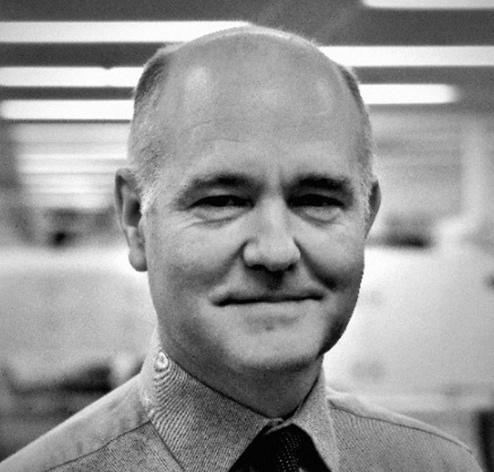
• Matthew Bennett, director of commercial and operations, Manchester City Council (chair of NPP steering group)
• Ian Anderson, director of law and partnerships, Hull City Council
• Ken Prior, parking manager, Cheshire and Chester West Council
• Sarah Randall, assistant director of traffic and parking, Newham Council
• Conor Greely, director, Carflow
• Phillip Hammer, parking operations manager, Cambridgeshire County Council.
Simpson is a collection and recovery specialist who has been active in the sector since 1997, working for the likes of Transcom, GE Money, NewDay and Business Financial Services (BFS/Nuula).
Simpson said: “I am delighted to join the Indigo Cloud team, especially at a time when cloudbased, streamlined collection software like DebtView is answering the needs of an increasingly distributed workforce, as well as providing simple, elegant solutions for new fintech and collection suppliers alike.”
Mark Morrall, managing director, said: “Ian’s wealth of knowledge across the collections and recovery sector is just what we were looking for to drive our growth into the wider consumer and commercial markets. “


Veterans in Parking UK is a new British Parking Association (BPA) initiative that seeks to help former military personnel build careers in the sector.
The BPA says it recognises that there are already many former soldiers, sailors and air force personnel working within the sector who have previously served their country and who bring with them a wealth of knowledge and skills to their respective organisations.
Over 100 ex-servicemen and women have already signed up to a dedicated LinkedIn group.
BPA president Jade Neville said: “There is something to be said about the power of connecting people and, as promised in my presidential speech in July, we are creating opportunities to better connect our community.
“We have created the Veterans in Parking community, which
will be a social space for veterans, reservists, their spouses and military family members working within the parking sector.”
The intention is for the group to promote job opportunities and careers for those leaving, or have left, the military and increase awareness of parking within these communities.
Unity5 has appointed Hannah Fuller as its head of strategic relationships, a role that will see her work closely with key clients and partners.
Unity5 is the parent company of ZatPark, a provider of parking management software.
Fuller said: “I’m excited to join the team as Unity5 continues its rapid growth trajectory, and I am looking forward to bringing my experience with clients as well as broadening my knowledge in the parking technology sector.”

Fuller has spent several years working within the parking industry with previous roles at PayByPhone, and most recently at JustPark where she was client services director.
She also co-founded the British Parking Association’s Women in Parking Group and plays an active role in the parking community.

Fuller joined the Unity5 team on 14 November.

Celina Herbert, director at Unity5, said: “We are so thrilled that Hannah is joining our growing team. We’re
confident that with her extensive experience she will be an invaluable asset as we continue to develop our ambitious plans.”
Meanwhile, Leadley Wilson has joined ZatPark as training manager. He will be providing both internal and external training, while also evolving training offered to both the private and public sectors.
Launched by Dave Herbert and Lukasz Kieruczenko in 2010, ZatPark helps operators to become more efficient and effective through the automation and systemisation of back-office processes.
An early initiative of the new network is a transatlantic partnership, announced on 11 November, which is Armistice Day. Veterans in Parking UK has linked up with the United States’ Veterans in Parking. The organisations have agreed in principle to the creation of a strategic partnership alliance (SPA).

The organisations share a joint mission: to raise awareness and promote opportunities for military veterans enabling them to enter into meaningful and rewarding careers in the respective parking and transportation sectors in the UK and the USA.
Dave Smith, BPA head of communications, said “We are delighted to form this alliance with Veterans in Parking. A key theme of our association’s new strategic plan will be to promote an inclusive and professional sector.
Veterans in Parking provides an opportunity for us to champion our sector as an inclusive place for veterans to work, and to help them navigate recruitment challenges with tangible support and guidance as part of our dedicated community.
“By working together on both sides of ‘the pond’, Veterans in Parking and Veterans in Parking UK will enjoy a larger geographical footprint, enhanced visibility, and the opportunity to combine resources to further their common mission.”
We currently supply and have vacancies around the UK for Permanent and Temporary positions:
• Civil Enforcement Officers
• Environmental Enforcement Officers
• Parking Back Office (Appeals/Notice Processing/Correspondence)
• Parking Change Management
• Interim Parking Managers
• Car Park Attendants/Marshalls/Stewarding
• Parking Supervisors (Both Enforcement and Back Office)

• Parking Management (Both Enforcement and Back Office)
• Heads of Parking/Directors
• Parking Technologies (Business Development and Project Managers/ Field Service Engineers/General Managers)
• Off Street Parking (Business Development, Contract Managers and Regional Managers)
• CCTV Operators – SIA and BTEC qualified
Looking for staff or need employment?
Please contact our experienced team on:
Tel: 0203 668 5680
Email: parking@unity-recruitment.co.uk

Web: www.unity-recruitment.co.uk

Heidi Turner shares the results of Disabled Motoring UK’s Baywatch 2022 survey
During August Disabled Motoring UK (DMUK) asked the public to help us with our annual Baywatch campaign. We called on disabled motorists to complete a survey about their parking experiences over the past 12 months. The results have now been calculated. The level of response completely surpassed all records with 1,028 people responding to the survey. It is the first time in the campaign’s history that we have reached over 1,000 responses. This level of response shows that disabled parking abuse continues to be a primary concern of disabled motorists.
This year’s survey again confirmed that most disabled motorists, 78.12% of respondents, think that local authorities are not doing enough to tackle disabled parking abuse. This figure is significantly lower than last year (95.9%) which does suggest that some local authorities are doing more to tackle this issue.
The survey also revealed that 67.16% of the respondents had never had their Blue Badge inspected by an official. This was lower than last year’s figure of 85.3% which again suggests more is being done to police the scheme. Respondents were still adamant that they wanted to see more inspections with 94% of respondents answering ‘yes’, they would like to see more inspections.
It is clear from these findings that local authorities still need to do more to enforce the Blue Badge scheme to ensure that disabled parking bays are available for genuine Blue Badge holders. However, it does seem that we are starting to see improvements for some. We hope that this positive trend continues.
When it comes to finding suitable disabled parking bays at supermarkets, 39.2% of those surveyed said that it was ‘easy’ and 11.6% said it was ‘very easy’. However, 81.9% of respondents also stated that they ‘very often’ or ‘often’ see disabled parking bays being abused. This would suggest that there is still more work to be done in the correct management and enforcement of those bays. These figures have remained consistent from last year’s survey so we have not seen much change at the supermarkets.
We asked participants when they had reported abuse to supermarket staff did they take action and 68.7% said no. Supermarkets are not doing enough to enforce their disabled parking bays and support their disabled customers. The disabled bays still aren’t being managed properly and enforcement is definitely lacking.
Similarly, to last year, the survey also asked people to provide details of the parking experiences on everyday journeys (not just to the supermarket). This figure has fallen since last year and in response to these types of questions 56% of the respondents stated that it was either difficult or very difficult to find suitable disabled parking. In 2021 this figure was 79.5%.
However, in this section of the survey, we also asked the respondents how often they saw disabled bays being abused on their everyday journeys. In response to this question a concerning 87% of respondents said that they either saw this occurring ‘often’ or ‘very often’. This figure, consistent with last year, is alarming and shows that the wider parking industry is not doing enough to enforce disabled parking provisions.

New to this year’s survey we asked, ‘Do you think that abusers of the Blue Badge scheme should face prosecution’ and overwhelmingly 93.2% said ‘yes’. We also asked participants if they had any ideas on how to better enforce the scheme. There were several respondents that made similar suggestions of more inspections, higher fines, and putting the picture on the front of the badge.
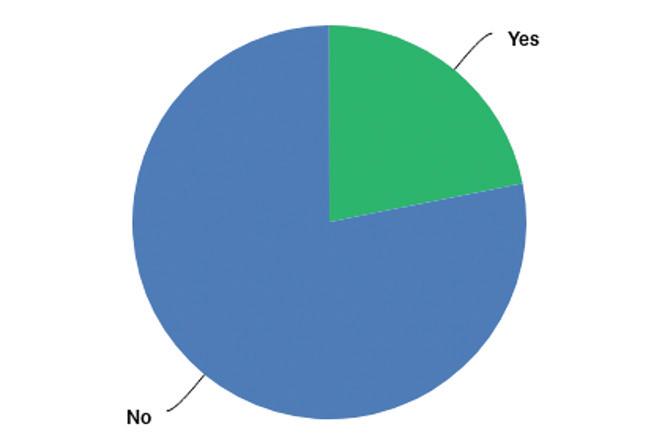
Q: Do you think local authorities are doing enough to tackle Blue Badge abuse?
Q: When parking at the supermarket how often do you see disabled parking bays being abused?
Some people wanted to segregate disabled parking so that wheelchair users had their own bays and asked for more thought to go into disabled bay placement. For example, not to always be right in front of cash points. There were several suggestions that want to utilise technology and involve cameras and scanners in enforcement. Some participants had also clearly read our article on East Sussex County Council and its ‘Blue Badge awareness course’ and wanted to see this in other areas of the country.
With the ban on the sale of new diesel and petrol cars in 2030 we are seeing more electric vehicles (EVs) on our roads. We know that much of the current public charging infrastructure is not accessible. We asked participants if they had seen any accessible public charge points in their local area and 58% said no. This is extremely disappointing especially with the EV switchover rapidly approaching. DMUK finds the overall findings of our Baywatch Campaign very troubling. Being able to park at one’s desired destination is something that is crucial to the independence of disabled people.
We are encouraged to see some improvement since the 2021 campaign, but progress is not happening quickly enough. Unfortunately, the survey shows that disabled motorists are still being disadvantaged. The poor state of the nation’s disabled parking provision and enforcement continues to prevent disabled people from living independent lives. It is vital that the parking industry now understands the importance of providing adequate disabled parking and making sure it is properly enforced. It is also important that disabled motorists aren’t left out when it comes to electric vehicles.
We are thrilled to have received so much support for this year’s campaign. Getting over 1,000 responses is a first for the charity and it also shows how important parking is to disabled people. We are pleased to see some improvements for disabled people when parking on their everyday journeys, but supermarkets continue to disappoint. The charity will continue to seek ways of better enforcing and managing the Blue Badge scheme so it is protected for genuine badge holders.
Disabled Motoring UK is celebrating its centenary, marking 100 years of supporting and campaigning on behalf of disabled motorists. DMUK is the product of the merger of two charities, Disabled Drivers Motor Club (DDMC) and Disabled Drivers Association (DDA). The first of which, DDMC, formed in 1922 when a group of First World War veterans came together whilst they were having artificial limbs fitted at St. Mary’s Hospital in Roehampton. This era predated the NHS and social services and there was a real prejudice at the time towards disabled drivers with many believing that disabled people should not be allowed to drive at all.
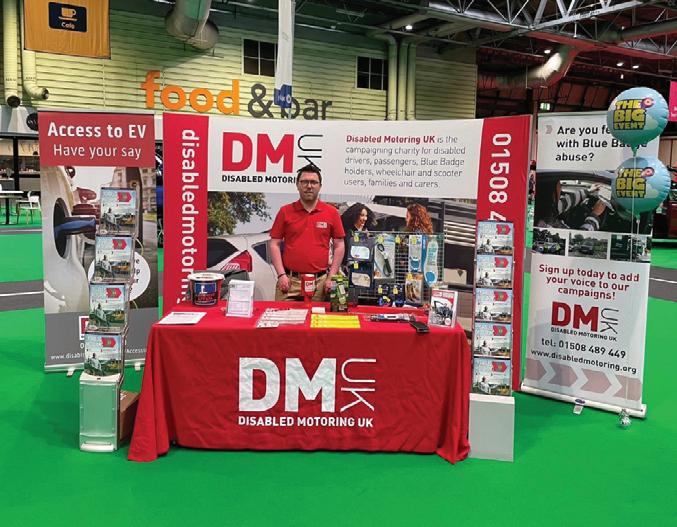
DDMC was instrumental in the 1930s in campaigning on this issue and they did win the right for disabled people to hold a driving licence. One of DDMC’s main activities was to provide information on suitable cars, adaptations, insurance, driving tuition and petrol allowance.
In the years that followed World War 2 there was a push in the UK to help injured exservicemen and disabled people to become more mobile and thus achieve a degree of independence. Invalid trikes were leased to applicants by the Department of Health. Having contracted polio and becoming paralysed from the waist down while serving in the Royal Navy in 1945, OA (Denny) Denly was issued with a petrol powered Argson tricycle. In June 1947 he crossed the Swiss Alps on it, and in August the same year listeners to the BBC Home Service were enthralled by the broadcast about his extraordinary expedition. Following this attention the Invalid Tricycle Association was formed in 1948. This later became the Disabled Drivers Association when trikes were phased out and replaced by the ‘minicar’ and, later, Motability.

The two organisations continued to
campaign separately and the golden years of campaigning for both organisations were the 1970s. In these years the Orange Badge (which we know today as the Blue Badge) was created and Mobility Allowance, which led to Motability, was introduced. Merger was talked about for many years and in 2005 they eventually did, the two organisations becoming Mobilise, which was later rebranded in 2011 and is the charity we know today, Disabled Motoring UK.
With the death on Denny Denly in 2010 it was decided to replicate this epic journey of 1947 both as a memorial to the man and to raise awareness with central government of the issues affecting disabled motorists. The Alps Challenge was successfully achieved, but only with the cooperation of individuals, corporate bodies, and the army!

DMUK’s prolific campaigning track record has seen the creation of the Blue Badge, Mobility benefits, Motability, Vehicle Excise Duty (VED) and VAT exemptions, and congestions charging exemptions. DMUK continues to campaign with an emphasis on proper enforcement of the Blue Badge scheme, disabled parking standards and, mostly recently, the switch over to electric vehicles and clean air zones. As well as campaigning the charity had a rich history of providing support and information to its members and the public on mobility issues which it still does today.
In our centenary year we look to the future and know that over the past 100 years so many advancements have been made for
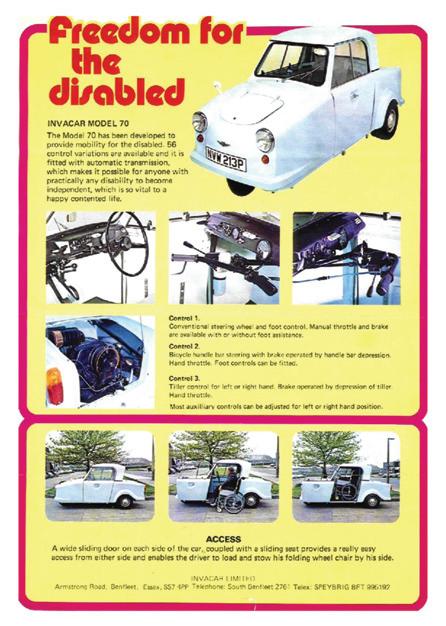
disabled people, but we know there is still lots more to be done. DMUK has faced a severe lack of funding in recent times and we do hope that the charity will be able to continue into the next 100 years to come. Currently the biggest challenge facing disabled motorists is the switch over to electric vehicles. From 2030 the new sale of petrol and diesel vehicle will be banned, and disabled people will not be exempt. There are huge obstacles to overcome which include, suitable vehicle choice, independent use of charging equipment and the lack of accessible public charging infrastructure.
DMUK is committed to help solving these issues so that disabled motorists can make the switch, but there is a real danger, due to finances, that the charity would not exist to see this switch over. It is vitally important that the charity continues to operate as it is now the only organisation left advocating for disabled motorists.
This only way we can continue to do this vital campaigning work is with the support of disabled people. We need your help, become a member of DMUK and support our campaigning work. It costs just £2.50 per month. Full members receive a monthly magazine, access to our information service and discounts on variety of goods and services.
The charity welcomes support from businesses through our corporate membership scheme. For more details please contact Disabled Motoring UK.



New guidance has been written on the design of multi-storey and underground car parks by the Institution of Structural Engineers. Design recommendations for multi-storey and underground car parks was first published in 1976 and has since gone through four editions. The institution says the new guidance is not a fifth edition, but instead represents a completely revised and updated set of information for anyone involved in car park design, construction, maintenance and reuse.
The new guidance has been edited by structural and parking consultant Chris Whapples working with a team of contributors. Whapples notes that when the first edition was published the average family saloon was almost 200mm narrower and 500kg lighter than today’s models.
Whapples said: “The updated publication reflects the significant changes to vehicular size, weight and manoeuvrability in recent years, to offer modern guidance on parking bay sizes and deck loadings. These trends are necessitating a new approach the internal layouts of car parks. Despite significant increases to vehicular size, weight and manoeuvrability, guidance on parking bay sizes and deck loadings has not, until now, truly reflected these evolutions.”
The guidance recommends the new length of a parking bay to increase from 4.8 metres (16 feet) to 5.0 metres (16.4 feet), and the
width of a standard parking bay is likely to increase from 2.4 metres (8 feet) to 2.6 metres (8.5 feet).
The revised guide also takes account of the rise of hybrid and electric vehicle (EV) use. Whapples said: “Even in the 11 years since the fourth edition was published, the huge rise in hybrid and electric vehicle use, together with the need for inclusive design and a far greater emphasis on sustainable solutions, have necessitated a substantial revision to internal layouts and requirements for structural design.”
The guide looks at the changing requirements for structural design, with particular attention to the minimisation of fire spread. The fire at the Kings Dock car park on 31 December 2017, a blaze that destroyed 1,360 cars, raised questions about the whether or not current fire regulations are adequate
The new edition of Design recommendations for multi-storey and underground car parks has two parts. The first part looks at the conceptual design of car parks and is primarily intended for clients, architects and project managers. The second section looks at detailed design elements, and is aimed at structural engineers and those involved in construction and maintenance.

The IStructE guide features the latest thinking on:
• internal layouts
• requirements for the structural design
• the impact of significant changes to vehicular size, weight and manoeuvrability
• making the required major changes sustainable,
• minimising fire spread.
The guide features 3D models that illustrate the positives and negatives of different parking layouts. There are chapters on sustainability and achieving zero carbon design. It looks at personal safety, including ways of preventing
The modification and upgrading of existing structures is also covered, as is discussion of special structures such as mechanical car parks.
There is also a section on asset management that is consistent with the Institution of Civil Engineers’ Recommendations for inspection, maintenance and management of car parks.
and how best to configure structural materials to minimise fire spread.
The IStructE guidance has been produced in parallel to work being undertaken to update Approved Document B for fire safety and a British Parking Association (BPA) Fire and EV Charging Infrastructure Advisory Panel.
The guidance is based on UK design methodologies and practice, and where possible or appropriate, has considered any likely updates to the Eurocodes and Building Regulations. However, IStructE said the principles set out in the guide have global applicability.

The guide, which will be published on 23 December, can be pre-ordered now.
www.istructe.org/resources/guidance/car-parkdesign/
Russell Simmons, managing director of Ballast Nedam, said: “I am very pleased to have had the chance to be involved in this publication as a contributing author, and also to represent the British Parking Association’s (BPA) interests in terms of driving up standards.
“I certainly see this publication as the go-to set of recommendations to follow when designing a car park. It really has brought the recommendations up to date, and is a much needed, relevant, reference point.”
Fiona Petch, director at Fatkin, said: “It was great to be invited to contribute to this! My first output as an author, other than some academic papers, and hopefully not my last.”
Dave Smith, BPA head of marketing and communications, said: “Larger parking bays will make it easier for everyone to navigate into and out of spaces, and reduce the risk of damage to other vehicles when opening doors.
“It will also hopefully mean that drivers are not spending lots of time circling around looking for spaces that they can easily access. The irony is that the future may see a trend for self-parking cars, which will mean the width of a parking bay will be less of an issue.”
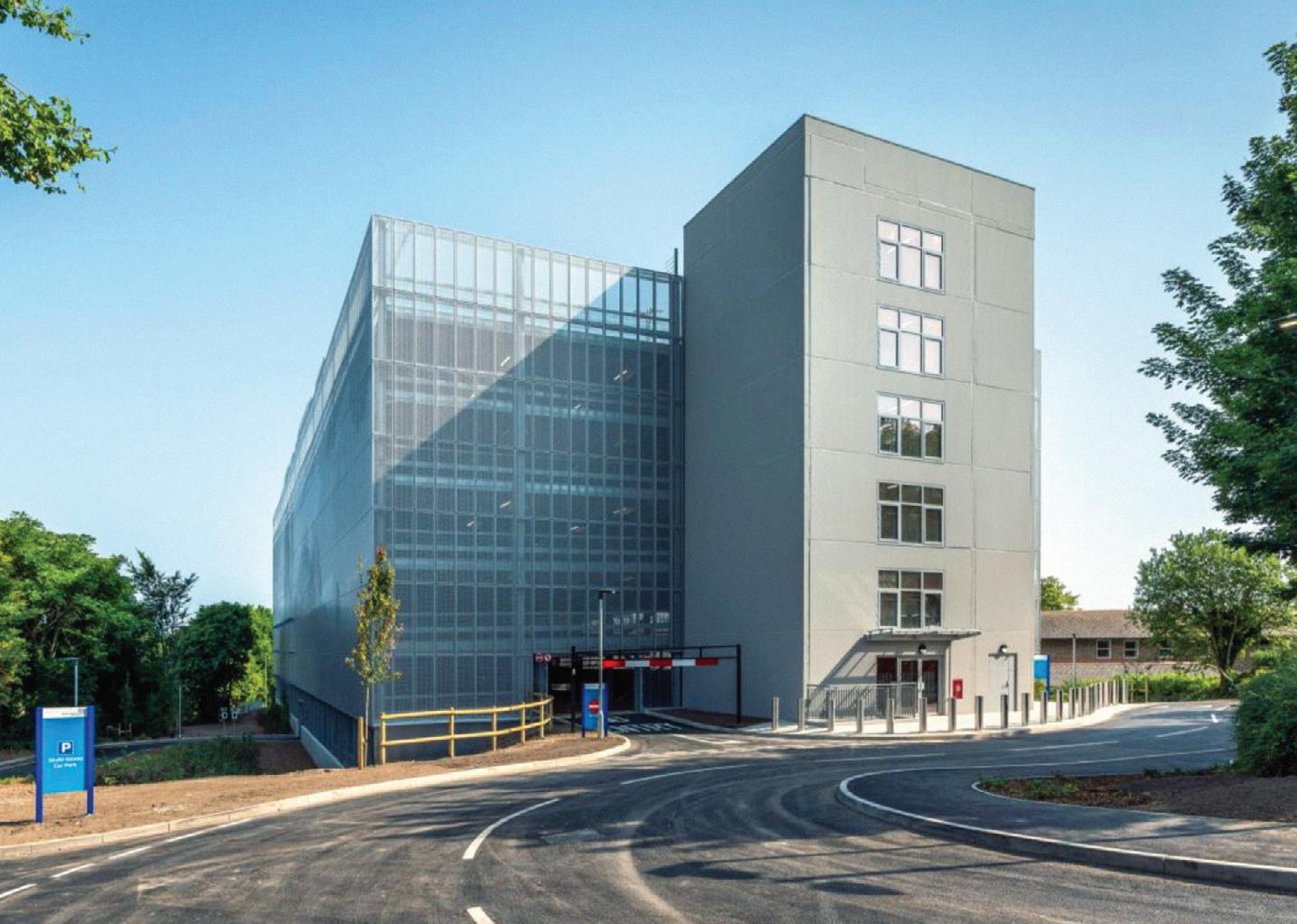
A new car park built at the Dorset County in Dorchester has been created with an eye on looking after nature by making space for birds, hedgehogs and insects.
The 654-space multi-storey car park has been created by Dorset County Hospital Foundation Trust to ease parking pressure on the rest of the site for visitors and patients.
The project is part of a government investment to improve services at the county town hospital. A spokesperson for Dorset County Hospital said: “Building a multi-storey car park has freed up land elsewhere on the hospital site so we can now forge ahead with our plans to expand the Emergency Department and Critical Care Unit as part of the New Hospitals Programme.”
The car park has been developed by Prime and was built by Willmott Dixon to designs by Stripe Consulting.
It has been set into the hill on a corner site at the bottom of Williams Avenue and Damers Road. This will allow for future expansion on the rest of the hospital site, including a larger accident and emergency department.
The seven-floor building won unanimous support from Dorset Council when its area planning committee approved the project in September last year. Dorchester town councillors were impressed by plans to minimise the impact of the building while saving as many trees as possible.
The new car park includes features to support local biodiversity, including bird boxes, hedgehog nesting boxes and insect friendly foliage. A wildlife corridor has also been created around the car park, planted with hedgerows and wildflowers the corridor provides a buffer zone between vehicle movement and wildlife.
Furthermore, the Willmott Dixon team donated and planted 600 tree whips in addition to 200 whips already planted on the rapidly emerging new community woodland at Kings Road in Dorchester.
The sustainability initiative was supported by Dorchester Town Council and volunteers from People First Dorset, Employ My Ability, The GAP Ecotherapy Project, Thomas Hardye School and Dorset Mind, a local mental health charity.
Community engagement has been at the heart of the project with local people and hospital staff playing a crucial role in choosing the local landscapes and landmarks that appear on three sides of the car park. Images of Portland Bill, Durdle Door and Corfe Castle can be seen on the perforated metal panels.
There was some opposition from residents who claimed it would be out of place in the town and might cause additional traffic problems at the junctions either end of Williams Avenue.
The hospital has responded to a neighbour’s comments about the need for roof-top lighting and for weeks now the top floor lights have been switched off.
Twelve electric vehicle charging points are included among the 654 parking spaces with the capacity to expand to 68 in the future.
There are no dedicated disabled spaces in the multi-storey car park. Instead, a new large disabled parking area has been created closer to the main hospital entrance to complement other disabled spaces by the other wings. There are dedicated spaces for patients receiving chemotherapy, radiotherapy and dialysis, as well as concessions for some visitors (see panel).
Building work has remained roughly on target, despite the impact of Covid and global shortages of some building materials. The car park was completed in July and

The car park will operate on pay-on-exit basis, with users only charged for the time they have been parked. The system allows drivers pay with payment machines taking coins and notes as well as credit and debit cards. Parking concessions are available on the site in special circumstances
When patients and visitors drive in at the Williams Avenue entrance they will take a ticket from one of the barriers and it will lift. The system has automatic number plate recognition (ANPR) software. Before leaving the site, drivers can pay for the time they have been parked at the new payment stations with cash or card. The barrier will lift automatically as they drive out, the system recognising the number plate.
Drivers dropping off and picking up patients will still need take a ticket, but will not need to pay if on site less than 20 minutes. If this takes longer than 20 minutes through no fault of their own, they will need to use the help button at the barrier and the transport team can talk to them and
opened to staff in August, with a public opening to take place as soon as the payment system has been commissioned.
On completion Dorset County Hospital’s deputy chief executive Nick Johnson said: “The construction of the multi-storey car park marks a major milestone in our plans to develop our hospital site. As well as improving parking for our patients, staff and visitors, the car park will free up the space we need to expand our clinical facilities and allow us to continue to provide outstanding care for years to come.”
The Dorchester hospital was awarded £77.3m of government funding as part of its New Hospitals Programme to expand its clinical facilities and improve the hospital’s capacity. Dorset County Hospital currently provides emergency and planned care to a population of approximately 300,000 across the west of the county.
lift the barrier.
Blue Badge holders can still park for free in the new dedicated disabled parking area in front of North Wing, or any of the disabled spaces near other main entrances. Blue Badge holders still need take a ticket on entering the site, but do not need to visit a payment machine before they leave –they will be able to scan their badge at the barrier on the way out so it lifts and they are not charged. Parking charges will remain in place for staff and the public. The fees will be used to offset the cost of the lease. The trust said parking charges for staff had to be re-introduced as they no longer receive central funding from the government that allowed them to subsidise staff parking during the pandemic. In the year 2020-21, parking charges accounted for an annual revenue of £725,000 for the trust. Figures from NHS Digital show staff parking charges totalled £342,586.
The trust is planning to move to a progressive charging system which would see staff in lower paid roles paying less as part of a tiered payment system.
A new multi-storey park & ride development is now in operation at Adanac Health & Innovation Campus in Southampton, serving staff at University Hospital Southampton NHS Foundation Trust (UHS).
Adanac is Southampton’s campus for health, innovation and commercial occupiers.

Located next to Junction 1 of the M2, the park & ride is designed to get people out of cars and onto public transport. UHS staff benefit from the facilities during the week and the service is available for the public to use at weekends for travel into Southampton.
The park & ride will act as the gateway to a range of new buildings that will offer UHS and other healthcare organisations space for new clinical facilities, training centres and administrative functions. These include new sterile services and an aseptic facility. There is also and a drivethru Costa Coffee.
The campus and park & ride are being developed in partnership with Prime.
The 1,000-space multi-storey car park was developed by Prime and constructed by HUBER Car Park Systems UK.
Prime worked closely with two planning authorities on the design of the car park. The appearance of the multi-storey was softened using extensive landscaping to provide interest along the southern border, while high-quality external materials envelop the building, in particular a stainless steel architectural mesh with alternate convex and concave arrangements.
An anodised aluminium panel on the front elevation provides colour and prominence, and the size of the steel frame was bolstered to accommodate a futurefit of solar PV panels.
The car park features 30 EV

charging points and infrastructure for a further 70 that can be added in the future.
All staff are eligible to apply to park at the facility at a cost of £2.50 per month. The car park is open between 6.30am and 10pm daily and the dedicated bus service runs every 10-15 minutes during peak hours. Travel time between the car park and the hospital site is approximately 10 minutes (2.5 miles).
Discussions are ongoing with Southampton City Council over the opportunity for weekend operations of the facility for public use for travel into Southampton.
David French, chief executive officer at UHS, said: “Our staff have been closely involved in design for this service and we know just how important it is for us to provide travel solutions

that are both cost-effective and reliable.
“The new multi-storey is the first of many really exciting opportunities for us at the Adanac Health & Innovation Campus, as we continue to grow as an organisation and work to improve the experiences of our staff.”

Southampton City Council, in partnership with Balfour Beatty Living Places, has delivered two road improvement schemes to support the new park & ride –the layout of the Frogmore Lane/ Brownhill Way junction immediately to the southeast of the facility was simplified to reduce delays and increase capacity, as well as reducing bus journey times. Improvements were also carried out at the Coxford Road/Lord’s Hill Way junction introducing a new rapid bus lane to improve bus journey times.
Both schemes were funded by the Department for Transport’s Transforming Cities Fund.
Ewan Forsyth, development director at Prime, said: “We are delighted to see the Adanac park & ride in operation. This is the culmination of over five years of activity for the Prime team.
“This car park represents an important gateway into both Test Valley and Southampton areas and therefore it was imperative that the building makes a strong and positive impact in its design and setting.
“Prime’s partnership with UHS is an integral part of the region’s transport strategy. The facility forms part of Southampton’s place in the Transforming Cities Fund, where the city council was awarded money to promote sustainable travel initiatives on a region-wide basis.”
We are connecting the dots of a new mobility revolution that is transforming our towns and cities.

With the broadest end-to-end portfolio of intelligent traffic management solutions, we work with cities, highway authorities and mobility
operators to make their road networks and fleets intelligent, enhance road safety and improve air quality.
It’s time to make the world a better place. We are ready. Are you?
A new British standard for the design of electric vehicle chargepoints aims to provide an inclusive experience for people with accessibility needs.
One in five people in the UK have a disability. By 2035 1.35 million disabled drivers will be partially or wholly reliant on public EV charging, however, research has shown there is a lack of accessibility for disabled people when using existing EV chargepoints.

Disabled motoring charity Motability conducted research which estimates that there will be 2.7 million disabled drivers by 2035, with up to 50% expected to be partially or wholly reliant on public EV charging.
The sale of new petrol and diesel vehicles will end in the UK by 2030. The UK currently only has 10% of the EV chargepoints it needs, accelerating the need for rapid change in EV charging design and installation
to ensure no one is left behind in the transition to electric vehicles.
In response to these challenges Motability and the UK government formed a partnership to co-sponsor PAS 1899:2022, a new accessibility standard for public EV charging points.
The accessibility standard was developed by British Standards Institute (BSI) in its role as the national standards body. Through the partnership,
A free online resource has been launched for local authorities looking to install public electric vehicle chargers in their communities. The EV Infrastructure Hub has been launched to act as an independent source of information.
Announced as part of the government’s Local Electric Vehicle Infrastructure (LEVI) funding programme, the hub is supported by the Office for Zero Emission Vehicles (OZEV), UK Research and Investment (UKRI) and Innovate UK.
Development of the hub has been a collaborative effort between the London Borough of Hammersmith & Fulham working with private sector partners including chargepoint operator Liberty Charge.
The EV Infrastructure Hub includes practical video content and case study evidence from local authorities who have well-established EV charging networks.
Besides providing access to best practice on launching schemes, the hub can be used to inform public engagement,
providing advice and guidance to overcoming objections, with advice on how best to recruit external consultants and chargepoint operators.
The hub sets out the importance of attracting a suitable private sector partner to the ongoing success of EV infrastructure projects. Information is provided regarding chargepoint operator site reviews, site surveys and the design and safety aspects of site location.
LEVI’s senior project officer, Dan McCrory, said that the EV Infrastructure Hub is a great step forward in the support available for local authorities: “The level of detail provided to guide local authorities through each stage of EV infrastructure planning, procurement and installation is a real asset for councils across the country.
“With practical examples, case studies and video content included throughout, the hub brings expertise and confidence to those seeking to install, develop or improve EV infrastructure networks for their residents.”
Motability awarded Designability with grant funding to explore electric vehicle charging solutions for the benefit of disabled drivers.
The standard covers the physical aspects of the environment surrounding fixed chargepoints (e.g. kerb height, ground type); the location, placement and spacing of chargepoints within the streetscape/public realm; the information, signals and indicators to be provided to users; and the factors to be taken into
account in the design and specification of accessible chargepoints (e.g. height of chargepoint, cables and cable management systems, bollard spacing, colours used on screens, weight and force and ease of use of the equipment).
PAS 1899:2022 aims to support the building of an inclusive EV charging infrastructure in the UK. The BSI hopes that it will help designers, procurers and installers to:
• anticipate and overcome restrictions and barriers that could prevent any user making full and independent use of the chargepoint
• accelerate innovative practices
• improve the efficiency with which EV chargepoints are deployed
• build confidence in the accessibility and inclusivity of EV infrastructure
• strengthen the risk management of EV projects.
The PAS standard can also be used by owners and operators to assess the accessibility of their existing chargepoints.
Mayor of London Sadiq Khan has announced that 100 new ultra-rapid public chargepoints will be rolled out across the capital next year. City Hall and Transport for London (TfL) will release land for charging points on roads suitable for businesses, emergency service vehicles and taxis
In a keynote speech at the Evening Standard Plug It In event at the Design Museum, Khan set out his plans. He announced that City Hall has identified sites on the TfL Road Network which will be suitable for a further 100 ultra-rapid chargepoints. The first 25 have been put out to tender and 75 more will follow by the end of April next year, with the aim for all 100 to be operational by the end of 2023.
London now has more than 11,000 public chargepoints, of which 820 are rapid or ultra-rapid. This is a third of the UK’s total and a 170% increase from 2019. London also has the most public rapid chargepoints by volume and share of any European city. There is one chargepoint for every four registered electric vehicles in London compared with the national average of one chargepoint for every 12 vehicles.
In 2019 Khan published an
Electric Vehicle Strategy, which was followed by the London EV Infrastructure Delivery Plan that envisages charging points being built at pace to meet the expected requirement of 40,000-60,000 charging points by 2030. Around 10% of these being rapid chargepoints.
Khan said London is on track to meet this target but to facilitate this ambitious goal, he wants to go further by facilitating space for a 100 new ultra-rapid chargepoints. Ultrarapid units can deliver a full charge in 20-30 minutes and are therefore most suitable for high mileage users, such as the emergency services, taxis and private hire vehicles, delivery drivers and local businesses.
Khan said: “It’s vital we don’t take our foot off the pedal and lose momentum. That’s why my administration has published its Electric Vehicle Infrastructure Strategy and set a target of quadrupling – at a minimum – the number of public chargepoints in London by 2030. Freeing up public land to deliver more charging points, and charging hubs will be crucial to hitting and, hopefully, exceeding this target.”
Bosch and Mercedes-Benz have reached an important milestone on the way to automated driving. Germany’s Federal Motor Transport Authority (KBA) has approved their highly automated parking system for commercial use at Stuttgart Airport.
The automated valet parking operation at the P6 parking garage run by APCOA Parking will be a highly automated driver less function to the SAE Level 4 standard.
With the vehicle and infrastructure taking over driving within the car park, drivers will be able to turn their attention to other things, instead of time spent looking for a parking space and manoeuvring in tight parking garages.
“The world’s first approval for customer use of our highly automated and driverless parking function, developed together with our technology partner Bosch, shows that innovation leadership and ‘Made in Germany’ go handin-hand,” says Markus Schäfer, member of the board of management of Mercedes-Benz
Group and chief technology officer, who is responsible for development and procurement at the car company.
“Following the market launch of our DRIVE PILOT Level 3 system, we will soon be offering a Level 4 system for parking with our INTELLIGENT PARK PILOT – all of that this year. We really are showing our customers how technology can make life easier and give back precious time.”
Dr Markus Heyn, member of the Bosch board of management and chairman of the group’s mobility solutions business sector, said: “Driverless parking is a key aspect of automated mobility.
The highly automated parking system we developed together with our partner Mercedes-Benz shows just how far we’ve already progressed along this development path. It will be with driverless parking that everyday automated driving will start.
“From the outset, Bosch has taken the approach of making the infrastructure in parking garages intelligent. Accordingly, we have set standards in this area. In the future, our aim is to equip more and more parking garages with the necessary infrastructure technology – we plan to do several hundred of them worldwide in the next few years.”
Drive in to the parking garage, get out, and send the vehicle to a parking space just by tapping in a smartphone app – the automated valet parking service has no need for a driver. Once the driver has left the parking garage – to spend the time just saved on doing something else – the vehicle drives itself to its assigned space and parks.
Later, the vehicle returns to the pick-up point in exactly the same way. This process relies on the interplay between the intelligent infrastructure supplied by Bosch and installed in the parking garage and Mercedes-Benz automotive technology. Bosch sensors in the parking garage monitor the driving corridor and its surroundings and provide the information needed to guide the vehicle.
The technology in the vehicle converts the information it receives from the infrastructure into driving manoeuvres. This way, vehicles can even drive themselves up and down ramps to move between stories in the parking garage. If the infrastructure sensors detect an obstacle, the vehicle brakes and safely comes to a complete stop. Only once the route is clear does it continue on its way.
In 2019 Bosch and Mercedes-Benz obtained the world’s first special permit to operate Automated Valet Parking using development vehicles without human oversight in everyday operations of the parking garage of the Mercedes-Benz Museum in Stuttgart.

The approval that has been issued for Stuttgart Airport goes beyond this, allowing commercial operation with privately owned vehicles in the P6 parking garage at Stuttgart Airport. The basis for the approval is a law that came into force in Germany in July 2021, which permits driverless driving in accordance with SAE Level 4 for motor vehicles.
SAE J3016 defines six levels of automation for road vehicle driving operations (Level 0 to Level 5). Level 4 states: The vehicle can autonomously handle all traffic situations under certain conditions (e.g. in a parking garage). No driver is required.
Application of this law to the parking system was implemented in close coordination with the German Federal Ministry for Digital and Transport (BMDV) and the KBA, Germany’s Federal Motor Transport
Frank van der Sant, a member of the board of management and chief commercial officer of APCOA Parking Group, said: “We are extremely pleased to have successfully developed a connected system for driverless and contactless parking together with our partners from Bosch, Mercedes-Benz, and Stuttgart Airport. Our digital platform, APCOA FLOW, can be used to book spaces, for contactless access to the parking garage, and for automatic invoicing of the stay in the garage.
“For our customers, this means a huge gain in convenience: planning certainty, hardly any wasted time, short distances to walk, and a contactless and cashless parking process.”
Walter Schoefer, management spokesperson for Flughafen Stuttgart, which runs Stuttgart Airport, said: “We are proud that STR has been chosen as the airport for this global premiere. The project shows how innovative our region is. Automated valet parking really enhances our flight passengers’ comfort and convenience and saves them time, especially when they’re in a hurry and just want to drop their car off quickly at the airport.”
Authority. The AFGBV (autonomous driving directive), passed by the upper chamber of the German parliament on 20 May 2022, specifies the criteria of the German road traffic act that Level 4 vehicles must satisfy.
The companies plan to gradually roll out the driverless parking service in the APCOA P6 parking garage at Stuttgart Airport. From the day it is released for operation, the first customers with SClass and EQS models built since July 2022 whose vehicle variants feature the INTELLIGENT PARK PILOT2 service as part of Mercedes me connect, and who have activated this service, will be able to use the function at the P6 parking garage.
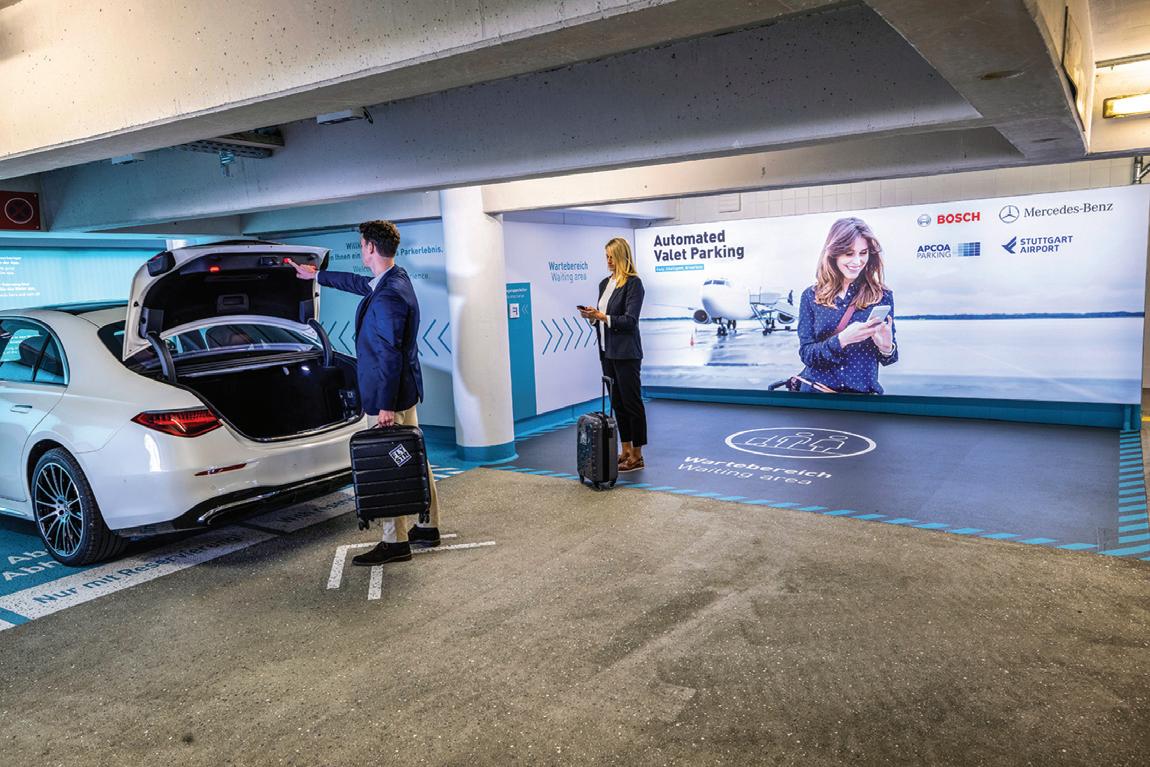
Once drivers have used their Mercedes me app to book a parking space in advance, they can leave their vehicle in a predetermined drop-off area. After all the passengers have exited the vehicle, the app starts the parking manoeuvre. The parking system checks whether the route to the booked parking space is clear, and that all the other technical requirements have been satisfied. If this is the case, drivers receive a notification in the app confirming that the intelligent infrastructure has taken control of the vehicle. They can then leave the parking garage. The vehicle starts automatically and finds its own way to its parking space.
When the driver wishes to retrieve their car from the parking garage, they can summon it via smartphone command. Their vehicle then makes its own way to a predetermined pick-up area.
Autonomous technology specialist aiMotive is working with indoor mapping and connected vehicle services provider Parkopedia to offer automakers scalable, autonomous parking solutions that minimise everyday parking hassles for drivers without relying on the presence of additional infrastructure within car parks.
The parking navigation solution has been designed to provide navigational support for drivers within both indoor and outdoor parking facilities by utilising aiMotive’s perception technology, combined with localisation information provided by Parkopedia’s indoor mapping service.
Within indoor parking facilities, such as underground and multi-storeys, the line of sight to satellites is blocked which prevents access to GPS. An alternative form of localisation is thus required to maintain the navigation services which drivers have become accustomed to on the road, as well as enabling mobility as a service (MaaS) and convenience services.
The aiMotive-Parkopedia partnership will see drivers provided with indoor turn-by-turn directions to accurately selected parking locations, such as to a prebooked parking space or to electric vehicle (EV) charging points.
It will also direct them to the closest available parking space to desired destinations or exit points, minimising overall journey time and maximising range.
The partnership will also enable autonomous parking services within any parking facility, without the need for prior training or testing, or the addition of any additional hardware at the location. The Type 1 automated valet parking (AVP) function for automated vehicles is also based solely on in-vehicle intelligence and integrated features that are already present in the vehicle. Once activated at a designated drop-off point, the vehicle is able to navigate parking structures to park itself, and, when summoned by the vehicle owner, will return to a predefined pickup point.
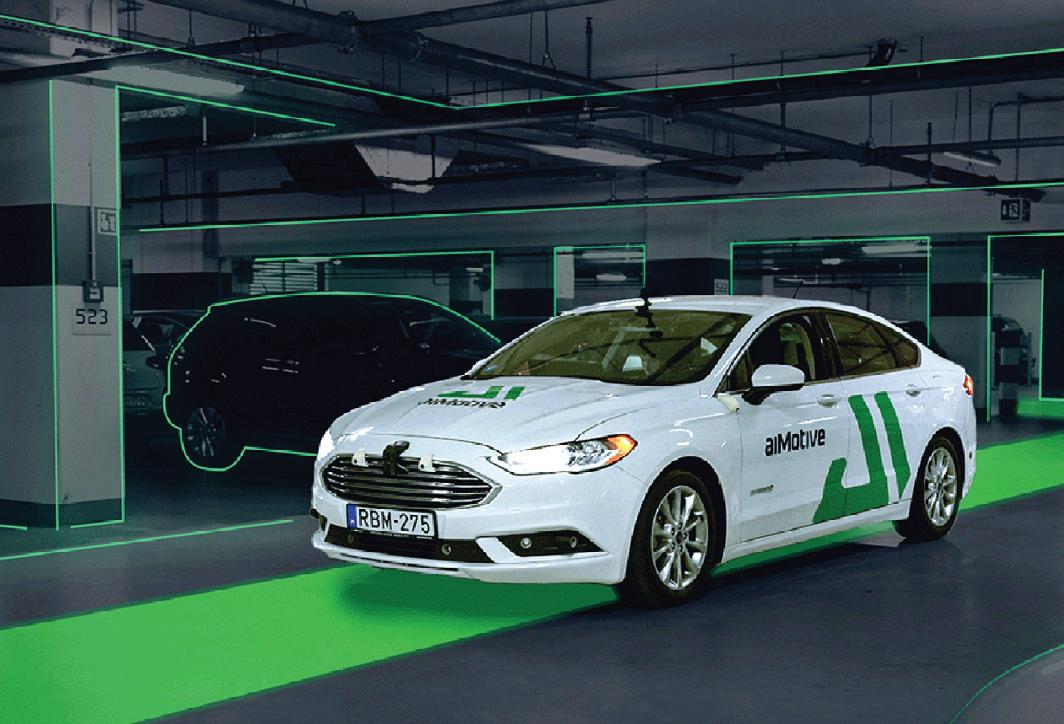
The partners say that AVP is likely to be the first SAE Level 4 automation product made pub-
licly available to drivers, due to the lower cost of implementation and lower risk profile of lowspeed driving in a constrained environment, however, it requires consistent and reliable global localisation and navigation within the entire area of operation. Parkopedia says it is able to provide the localisation required by using advanced robotics techniques combined with data from sensors present on most connected vehicles and landmarks that are already present in all car parks.
Brian Holt, chief technical officer at Parkopedia, said: “Every car journey begins and ends with parking, and, as such, it remains a critical element of in-car navigation systems to reach final destinations. Unfortunately, the current navigation experience ends at the entrance to parking facilities, leaving drivers short of their
Car-maker ŠKODA has launched a new Pay to Park parking payment service.
The parking service has been developed in collaboration with connected car services provider Parkopedia.
Following a pilot phase in Switzerland, ŠKODA Connect service Pay to Park service is now available in seven European countries, with plans to expand it to eight more European markets.

ŠKODA customers can use the MyŠKODA App or their car’s infotainment system to display parking options, view the fees and pay conveniently.
Martin Jahn, ŠKODA AUTO board member for sales and marketing, said: “Thanks to the new ŠKODA Connect
feature Pay to Park, our customers can now find available parking spaces across Europe even faster and pay conveniently online using our MyŠKODA App or the infotainment system.”
Following the pilot phase, ŠKODA AUTO is initially introducing Pay to Park in Switzerland, Austria, Belgium, Denmark, Finland, Germany and Norway. This will
intended end destination. By combining aiMotive’s technology with our HD indoor maps, we are able to extend and enhance the navigation experience and provide the bridge to autonomous parking and its associated benefits in the future.”
To date, Parkopedia has completed multiple proof of concept use cases for indoor maps with global automakers and has generated comprehensive coverage of major parking facilities on a global scale. The partnership will provide automakers with the opportunity to distinguish themselves with highly valued convenience and comfort features that are simple to implement and require no infrastructural change or specialist hardware to deliver indoor navigation or as part of full AVP delivery.
Gábor Pongrácz, senior vice president of aiDrive, said: “aiMotive strives to develop truly scalable and innovative automated driving software and related tooling. Our parking solution also follows that mindset. Relying only on in-house-developed vehicle-based intelligence and sparse HD maps, Parkopedia is a natural partner to us.
“The maps provided by Parkopedia were precise and detailed enough to be used in our AVP solution for localisation and path planning right away. Jointly, we can greatly accelerate the adoption of AVP technologies, being able to deploy to any facility that is mapped.”
then expand to a further eight countries –France, Hungary, Iceland, Italy, the Netherlands, Slovenia, Spain and Sweden –before ŠKODA rolls out the service in other European markets in 2023.
Customers can use the service via the MySKODA App on their smartphone or the current Amundsen and Columbus infotainment systems. The in-car app is now available for the FABIA, KAMIQ, SCALA, OCTAVIA, KAROQ, SUPERB and KODIAQ models.
To use Pay to Park, customers must have an active ŠKODA Connect account and have remote vehicle access enabled. Once the payment data is collected in the MyŠKODA App and the service is activated, it can also be accessed instantly via the infotainment system, and ŠKODA drivers can see which parking spaces they can pay for online. When they reach a parking location, the driver can select the parking time and extend it using the app if necessary. Payment is made online after the parking session has ended.
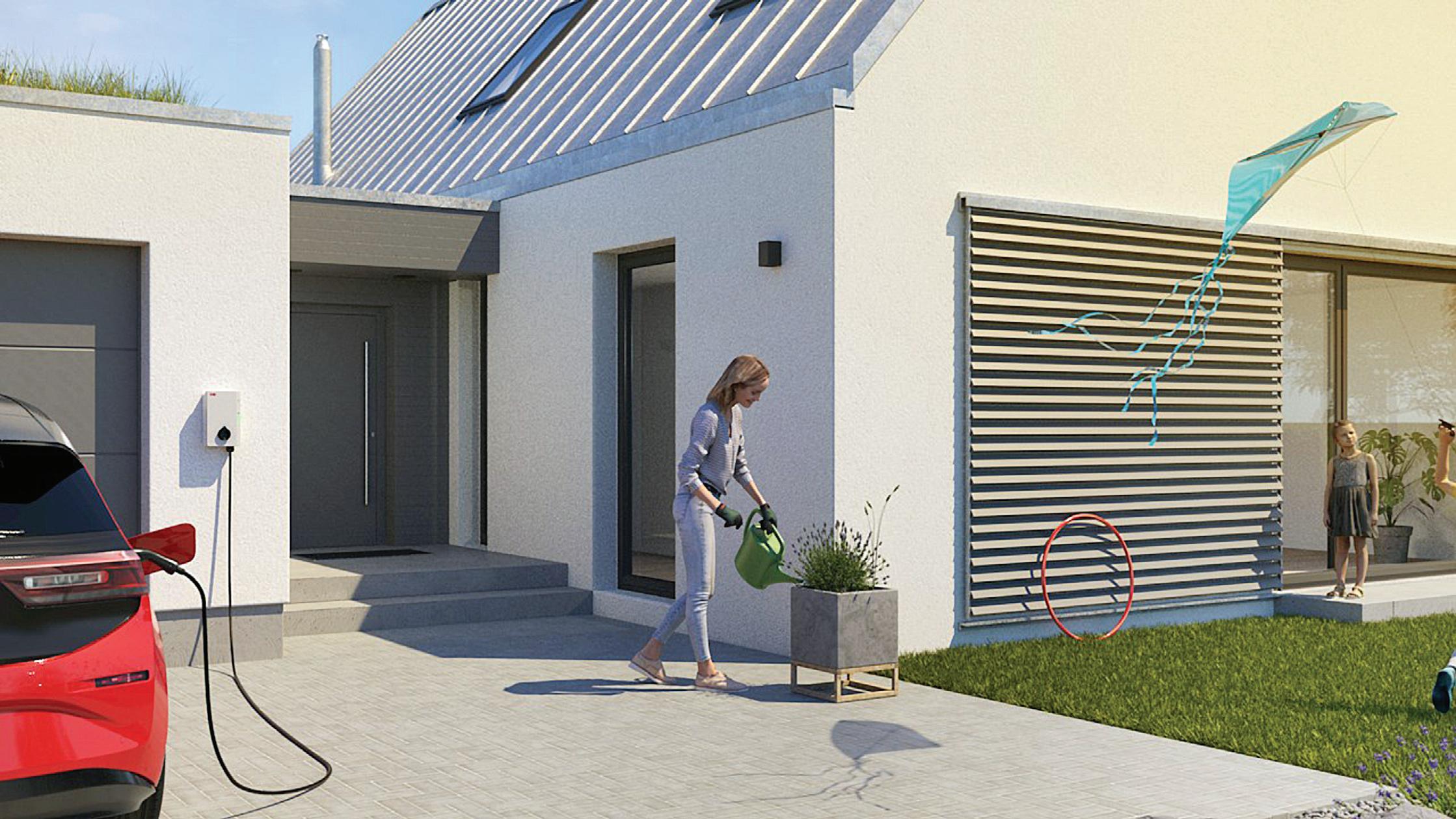
Children are already driving the EV revolution, despite not yet being able to get behind the wheel themselves, a new global survey has found.
Conducted by ABB E-Mobility, the survey revealed that children not only educate their parents on environmental issues and admonish them for un-eco-friendly behaviour, but also contribute to discussions around purchases such as electric vehicles.
The study comprised of 2,500 parents (with children aged 8-16) and 2,500 children (aged 8-16), of which 10% were from the UK. The other international participants represented ABB E-mobility’s nine other largest markets: Canada, China, France, Germany, Netherlands, Norway, Sweden, Switzerland, and the USA.
The project’s key findings demonstrate the crucial role that the next generation has to play in helping reduce emissions and enable a more sustainable future.
“It is encouraging to see that young people in the UK feel excited to drive electric vehicles when they are old enough, and that they feel they have a say in their parents’ choice of car,” said Oliver Johnson, business development manager for ABB’s EV charging solutions in the UK.
“In 2030, the UK will stop sales of petrol and diesel vehicles and 300,000 public chargers will be available, as well as countless private chargers. That’s only
eight years away, the same age as an average car, which makes buying an EV an investment in the future as well as being the right thing to do, which is why we have committed to an all-electric fleet under our ABB Sustainability Strategy 2030.”
With over eight out of 10 UK parents (82.8%) and three-quarters of UK children (75.6%) considering the current global environmental situation to be bad – more than the global average – the survey revealed a good deal of intergenerational interaction over the causes of climate change and the steps towards mitigating it. To that end, 49.8% of UK parents said that they have been educated by their children on environmental issues.
Three in five UK children (60%) say that they want to drive an electric vehicle when they are old enough and have passed their driving test. This is more than the global average of 52.4%. Around a quarter of UK children (26.8%) want to drive a hybrid
and just 13% want to get behind the wheel of a petrol or diesel car.
With 70.8% of UK children responding that they believe they influence their parents’ purchasing decisions over big ticket items like changing the family car, it is perhaps unsurprising that 80.2% of parents said they would switch to an electric or hybrid model if they were to buy a new car in the next three years. More than half of UK parents (52.4%) also believe that an EV is a better financial investment than a petrol or diesel car.
Other topics covered in the global survey further revealed both the momentum towards e-mobility and areas in which work remains to be done. More than eight out of 10 UK parents (82.6%) said that having an EV charger – such as ABB’s Terra AC wallbox – installed would make them more likely to buy a property, demonstrating the importance of facilitating easy and convenient charging.
Room for improvement remains, however, with 56.6% of UK parents revealing that their company’s policies do not support a switch to EVs. As the International Energy Agency (IEA) projects that EVs will represent 30% of vehicles sold globally in 2030, it is expected that charging at home and the workplace will be critical in meeting much of the overall demand in addition to a ninefold expansion of public chargers to over 15 million units worldwide by the end of the decade.
It is encouraging to see that young people feel they can have a say in the parents’ choice of car
Oliver Johnson
Exploring children’s surprisingly wise and sometimes whimsical ideas for saving the planet
Children are keen to see their parents make the switch to electric vehicles in order to save the planet. A new survey suggests kids are interested in recycling, saving water, a switch to plantbased diets and reducing the use of plastic. On the other hand, such sensible thinking may be offset by many regarding kangaroos and trampolines as viable modes of transport.
A key finding of the survey is that 54% of children want to buy an EV when they are older. The research also highlights that 51% of children are worried about climate change, with a quarter (25%) stating they would like to see an increase in electric vehicles (EVs) to reduce reliance on petrol and diesel.
The survey was commissioned by LV= General Insurance and its electric car division ElectriX.
According to the survey of 800 kids aged 6-12 years old, when asked how they would like to protect the planet 44% said they would like to see their own family make the jump from petrol or diesel to an all-electric model.
The study found that kids want to save the planet by encouraging people to eat more carrots to improve night vision and reduce the use of lights, whilst others would be happy to do their civic duty and reduce water use – by stopping brushing their teeth.
There were even suggestions about sending astronauts to the sun to bring back light to save on energy costs, banning homework to save paper, replacing cars with kangaroos and even having cars powered by alternative fuels such as custard.
Researchers also explored children’s feelings about climate change, finding 67% have tried convincing their parents to be more ecofriendly. More than half (58%) of kids believe grown-ups should be doing more to help the planet.
The research also found that 52% of those surveyed have told off mum, dad or a guardian, for doing something that was not helpful to the planet, with 32% expressing concern about mum or dad driving a petrol or diesel car instead of something more environmentally friendly. The top reasons parents got a telling-off from the kids was for buying new clothes when they’ve got a wardrobe full already (32%).
Nearly seven in 10 (69%) of the children polled who are aware of climate change, learned about it at school, followed by family members (43%) and seeing information on the TV (36%).
Gill Nowell, head of EV communications at ElectriX, which is part of LV= General Insurance, said: “It’s great to see the next generation thinking about innovative ways to
To tie in with the survey, LV= General Insurance and ElectriX joined forces with toy car manufacturer Little Tikes to give the iconic Cozy Coupe toy car a one-off electric makeover. The makeover saw the petrol cap of a modified version of the Go Green Cozy Coupe Dino replaced with an electric socket and charger

The original Cozy Coupe was released in 1979 and has become the UK’s best-selling ride-in toy car, with 180% more cars sold in 2022 so far. During this time, many new styles of the Cozy Coupe has been released including the Cozy Coupe Dino, Princess Cozy Coupe, Cozy Coupe Black Cab and many more.
Alaina Cornish, senior brand manager at Little Tikes UK, said: “The Cozy Coupe has been an integral part of so many of our lives since its launch in 1979, so we’re delighted to undertake our collaborative project with LV=, with the concept of the first-ever one-off electric makeover for the Cozy Coupe. It’s the same iconic outdoor toy, brought forward with an electric charging point, socket and an all-electric dashboard. We hope the one-off iteration will spark conversations about the importance of electric vehicles for the future.”
save the future of our planet and coming together to show their passion for a greener future. It’s clear that climate change is important to children, and we wanted to show them the benefits of using an electric car through play. However, we’re not sure some of their suggestions are ones we’ll be able to bring in long-term – certainly the kangaroos might have something to say about it!
“Switching from a petrol or diesel car to electric is something families can do to do their bit for the environment. At ElectriX we understand that making the change to an EV can be daunting, so we’re here to help with every step of the process.”
According to new data, LV= and ElectriX have seen a 30% increase in electric vehicle insurance since September 2021, as more and more drivers are making the switch. To continue inspiring families to make the leap, LV= has launched ElectriX, a one-stop shop offering drivers everything they need to get on the road with an electric car – from leasing a vehicle, to buying a home charger and getting electric car insurance. LV= is also one of the largest insurers of electric cars in the UK, having launched a bespoke product in 2019.
The top ways kids suggest combating climate change:
1. Replace all petrol cars with electric cars
2. Fix things instead of replacing them with something new
3. Turn off the tap while brushing my teeth
4. Create recycling whirlpools in the sea to get rid of plastic pollution
5. Use items for crafts and activities (e.g. turn a yoghurt pot into a plant pot)
6. Ban homework because it uses too much paper
7. Eat more carrots so we can see in the dark and don’t have to use lights
8. Turn all the plastic cups into a big play area
9. Car powered by alternative fuels such as custard
10. Send astronauts to the sun to bring back light to save on energy costs
11. Trampolines to bounce your way around
12. Stop brushing teeth because it uses too much water
13. Cook meals for the sea creatures
14. Stop eating fish and meat
15. Ride kangaroos around instead of cars.
London Stansted is using a remote management system from APT Skidata to provide better visibility over the airport’s car parks, devices and systems.
The airport’s estate comprises 14 car parks providing 44,000 spaces. The car parks feature 330 associated devices and systems.
APT Skidata has provided a web-based management system allowing the airport staff using it to have control over the intercoms, CCTVs, parking systems remotely and all in one place.
Stansted Airport has worked with APT Skidata for 15 years so it asked the system provider if it could improve the service delivery capabilities of the airport’s landside operations team, reduce complexity of managing multiple systems and increase
Bolton Council has awarded its parking management software contract to ZatPark following a competitive tender process.
Jon Dyson, Bolton Council’s director of place services, said: “We are really excited about working with Unity5 and their comprehensive parking management system, ZatPark. It will allow us to deliver dynamic management and enforcement activities, enhancing the service that we deliver to our community.”
Dave Herbert, chief executive of ZatPark said: “We are delighted to have been awarded this contract by Bolton Council, recognising the quality and scalability of our suite of parking solutions. We look forward to working with the team at Bolton Council to bring the software into full operation later this year.”
ZatPark currently works predominantly for private parking operators, but has a growing list of local authority clients which includes Cornwall Council, North East Lincolnshire Council and Lyme Regis Town Council.
The contract win comes at a time of growth for ZatPark, which recently attracted investment by Synova Private Equity.
overall operational efficiency. The objective was to deliver even better customer service, reduce costs, and improve system resilience.
Charmaine Sweeney, control room manager for landside operations, says the team is responsible for managing one of the largest surface car park operations in Europe.
“The car parks are widely
acknowledged as the first and last touch point for many of our passengers,” she said. “The centralised management platform from APT Skidata has enabled the team to continue delivering the consistently high standards of customer experience our guests expect.”
The solution offered is called Sweb Control, a web-based management system that enables
Stansted Airport to manage the intercoms, CCTV, and the parking systems across the entire estate remotely. This in turn means the landside operations team to respond to customer interactions.
Sweb Control means the Stansted Airport team is fully supported any hour of the day or night. The airport management team have total visibility regardless of where they are located, either in the dedicated control room, off-site or at home.

Steve Murphy, managing director of APT Skidata is delighted with how the relationship has evolved: “Sweb Control is yet another example of our ongoing investment in digital and software capabilities to support our clients in delivering a best-in-class experience for their customers,” he said.
The Sweb Control platform is hosted and managed by Skidata in an ISO27001-accredited data centre.

Technology start-up Iomob is launching a platform designed to boost the effectiveness of existing transport and mobility apps in order to enable real door-to-door journeys.
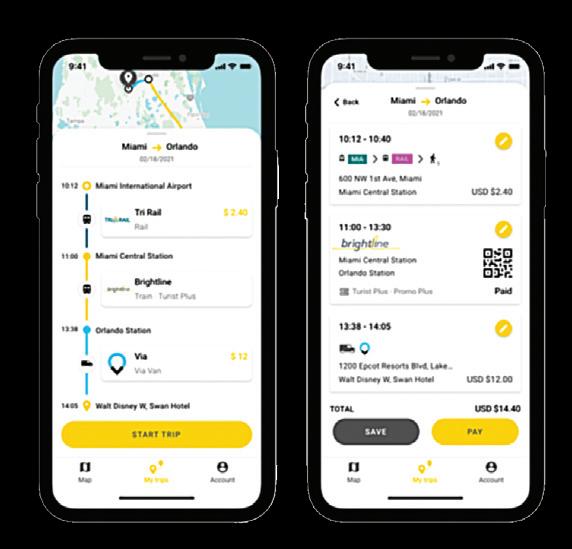
Iomob, which is short for ‘Internet of Mobility’, said the platform is the result of more than three years of research and several pilots.
The UK and Spain-based company says it wants to connect up journeys involving public transport, taxis, parking and micromobility services.
The Iomob platform will be integrated into existing transport and mobility websites and apps all over the world, allowing providers to include third-party mobility connections, enabling passengers to book and pay for a door-to-door journey
involving multiple modes of transport.
“All over the world, people are the victims of disjointed journeys through a failure to link transport networks and modes of transport, which results in a negative passenger experience and unsurprisingly, many private car trips,” said Adrian Ulisse, managing director UK, Iomob.
“Iomob’s disruptor technology is designed to ‘supercharge’ existing transport and mobility apps around the world, providing greater access to sustainable travel options and for the first time, a seamless travel experience for people everywhere.”
The platform is intended to act as a pass to more than: 7,000 taxi fleets; 10,000 car parks; 1,800 public transit feeds; and micromobility services in more than 270 cities. Iomob is currently building partnerships across the travel sector in the UK, USA and Europe. The company says it has integrated with companies such as Bolt, CMAC, VOI, Hub Parking, Tier, Q-Park, Human Forest, Lime, Dott, Nextbike, Spin, Beryl, Parkimeter, Karhoo and Santander Cycles.
Forestry and Land Scotland is now offering RingGo cashless parking services in 45 locations, with a five-year partnership launched on 1 November.
RingGo has updated its cashless parking service to give drivers more flexibility when it comes to managing and paying
for parking. Recognising that some rural locations where phone signal can be challenging, RingGo LatePay will also be introduced at some locations.
The service gives motorists struggling to receive phone signal the ability to pay for
their stay up to 72 hours after starting parking.
Forestry and Land Scotland is responsible for managing and promoting Scotland’s national forest estate: land, predominantly covered in forest, owned by the Scottish Government.
UK pensioners are often depicted in the media as lacking technology literacy, missing out on the skills to use mobile devices. In a world where technology adoption is accelerating, it can seem like the elderly are left behind in the changing times.
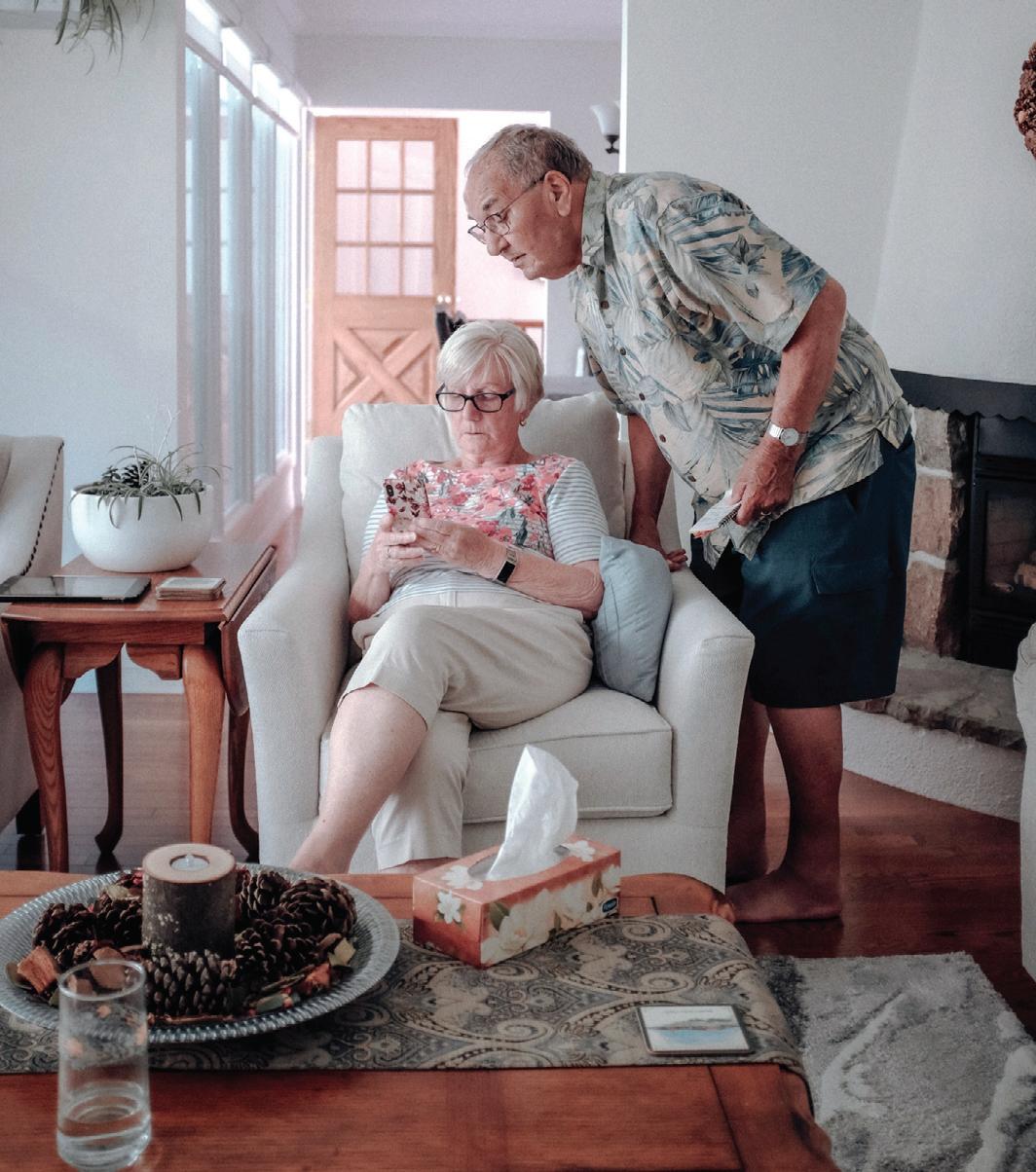
However, research from OnePoll, commissioned by parking payment provider RingGo, suggests the opposite. Seniors value technology, specifically smartphones, with many stating they have become a critical part of their lives.
Key findings:
• Almost half (45%) have been patronised by younger generations for their ability to use smartphones
• 20% have had a smartphone for over 10 years
• 9 in 10 (86%) UK pensioners believe smartphones make their lives significantly better
• Only 9% would rate their ability to use a smartphone as bad.
Nine in 10 (86%) people over the age of 65 rate their ability to use their smartphone as good (60%) or very good (26%), according to new research from OnePoll.
Despite their common portrayal as Luddites, a fifth of people of pensionable age have had a smartphone for over 10 years, and only 9% of all users would rate their ability to use a smartphone as bad. Indeed, six in 10 say a smartphone has made their lives easier and almost a third (26%) a lot easier. Only 3% say the invention of smartphones has been a negative influence on their lives. This stands in
clear opposition to many reports that seniors are unable or unwilling to use the technology.
The research also homed in on a key benefit to older generations, namely mobility. One in 10 (9%) seniors have found that smartphones made travel possible, while almost half (45%) stated they made journeys easier. Only 5% report smartphones making travel harder.
The age group’s frustrations
Parking payments are getting more complicated. A previously slow-moving industry is facing an unprecedented change. For example, many parking spaces now offer EV charging – that often means combining parking and charging payments, provided by two different organisations.
Parking providers are also spying opportunities to improve user experience and generate revenue by selling other services, such as booking local attraction tickets through terminals, or paying for multi-modal journeys, parking, trains or cycle hire.
In all cases, the user wants a single transaction. But the provider needs to manage multi-party payments. There are a couple of ways to do this. One is top-down integration of multiple parties into existing backend IT systems. The other is bottom-up, embracing digital technologies to address specific problems.
We have seen this latter approach to a
degree with parking apps. But these have generally been complete services that are outsourced to the app company. There are also less acknowledged ‘middleware’ apps, that can take complexity out of the system, without parking operators losing control of the data or the payment. For example, our own technology handles multi-party transactions in our cloud. This technology
KEITH TANNER/UNSPLASHwere made clear. Almost twothirds (64%) believed their depiction in media was either negative or ambivalent, while almost half (45%) have been made to feel frustrated (37%), silly (29%) or angry (27%) by younger people patronising their ability to use their phone.
Peter O’Driscoll, managing director of RingGo, said: “Seniors were the early adopters of our phone parking service when it began some 15 years ago. This trend has continued, with this group continuing to invest in technology both with time and money. Perhaps it’s time we rethink our assumptions about the elderly.
“Large sections of the population need to rethink their preconceptions about seniors. Rather than assuming they are against or fearful of technology, we must understand their needs and provide appropriate support.
“Of those surveyed 51% would like help setting up apps on their smartphone from a family member or professional, while 37% would benefit from having fewer applications. With a change in mindset and more flexible services, we can provide greater digital accessibility for everyone.”

The research was conducted by OnePoll in September 2022 and surveyed 1,000 UK citizens over the age of 64.
was spun out of a project for Flowbird Smart City UK, and highlighted in the 2022 Parkex Innovation Trail.
So in the case of parking and charging, the respective companies sign up, and set their payment terms behind the scenes. The user has one transparent transaction to pay for everything, which can be done via existing payment terminals or apps. Whatever they choose, we manage the integrations and split the payment between both companies.
Reliable backend systems for parking are important. But large legacy IT systems are often cumbersome and slow to update, which is a challenge in a world where customer demands are changing rapidly.
Innovative cloud-based startups, like ours and many others, can outsource the complexity in the middle. This allows parking operators to experiment rapidly with new models, without major IT upgrades but also without making long-term commitments that put the relationship with the end customer in someone else’s hands.
James O’Neill is chief executive officer at Paythru
YOUR GUIDE TO CONSTRUCTION, CONSULTANCY, PARKING SYSTEMS, TECHNOLOGY AND RECRUITMENT SERVICES
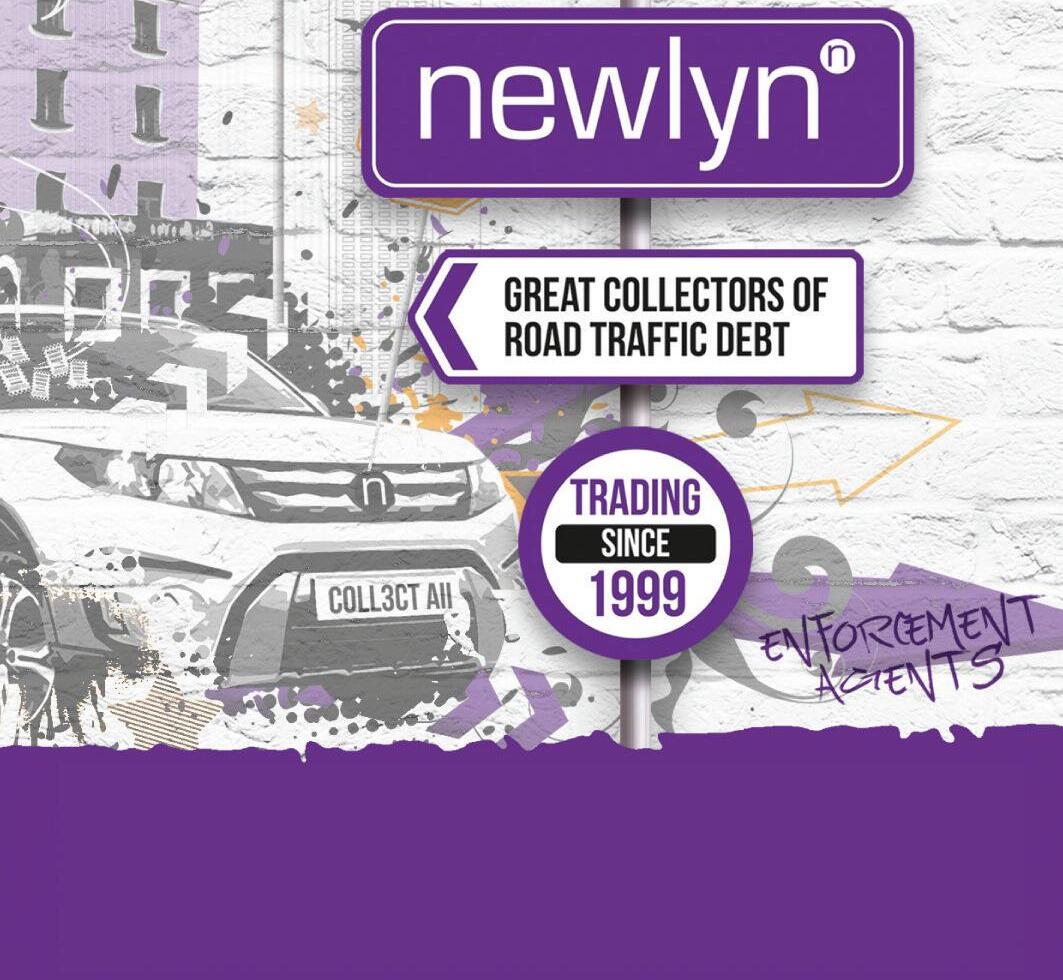
The Leading Independent Consultancy for all your parking solu琀ons
Established in 1991, with over 230 sa琀s昀ed customers comprising both public and private sector (including Local Authority and Health and Educa琀on establishments). Quality parking solu琀ons provided by our experienced in house specialists:
GIS mapping and surveying
• MTO site surveys and digi琀sing.
• On street TRO signs and lines: legality and condi琀on surveys (sample surveys also available).
• GIS mapping of TRO surveys, produc琀on of digital maps and TRO management for Order wri琀ng, upda琀ng and consolida琀on.
• Data extrac琀on and conversion of text based schedules to digi琀sed map based solu琀ons.
• Length of stay, usage, and occupancy parking surveys, both on and o昀 street.

• Compliance surveys and data analysis.
• Surveying and mapping of infrastructure assets.
Consultancy services
• Financial appraisal and e�ciency reviews of parking service provision.



• Collabora琀ve working – joint no琀ce processing and shared enforcement.
• On and O昀 street tra�c regula琀on order wri琀ng.
• DPE and CPE feasibility studies and implementa琀on.
• Tari昀 reviews.
• DPE/CPE services speci昀ca琀on wri琀ng and tender evalua琀on.

Contact: Peter Lowe B.Eng., C.Eng., M.I.C.E., FBPA Tel: 01492585055 or 07900264137
Email: plowe@rtaassociates.co.uk
RTA Associates Ltd www.rtaassociates.co.uk
For more information on our services, please contact:























